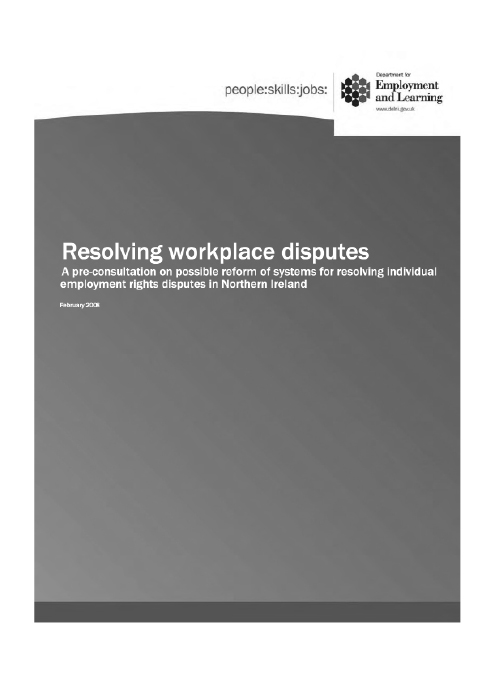Report on the Review of Workplace Dispute Resolution
Committee: Employment and Learning
Session: 2008/2009
Date: 24 June 2009
Reference: NIA 45/08/09R
ISBN: 978-0-339-60285-4
Session 2008/2009
Third Report
COMMITTEE FOR EMPLOYMENT AND LEARNING
Report on the
Review of Workplace
Dispute Resolution
Together with the Minutes of Proceedings of the committee
relating to the report and the minutes of evidence
Ordered by the Committee for Employment and Learning to be printed 24 June 2009
Report: 45/08/09R (Committee for Employment and Learning)
This document is available in a range of alternative formats.
For more information please contact the
Northern Ireland Assembly, Printed Paper Office,
Parliament Buildings, Stormont, Belfast, BT4 3XX
Tel: 028 9052 1078
Membership of Powers
The Committee for Employment and Learning is a Statutory Departmental Committee of the Northern Ireland Assembly established in accordance with paragraphs 8 and 9 of Strand One of the Belfast Agreement and under Standing Order 46 of the Northern Ireland Assembly. The Committee has a scrutiny, policy development and consultation role with respect to the Department for Employment and Learning and has a role in the initiation of legislation.
The Committee has power to:
- consider and advise on Departmental budgets and annual plans in the context of the overall budget allocation;
- approve relevant secondary legislation and take the Committee stage of relevant primary legislation;
- call for persons and papers;
- initiate inquiries and make reports; and
- consider and advise on matters brought to the Committee by the Minister for Employment and Learning.
The Committee is appointed at the start of every Assembly, and has power to send for persons and papers and records that are relevant to its inquiries.
The Committee has 11 members, including a Chairperson and Deputy Chairperson, and a quorum of 5. The membership of the Committee since 9 May 2007 has been as follows:
Ms Sue Ramsey (Chairperson)
Mr Robin Newton * (Deputy Chairperson)
Mr Alex Attwood Mr Paul Butler
Rev Dr Robert Coulter ** Mr Alex Easton ***
Mr David Hilditch *** Mr William Irwin ***
Ms Anna Lo Mr David McClarty
Mrs Claire McGill
Mr Alastair Ross replaced Mr Jim Wells on 29 May 2007
* Mr Robin Newton replaced Mr Jimmy Spratt as Deputy Chairperson on 10th June 2008
** Rev Dr Robert Coulter replaced Mr Basil McCrea on 15 September 2008
*** Mr Alex Easton, Mr David Hilditch and Mr William Irwin replaced Mr Nelson McCausland, Mr Alastair Ross and Mr Jimmy Spratt on 15 September 2008
Table of Contents
List of abbreviations used in the report
Report
Appendix 1:
Minutes of Proceedings relating to the report
Appendix 2:
Appendix 3:
Written Evidence Submitted by Witnesses
Appendix 4:
Appendix 5:
Appendix 6:
Appendix 7:
List of Abbreviations used in the Report
ADR - Alternative Dispute Resolution
BERR - Department for Business, Enterprise and Regulatory Reform
CBI - Confederation of British Industry
DEL - The Department for Employment and Learning
ECNI - Equality Commission for Northern Ireland
FSB - Federation of Small Businesses
HR - Human Resources
LRA - Labour Relations Agency
NIC-ICTU - Northern Ireland Committee, Irish Congress of Trade Unions
NIAO - Northern Ireland Audit Office
OITFET - Office of the Industrial Tribunals and the Fair Employment Tribunal
SME - Small and Medium Enterprise
‘the Committee’ - Committee for Employment and Learning
‘the Department’ - Department for Employment and Learning
‘the Minister’ - Minister for Employment and Learning
‘the Gibbons Review’ - “Better Dispute Resolution - A review of employment dispute resolution in Great Britain"
Executive Summary
The Department for Employment and Learning (‘the Department’), in February 2008, undertook a policy review of statutory employment dispute resolution procedures prompted by stakeholder concerns of the existing arrangements and by the findings of the Gibbons Review – “Better Dispute Resolution - A review of employment dispute resolution in Great Britain" – published in March 2007.
In May 2008 Sir Reg Empey, Minister for Employment and Learning (‘the Minister’), agreed to the establishment of a steering group tasked with assisting in the development and oversight of meaningful public consultation on key issues around the resolution of employment disputes. In October 2008 the Department published its report on the findings of the pre-consultation.
The Committee for Employment and Learning (“the Committee") welcomes the opportunity to progress this extremely important and necessary policy area in conjunction with the Department, both pre- and post-consultation, and feels that a coordinated approach to addressing the issues will best serve the needs of employers and employees alike.
The objective of the Committee’s review is therefore:
“To collate and consider the opinions and views of relevant stakeholder organisations on a way forward for workplace dispute resolution in Northern Ireland".
In meeting this objective, the Committee received briefings from Departmental officials and also took evidence from a range of key stakeholders.
Based on the evidence received, and taking on board the views of Members, the Committee feels that there is a need to develop and promote a culture of early dispute resolution as opposed to seeking legal redress through the tribunal system as the most appropriate approach.
The Committee agreed that there is a need to reform the current statutory procedures, but would emphasise the importance of ensuring that the revised system is properly thought through and represents a synergy of the best of the current system with the best of the options for change, to develop a system that meets our needs for resolving workplace disputes while allowing greater access to justice and improved efficiency. The new system should ensure the protecting of the rights of individuals and employers, and their access to justice.
The Committee agreed fully with those who gave evidence that Alternative Dispute Resolution (ADR) should be promoted as the most appropriate alternative to tribunals in order to protect the privacy of those involved and so ensure the pursuit of a faster, flexible and more cost effective means of settling a grievance, especially given the current economic climate.
The Committee agreed with a number of witnesses who stated that the role of the Labour Relations Agency (LRA) should be extended to cover a wider range of advice and ADR services and that there is a need for the refocusing the LRA’s resources in order to provide such extended services.
The Committee also agreed with those witnesses who identified the importance of the tribunal system, but also took on board the concerns that employers and employees have around that system.
The Committee feels that there is a need to ensure that dispute resolution is made simpler and less bureaucratic for both employer and employee and that a revised system does not simply replace one set of complex and confusing rules and regulations with another that are not user-friendly.
The Committee strongly believes that the provision of more accessible information and the promotion of a clearer understanding of employer and employee rights and obligations, by all those involved, are key to the success of any revised system. Lack of accurate information and clear instructions for those participating in the current structures was a recurring theme raised by all of those who gave evidence and this is an issue that needs to be addressed in order for the revised system to be meaningful.
The Committee is of the opinion that the public sector plays an extremely important role in the process, firstly, by ensuring that it leads the way in developing best practice models and, secondly, by leading by example through implementing these models.
Introduction
Background
1. The Department, in February 2008, began a policy review of statutory employment dispute resolution procedures. The review was prompted by stakeholder concerns surrounding the existing arrangements and by the findings of the Gibbons Review. This review, commissioned by the Department of Trade and Industry (renamed the Department for Business, Enterprise and Regulatory Reform or ‘BERR’ and now the Department for Business, Innovation and Skills), was published in March 2007 and entitled “Better Dispute Resolution - A review of employment dispute resolution in Great Britain". The report can be accessed at http://www.berr.gov.uk/files/file38516.pdf.
2. The purpose of the Department’s pre-consultation stage of its review was:4.
- To determine whether there is appetite for reform of dispute resolution procedures in NI;
- To gain an initial steer on the appropriateness locally of the proposals contained in the Gibbons Review; and
- To invite suggestions of other options which might be worth investigating. Stakeholders were asked to consider whether there are lessons to be learned from dispute resolution best practice elsewhere in the world.•
3. In May 2008 Sir Reg Empey, Minister for Employment and Learning (‘the Minister’), agreed to the establishment of a steering group tasked with assisting in the development and oversight of meaningful public consultation on key issues around the resolution of employment disputes. In October 2008 the Department published its report on the findings of the pre-consultation.
4. In November 2008, Departmental officials briefed the Committee on the rationale behind the pre-consultation exercise and also on the findings of that exercise. This briefing to the Committee prompted its own review of Workplace Dispute Resolution with an aim of reporting its views to the Department in advance of the Department completing its public consultation.
5. The Committee welcomes the opportunity to progress this extremely important and necessary policy area in conjunction with the Department, both pre- and post-consultation, and feels that a coordinated approach to addressing the issues will best serve the needs of employers and employees alike.
Review Objective
6. The objective of the Committee’s review is:
“To collate and consider the opinions and views of relevant stakeholder organisations on a way forward for workplace dispute resolution in Northern Ireland".
7. In meeting this objective, the Committee received briefings from Departmental officials and also took evidence from a range of key stakeholders.
The Committee Approach
8. A methodology based on evidence gathering (oral and written) was used as the basis for the Committee’s review programme. Written and oral evidence was gathered from:
- The Department;
- Labour Relations Agency (LRA);
- Federation of Small Businesses (FSB);
- Equality Commission for Northern Ireland (ECNI);
- Confederation of British Industry (CBI);
- Northern Ireland Committee, Irish Congress of Trade Unions (NIC-ICTU); and
- Law Centre (NI).•
9. All of these organisations, with the exception of Law Centre (NI), are represented on the Department’s consultation steering group.
10. Submissions received and minutes of evidence are annexed to this report.
Consideration of evidence
11. From the outset of the Committee’s review it was made clear that the Minister and his Department did not have a preferred model for dispute resolution and that the Department’s consultation provides the opportunity to develop a bespoke local system of workplace dispute resolution, if deemed appropriate. It was also made clear that the findings of the Gibbons Review may not necessarily fit the needs of local employers and employees, especially given our high percentage of Small and Medium Enterprises (SMEs) and also the high degree of reliance on the public sector compared to elsewhere in the UK and Ireland.
12. During the evidence gathering process, the Committee was made aware of a number of issues of concern emerging from the majority of evidence put forward.
The need to promote a culture of early dispute resolution
13. The need for a change in how employees raise grievances and how employers deal with complaints was identified by the majority of those who gave evidence to the Committee. All too often the automatic approach is to seek legal remedy. This approach almost always escalates the problem to the point where any attempts at resolution is impossible.
14. There is a much greater tendency here to pursue litigation than elsewhere and there is also a greater tendency to link employment related issues with discrimination. The Committee would agree that this mindset needs to be changed.
15. The Department’s pre-consultation identified differing views on the need for a system focused on the promotion of employment relations as opposed to a rights-based system, which gives employers ready access to the legal system. It was agreed that such systems are not necessarily mutually exclusive.
16. A number of witnesses, and in particular the FSB, pointed out that in cases where a dispute is not dealt with prior to tribunal the costs incurred can cause the company to go out of business, especially if compensation must be paid. This is a situation that must be avoided at all costs and the Committee agreed with witnesses that alternatives to such terminal effects need to be established and encouraged.
17. Bearing these points in mind, and taking account of the cost implications and the stress involved in pursuing legal remedy, the Committee would strongly agree that there needs to be a cultural change towards a position where individuals and employers see the courts as the last resort and not the first course of action when a dispute arises. The benefits of tackling a problem, if possible, as close to its point of origin in the workplace needs to be promoted. Alternative options need to be put in place and employees and employers need to be made aware of their existence and of the assistance that is available to help resolve a dispute before there is any thought of legal action.
The need to retain, modify or repeal the statutory procedures
18. The current statutory procedures were introduced in England, Scotland and Wales in 2004, and in Northern Ireland in 2005. In 2006 a review of these procedures, The Gibbons Review, began; the review, which recommended the repeal of the procedures, did not cover Northern Ireland. The review also recommended the introduction of an Employment Bill, which was granted Royal Assent on 13th November 2008.
19. The Committee welcomed the Department’s approach whereby, although the Act repeals the statutory procedures in England, the consultation will seek the views of respondents as to whether the procedures here should also be repealed. The CBI expressed the view that, unless there were obvious benefits to the economy of acting otherwise, then we should follow the employment legislation that is brought forward in England. This is an issue that will perhaps be developed further in the Department’s consultation, but the Committee is of the opinion that the most appropriate system should be developed, and if this is in keeping with proposals in England then it would be appropriate to follow that legislation; however, it should not be adopted as an easy alternative to bringing forward legislation locally.
20. A number of witnesses highlighted that, although some feel that the “three-step procedure" which an employer must currently pursue with an employee in order to dismiss that employee should remain, the majority feel that it should cease. Currently an employer must first notify the employee in writing of the intended dismissal. Secondly, the employee can then ask for a meeting about the dismissal, and, thirdly, the employee can appeal, and a meeting must be held.
21. The Law Centre (NI) is in favour of retaining the statutory three-step procedure for disciplining and dismissing staff as they feel that it is simple and well understood by the majority of employers. NIC-ICTU reiterated this point in its evidence to the Committee. The Law Centre (NI) feels that removing the three-step procedure might lead to uncertainty and has the potential of cases for unfair dismissal being brought before the courts that would not otherwise have been brought. The FSB and the CBI expressed their desire to see this procedure repealed. The CBI, among others, is of the view that the procedure is too formal and that it often exacerbates problems that might well be better dealt with informally. Law Centre (NI) felt that the statutory dispute resolution procedures need to be reviewed. They are of the belief that the statutory grievance procedures are complex and confusing and should be removed. NIC-ICTU also felt that the grievance procedures are of a level of complexity that means people automatically have to seek legal assistance. The Committee would agree with this opinion.
22. Pay-related disputes are often a cause for disagreement between employer and employee and the Committee feels that, bearing in mind the apparent need to revise the procedures, there needs to be a mechanism put in place for the resolution of pay-related disputes. The LRA identified a need to reform how bulk or multi-cases, such as equal pay claims, are handled. Their approach to dealing with such cases on a pre-claim basis is to be welcomed, thus avoiding the hugely expensive, resource intensive and time consuming problems that these types of cases cause.
23. The Equality Commission emphasised the importance of ensuring that any reform must ensure that an individual’s rights under anti-discrimination legislation are not infringed and that a revised system must not limit or deny access to justice. The Committee would concur with this view but would emphasise that this should also extend to the employer. Law Centre (NI) put forward the view that, in reforming the system, the issue of access to rights of the individual should be kept to the forefront. Again, the Committee is in agreement with this opinion but it should also extend to the employer. The Committee would strongly agree with the view of Law Centre (NI) that this is an important opportunity to reform the system and that it should amalgamate the best of the current system with the best of the changes in England to develop a system that meets our needs for resolving employment rights disputes and allows greater access to justice while improving the efficiency of the system.
The role of Alternative Dispute Resolution (ADR) Techniques
24. It was apparent to all who responded to the Gibbons Review and to the Department’s pre-consultation that employment law needs to be simplified. However, simplifying the law can be an arduous process. The promotion of early dispute resolution practices, without the need to get involved in employment law, is seen as a more appropriate alternative.
25. In any dispute, the privacy of the individual involved is often of utmost importance and the Equality Commission identified the importance of ADR from this perspective. Not everyone wants a dispute to become public. Private resolution is extremely important to many but the outcome must be meaningful to all parties concerned. The Committee would agree with this statement.
26. An opinion that was shared by the witnesses who gave evidence to the Committee, and with which the Committee agrees, is that ADR is now a more pressing issue given the current economic climate whereby employers and employees alike require a faster, less expensive, alternative to the tribunal system.
27. ADR is a more flexible option than tribunals and it can often be used to reach an outcome that is acceptable to all involved and that helps to preserve the employment relationship. Tribunal is rigid and usually results in either, or all, parties being left dissatisfied. The CBI also believes that resolving a dispute in the workplace promotes good employee relations and it believes that procedures to deal with disputes should be fair and consistent. NIC-ICTU pointed out that the current system has no means by which to repair working relationships. The Committee feels that preservation of the working relationship should be encouraged.
28. Law Centre (NI) strongly supports the exploration of ADR options for certain employment disputes, but is of the view that ADR might not be appropriate for all disputes, for example, when an employer is considering dismissal of an employee.
Early neutral evaluation
29. Law Centre (NI) discussed the possible use of early neutral evaluation as a type of ADR that assists in the identification of claims that do not have merit or a defence. This form of ADR could either resolve the issue or help to identify an alternative means by which to resolve it.
Mediation
30. There needs to be a move towards the involvement of independent mediation, at an early stage, to try to resolve a situation before it has the opportunity to move to the stage of legal redress. Such an approach of independent mediation helps to remove doubts that an employee might have in the independence or objectivity of their employer’s internal processes. Concerns were raised that mediation is not regulated and it was agreed that this should be the case. Law Centre (NI) put forward the idea that pilot schemes should be put in place to ascertain the most appropriate form that mediation should take and how it should be run. The Committee would see this as a sensible approach. It was suggested by the LRA that in-house mediation services should be provided by the public sector, and also by larger companies in the private sector. The issue of mediation provision in the SME sector was also raised as an issue that needs to be addressed.
Arbitration
31. Law Centre (NI) sees arbitration as the final form of ADR and as an alternative to tribunal and feels that it should be considered separately from other types of ADR, such as mediation and early neutral evaluation. The LRA currently offers arbitration but this is very limited and rarely used, it can only be used for claims of unfair-dismissal and flexible-working claims. This needs to be made less rigid and needs to be promoted as a quicker, informal alternative to tribunal.
Rights Commissioners
32. NIC-ICTU, in evidence to the Committee, were highly supportive of the Rights Commissioner system that operates in the Republic of Ireland as they feel that it is voluntary, non-adversarial, faster, easily accessible and non-legalistic in its approach; they feel that it should be the first option if a dispute arises. They would argue that a Rights Commissioner system (under the auspices of the LRA), followed by conciliation through the LRA, and finally an appeals mechanism to the industrial court or employment appeals tribunal should be the appropriate route to address a dispute.
33. Rights Commissioners, according to the CBI, might not be beneficial on account of the hasty informal nature of the hearings. They also feel that some cases come before the Rights Commissioner that would be more appropriately dealt with administratively. They would also have criticisms of the lack of power held by the commissioner to dismiss a case in the event of the claimant not attending, the process in the Republic of Ireland is for the case to be automatically referred to the Labour Court; the CBI feels that this is a waste of the commissioner’s time and that it is a flaw in the system.
34. The Committee would be of the opinion that if such a system were to be considered then, after further investigation and evaluation of the Republic of Ireland system, it should be developed and rigorously tested to ensure that it best meets the needs of all of those involved in the process.
The role of the Labour Relations Agency (LRA)
35. The LRA is the primary deliverer of a range of ADR techniques aimed at early workplace dispute resolution but, as mentioned earlier, this is not often used. Law Centre (NI) commended the LRA on the conciliation service that it offers and they would wish to see, firstly, an expansion in the use of conciliation prior to submitting claims and, secondly, the raising of awareness of the potential of using conciliation at the pre-claim stage. In evidence to the Committee, the LRA felt that the requirement when a tribunal case is lodged to only offer conciliation for up to 7, and on occasion 13, weeks should be reviewed or possibly removed thereby allowing attempts to resolve the problem right up to the time of the tribunal. The Committee agrees with this approach.
The role of employment-related tribunals
The need to retain the tribunal system
36. Law Centre (NI) rightly pointed out that there needs to be access to justice in order to enforce legal rights before an impartial tribunal or court. The CBI and the Equality Commission believe that access to the tribunal system is also necessary to address legitimate claims that cannot otherwise be adequately resolved. The Equality Commission identified the significant impact that tribunals have had in the development of case law. Most consultees to the Department’s pre-consultation, and most witnesses who gave evidence, recognised the need for the tribunal system but as a last resort. The Committee were in agreement with these views.
Concerns raised by witnesses and consultees
37. It cannot be argued that the formal tribunal process is there as a mechanism to protect employers and employees alike but it can often act as a deterrent instead of providing the protection that is its aim. A range of issues were raised as reasons for claims not progressing to tribunal or for their not being appropriately dealt with when they reach the tribunal stage.
- Lack of Advice
Law Centre (NI) identified the basic problem with the system as being, in their opinion, the lack of advice and they would welcome the expansion of the provision of impartial advice, such as that provided by the LRA.
The forms that need to be completed in relation to tribunals need to be simplified; appropriate guidance should also be developed to assist in completion of the relevant paperwork. Guidance on grievance and discipline procedures should also be provided.
- Cost and anxiety
The attendance before a tribunal, and the cross examination by lawyers, often deters individuals from pursuing their grievances and they feel that the final result is not worth the stress involved.
Attendance can also take a great deal of time as cases might not start when scheduled and the actual hearings can last for a number of days. Many small employers and individuals simply cannot make themselves available for prolonged periods; this is also a deterrent to the system.
The process can be extremely costly and this is seen as a deterrent for many to pursuing genuine grievances. Legal Aid is not available to take claims to industrial tribunal and there is a lack of any tribunal representation service. Unless an individual has the backing of a trade union, or can manage to avail of the limited assistance available from the Equality Commission (for discrimination cases only) or the Law Centre (NI), then they have very little access to directed legal assistance.
The cost of the hearing itself is also a major barrier given that, irrespective of the result, claimants who engage a solicitor might still have to meet their own legal costs, which can often be more than the case is worth. More funding to organisations, such as the Law Centre, to provide advice would mean a move towards genuine cases actually proceeding to tribunal, if felt that pursuit was worthwhile, and would also assist in identifying cases that are without merit or defence.
- Perception of the system
Perception of the tribunal system is an issue for employers. The FSB expressed the need for small businesses to see the legal system as being neutral and not on the side of the employee.
- Fairness
The FSB expressed the need for small businesses to be treated fairly by tribunals, particularly in relation to them possibly not following model practices as a result of their not being aware of them, or being able to access them. This has resulted in many cases being dismissed on technical grounds. Conversely, Law Centre (NI) feels that it is the employee that is disadvantaged by the tribunal system. The CBI and NIC-ICTU also raised concerns, similar to the FSB and Law Centre (NI), regarding the ability of the tribunal system to treat employers and employees unfairly as a result of technicalities regarding model practices. All, however, agree that the system is too legalistic, complex and expensive and should not necessarily be viewed as the most appropriate way to resolve issues. The Committee also agreed with this view and felt that inexperience and lack of legal understanding should be taken into account by the court.
Improving the tribunal system
38. The Committee agreed that there is a need to promote the work of the LRA with regard to pre-lodging of tribunal proceedings. It also agreed that a more joined-up approach is needed between the LRA and the Office of Industrial Tribunals and the Fair Employment Tribunal (OITFET) although some concern was raised around any suggestion that industrial tribunal and fair employment tribunal should be merged. The Equality Commission discussed actions by the President of OITFET to reduce the time taken from case lodgement to hearing and this is to be welcomed.
39. The LRA identified the fact that a high proportion, 80%, of tribunal proceedings lodged are resolved prior to hearing. This figure is encouraging but more is required to firstly reduce the actual number of claims lodged and secondly to increase the percentage that are addressed prior to hearing.
40. It was suggested by a number of witnesses that tribunals should have sufficient powers to deal with weak or vexatious claims; this is a sensible approach but caution needs to be exercised as the definitions of weak or vexatious may be open to interpretation. The experience of the Law Centre (NI) is that vexatious cases should not be a driver of policy as the number of such cases is very small, they believe that the need for proper legal representation is a more appropriate driver of policy. The Committee would be in agreement with this view.
41. The LRA identified the need to encourage tribunals to play an active role in early case management. It also identified the need for the simplification of employment law.
Issues surrounding employment regulations
42. A number of witnesses felt that the procedures introduced in 2005 have reduced the possibility of early resolution and grievances now seem to be formalised at a much earlier stage than prior to their introduction.
43. The Committee felt that there is a need to reduce the amount of government red tape and bureaucracy that surrounds employment regulations and the dispute resolution processes. It was discussed as to how complex and legalistic the current system is and it was agreed that there is a need to simplify this to make it easier to understand for employers and employees. Many SMEs are reluctant to employ staff on account of the burden of excessive regulations and bureaucracy and by their lack of confidence when dealing with employment law. This reluctance has a knock-on effect on the local economy.
44. The FSB pointed out that a ‘one-size-fits-all’ approach to dispute resolution is not the best way forward for local businesses: SMEs are not equipped in the same way as larger companies and the public sector to resolve disputes. That said, the size and resources available to a company should not be a deciding factor as to how best to resolve an issue. NIC-ICTU pointed out that any system should be equitable, irrespective of the size of the company, and should not discriminate against small companies that do not have the same Human Resources (HR) expertise or financial backing as larger companies and the public sector. The Committee would strongly agree with this opinion.
45. All too often employers, especially small employers, are raising concerns over the complicated laborious process of meeting their obligations under ever-changing employment regulations. The Committee felt that good practice models and guides need to be developed to assist employers in meeting their obligations to employees as laid down in employment regulations.
46. The LRA currently provides a service to small companies whereby they assess the company’s disciplinary and grievance procedures and advise on changes or improvements. This is expensive in terms of staff resources but additional funding could help to improve this service. They also host a range of workshops and seminars aimed at SMEs to address changes or improvements to their procedures. This is seen to work well, feedback received is extremely positive and the Committee would hope that these will continue. The refocusing of the LRA’s resources to promote theses initiatives would go some way to address shortcomings that small businesses have in relation to meeting their obligations.
Lack of Information
47. The Committee agrees with the Department’s suggestion that a “handbook" for employers that addresses basic employment rights should be developed, in conjunction with appropriate stakeholders such as the FSB. The FSB agreed with this suggestion and felt that it could be promoted as a benefit to employers and employees, as opposed to another form of regulation. Law Centre (NI) currently provides an “encyclopaedia of rights" and they also host a range of training events. The Equality Commission provides written advice and guidance in the form of a “Model Equal Opportunities Policy" and a “Unified Guide for Employers". The FSB also suggested the need for clear and comprehensive advice that is available through the Internet. A code of practice, rather than regulations, would be beneficial if cases are taken to a formal level.
48. Given that a number of organisations already provide information in various forms, the Committee would agree with the Department that a coordinated inter-agency approach is needed to information provision to ensure that information is accurate and easily accessible and feels that it is necessary to collate all of the appropriate information in a single publication that is readily available to employers and employees in a range of formats and languages. An extension of the current remit of the LRA would allow for this to be provided as a “one stop shop".
49. An enquiry / helpline service would also be extremely beneficial whereby employees and employers could seek professional advice on their rights and responsibilities. The LRA currently provide such a service but it is extremely resource intensive and expensive. There would need to be increased financing and additional staff assigned to the service in order to reduce the high percentage of missed calls that could well result in callers making an uninformed decision as to how to progress. The Law Centre (NI) also provides an advice helpline, aimed primarily at employees, as does the Equality Commission, aimed at employers. The CBI emphasised the good work that the LRA currently carries out through its advice helpline but pointed out the need for the refocusing of resources to ensure that the service can be utilised to its full potential. Again, an extension of the current remit of the LRA would allow for this to be provided as a “one stop shop".
The role of the public sector
50. As Central Government are responsible for the introduction of employment related legislation, the Committee agreed with a number of witnesses that it is imperative that the public sector plays its part in the development and application of best practice models of dispute resolution and should lead by example. This should not be limited to Government Departments but should also extend to agencies and arms-length bodies that come under the public sector umbrella.
51. As mentioned earlier, employers have raised concerns over the complicated laborious process of meeting their obligations under ever-changing employment regulations and the Committee feels that good practice models and guides need to be developed to assist employers in meeting their obligations to employees. In developing such models the Department suggested that an accreditation system could be developed that includes benefits for accredited employers. The Committee welcomes this approach by the Department to develop modular accredited training in ADR and would support the development of such a programme.
52. Concerns were raised about the alleged automatic approach of public authorities and bodies to follow the option of court proceedings rather than attempts at resolution on account of the fact that an employee will run out of time, money and patience. Such an approach places the employee at a disadvantage to the employer. The LRA felt that this was not necessarily their experience and felt that it should be born in mind that public sector organisations vary in their approach to dispute resolution. It has already been said that public sector organisations should lead be example and a consistent approach, based on best practice, across all organisations would be welcomed. NIC-ICTU pointed out that this approach is not limited to the public sector but also extends to the private sector.
53. The CBI pointed out the ever-present awareness of public bodies to the implications of not following procedures and the scrutiny that they may undergo from the Northern Ireland Audit Office (NIAO). NIC-ICTU pointed out that the tribunal is considered to be a means to justify, to the NIAO, the paying out of money.
Conclusions
54. Based on the evidence received, and taking on board the views of Members, the Committee would be in agreement with witnesses that there is a need to develop and promote a culture of early dispute resolution as opposed to seeking legal redress through the tribunal system as the most appropriate approach. Much work will be needed to change this current mindset.
55. The Committee agreed that there is a need to reform the current statutory procedures, but would emphasise the importance of ensuring that the revised system is properly thought through and represents a synergy of the best of the current system with the best of the options for change, to develop a system that meets our needs for resolving workplace disputes while allowing greater access to justice and improved efficiency. The current three-step system should be repealed and a more appropriate system put in place that removes the apparent flaw that leads to earlier formalisation of complaints, as outlined by a number of witnesses. The new system should ensure the protection of the rights of individuals and employers, and their access to justice.
56. The Committee agreed fully with those who gave evidence that ADR should be promoted as the most appropriate alternative to tribunals in order to protect the privacy of those involved and so ensure the pursuit of a faster, flexible and more cost effective means of settling a grievance especially given the current economic climate. It was also agreed that a system should be put in place that identifies the most appropriate method of ADR on a case-by-case basis to ensure the best possible outcome.
57. The Committee saw the benefits, and heard the drawbacks, of implementing a Rights Commissioner system and feels that further investigation and evaluation is needed before such as system might be adopted.
58. The Committee agreed with a number of witnesses who stated that the role of the Labour Relations Agency should be extended to cover a wider range of advice and ADR services and that there is a need for the refocusing of the LRA’s resources in order to provide such extended services.
59. The Committee also agreed with those witnesses who identified the importance of the tribunal system, but also took on board the concerns that employers and employees have around that system.
60. Irrespective of what form the revised system takes, the Committee feels that there is a need to ensure that it makes dispute resolution simpler and less bureaucratic for both employer and employee and that it does not simply replace one set of complex and confusing rules and regulations with another that are not user-friendly.
61. The Committee strongly believes that the provision of more accessible information and the promotion of a clearer understanding of employer and employee rights and obligations by all those involved are key to the success of any revised system. Lack of accurate information and clear instructions for those participating in the current structures was a recurring theme raised by all of those who gave evidence and this is an issue that needs to be addressed in order for the revised system to be meaningful.
62. The Committee is of the opinion that the public sector plays an extremely important role in the process by, firstly, ensuring that it leads the way in developing best practice models and, secondly, by leading by example through implementing these models.
Appendix 1
Minutes of Proceedings Relating to the Report
Wednesday, 12th November 2008
Room 135, Parliament Buildings
Present: Ms Sue Ramsey MLA (Chairperson)
Mr Robin Newton MLA (Deputy Chairperson)
Mr Alex Attwood MLA
Mr Paul Butler MLA
Rev Dr Robert Coulter MLA
Mr David Hilditch MLA
Mr William Irwin MLA
Ms Anna Lo MLA
Mr David McClarty MLA
Mrs Claire McGill MLA
In Attendance: Mr Peter Hall (Assembly Clerk)
Mr Trevor Allen (Assistant Committee Clerk)
Mr Collan Cree (Clerical Supervisor)
Mr Richard Keating (Clerical Supervisor)
Ms Jessica Dougan (Clerical Officer)
Apologies: Mr Alex Easton MLA
The meeting opened at 10:33am in public session.
2. Departmental briefing on Alternative Dispute Resolution
The Committee received a briefing from Departmental Officials: June Ingram, Director of Strategy and Employment Relations Division, and Tom Evans, Head of Employment Relations Policy & Legislation Branch, on the Department’s review of methods for resolving disputes that arise in the workplace. The briefing was followed by a question and answer session.
The Chairperson adjourned the meeting at 12:27pm.
[EXTRACT]
Wednesday, 19th November 2008
Room 135, Parliament Buildings
Present: Ms Sue Ramsey MLA (Chairperson)
Mr Robin Newton MLA (Deputy Chairperson)
Mr Alex Attwood MLA
Mr Paul Butler MLA
Mr Alex Easton MLA
Mr David Hilditch MLA
Ms Anna Lo MLA
Mr David McClarty MLA
In Attendance: Mr Peter Hall (Assembly Clerk)
Mr Trevor Allen (Assistant Committee Clerk)
Mr Collan Cree (Clerical Supervisor)
Mr Richard Keating (Clerical Supervisor)
Ms Jessica Dougan (Clerical Officer)
Apologies: Rev Dr Robert Coulter MLA
Mr William Irwin MLA
Mrs Claire McGill MLA
The meeting opened at 10:32am in public session.
5. Matters Arising
Agreed: The Committee discussed its future work with respect to Alternative Dispute Resolution. Members also noted an initial research paper on this issue from the Assembly Research and Library Services. Members agreed that the Committee Clerk take the issue forward with Assembly Research Services.
Agreed: Members also agreed that representatives of the Departmental steering group be invited to brief the Committee.
Agreed: Members noted correspondence from the Labour Relations Agency, requesting the opportunity to brief the Committee on dispute resolution, and agreed that representatives be invited to brief the Committee on this issue.
The Chairperson adjourned the meeting at 11:55am.
[EXTRACT]
Wednesday, 14th January 2009
Stranmillis University College,
Stranmillis Road, Belfast
Present: Ms Sue Ramsey MLA (Chairperson)
Mr Robin Newton MLA (Deputy Chairperson)
Mr Alex Attwood MLA
Mr Paul Butler MLA
Rev Dr Robert Coulter MLA
Mr Alex Easton MLA
Mr David Hilditch MLA
Mr William Irwin MLA
Ms Anna Lo MLA
Mr David McClarty MLA
Mrs Claire McGill MLA
In Attendance: Mr Peter Hall (Assembly Clerk)
Mr Trevor Allen (Assistant Committee Clerk)
Mr Richard Keating (Clerical Supervisor)
Ms Jessica Dougan (Clerical Officer)
The meeting opened at 10:31am in public session.
2. Briefing from the Labour Relations Agency (LRA) on Workplace Dispute Resolution
The Committee received a briefing from representatives of the Labour Relations Agency (LRA): Jim McCusker, Chairman, Penny Holloway, Director of Conciliation and Arbitration, Roden Ward, Board Member, and Julie Anne Clarke, Board Member, on the Committee’s work on workplace dispute resolution. The briefing was followed by a question and answer session.
3. Briefing from the Federation of Small Businesses (FSB) on Workplace Dispute Resolution
The Committee received a briefing from representatives of the Federation of Small Businesses (FSB): John Friel, Regional Manager, Wilfred Mitchell OBE, Chairman of the NI Area Policy Unit, and Carolyn Brown, Policy Manager, on the Committee’s work on workplace dispute resolution. The briefing was followed by a question and answer session.
8. Any Other Business
Members noted a paper from Assembly Research and Library Services in relation to Alternative Dispute Resolution.
The Chairperson adjourned the meeting at 11:59am.
[EXTRACT]
Wednesday, 4th March 2009
Room 135, Parliament Buildings
Present: Ms Sue Ramsey MLA (Chairperson)
Mr Robin Newton MLA (Deputy Chairperson)
Mr Alex Attwood MLA
Mr Paul Butler MLA
Mr Alex Easton MLA
Mr David Hilditch MLA
Mr William Irwin MLA
Ms Anna Lo MLA
Mr David McClarty MLA
Mrs Claire McGill MLA
In Attendance: Mr Peter Hall (Assembly Clerk)
Mr Trevor Allen (Assistant Committee Clerk)
Mr Richard Keating (Clerical Supervisor)
Ms Jessica Dougan (Clerical Officer)
Apologies: Rev Dr Robert Coulter MLA
The meeting opened at 10:05am in public session.
3. Briefing from the Law Centre (NI) on Workplace Dispute Resolution
The Committee received a briefing from representatives of the Law Centre (NI): Mark Beal, Policy Officer, Daire Murphy, Employment Advisor, and Caroline Maguire, Employment Advisor, on the Committee’s work on workplace dispute resolution. The briefing was followed by a question and answer session.
The Chairperson adjourned the meeting at 1:02pm.
[EXTRACT]
Wednesday, 18th March 2009
South Eastern Regional College,
Bangor Campus
Present: Ms Sue Ramsey MLA (Chairperson)
Mr Robin Newton MLA (Deputy Chairperson)
Mr Alex Attwood MLA
Rev Dr Robert Coulter MLA
Mr Alex Easton MLA
Mr David Hilditch MLA
Ms Anna Lo MLA
Mr David McClarty MLA
Mrs Claire McGill MLA
In Attendance: Mr Peter Hall (Assembly Clerk)
Mr Trevor Allen (Assistant Committee Clerk)
Mr Richard Keating (Clerical Supervisor)
Ms Jessica Dougan (Clerical Officer)
Apologies: Mr Paul Butler MLA
Mr William Irwin MLA
The meeting opened at 10:33am in public session.
4. Review of Workplace Dispute Resolution: Public Consultation
The Committee noted the Department’s draft public consultation document on Workplace Dispute Resolution and Members indicated approval that the draft document be presented to the Executive on 26th March.
The Chairperson adjourned the meeting at 12:27pm.
[EXTRACT]
Wednesday, 25th March 2009
Room 135, Parliament Buildings
Present: Ms Sue Ramsey MLA (Chairperson)
Mr Robin Newton MLA (Deputy Chairperson)
Mr Alex Attwood MLA
Mr Paul Butler MLA
Mr Alex Easton MLA
Mr William Irwin MLA
Ms Anna Lo MLA
Mr David McClarty MLA
Mrs Claire McGill MLA
In Attendance: Mr Peter Hall (Assembly Clerk)
Mr Trevor Allen (Assistant Committee Clerk)
Mr Richard Keating (Clerical Supervisor)
Ms Jessica Dougan (Clerical Officer)
Apologies: Rev Dr Robert Coulter MLA
Mr David Hilditch MLA
The meeting opened at 10:05am in public session.
3. Briefing from the Confederation of British Industry (CBI) on Workplace Dispute Resolution
The Committee received a briefing from Deirdre Stewart, Assistant Director of the Confederation of British Industry (CBI), on the Committee’s work on workplace dispute resolution. The briefing was followed by a question and answer session.
8. Briefing from the Equality Commission on Workplace Dispute Resolution
The Committee received a briefing from representatives of the Equality Commission: Bob Collins, Chief Commissioner, and Eileen Lavery, Head of Strategic Enforcement, on the Committee’s work on workplace dispute resolution. The briefing was followed by a question and answer session.
The Chairperson adjourned the meeting at 12:37pm.
[EXTRACT]
Wednesday, 29th April 2009
Room 135, Parliament Buildings
Present: Ms Sue Ramsey MLA (Chairperson)
Mr Alex Attwood MLA
Rev Dr Robert Coulter MLA
Mr Alex Easton MLA
Mr David Hilditch MLA
Mr David McClarty MLA
Mrs Claire McGill MLA
In Attendance: Mr Peter Hall (Assembly Clerk)
Mr Trevor Allen (Assistant Committee Clerk)
Mr Andy Cooper (Clerical Supervisor)
Mr Richard Keating (Clerical Supervisor)
Mr Bill Kinnear (Clerical Officer)
Apologies: Mr Robin Newton MLA (Deputy Chairperson)
Mr Paul Butler MLA
Mr William Irwin MLA
Ms Anna Lo MLA
The meeting opened at 10:10am in public session
6. Briefing from the Northern Ireland Committee, Irish Congress of Trade Unions (NIC-ICTU) on Workplace Dispute Resolution
The Committee received a briefing from representatives of the Northern Ireland Committee, Irish Congress of Trade Unions (NIC-ICTU): Peter Bunting, Assistant General Secretary, and Eugene McGlone, Deputy Regional Secretary of UNITE Union, on Workplace Dispute Resolution. The briefing was followed by a question and answer session.
Agreed: Members agreed that the Committee should meet with the Republic of Ireland’s Rights Commissioner.
The Chairperson adjourned the meeting at 11:27am.
[EXTRACT]
Wednesday, 24th June 2009
Room 135, Parliament Buildings
Present: Ms Sue Ramsey MLA (Chairperson)
Mr Alex Attwood MLA
Mr Paul Butler MLA
Ms Anna Lo MLA
Mr David McClarty MLA
In Attendance: Mr Peter Hall (Assembly Clerk)
Mr Trevor Allen (Assistant Committee Clerk)
Mr Andy Cooper (Clerical Supervisor)
Mr Bill Kinnear (Clerical Officer)
Apologies: Mr Robin Newton MLA (Deputy Chairperson)
Rev Dr Robert Coulter MLA
Mr Alex Easton MLA
Mr David Hilditch MLA
Mr William Irwin MLA
Mrs Claire McGill MLA
The meeting opened at 10.13am in public session
4. Consideration of Draft Committee Response on Workplace Dispute Resolution
Agreed: The Committee considered and agreed, subject to amendment, its Report on the Review of Workplace Dispute Resolution.
The Committee ordered that the report be printed.
The Chairperson adjourned the meeting at 12:27pm.
[EXTRACT]
Appendix 2
Minutes of Evidence
12 November 2008
Members present for all or part of the proceedings:
Ms Sue Ramsey (Chairperson)
Mr Robin Newton (Deputy Chairperson)
Mr Alex Attwood
Mr Paul Butler
Rev Dr Robert Coulter
Mr David Hilditch
Mr William Irwin
Ms Anna Lo
Mr David McClarty
Mrs Claire McGill
Witnesses:
Mrs June Ingram, Department for Employment and Learning
Mr Tom Evans, Department for Employment and Learning
1. The Chairperson (Ms S Ramsey): In this session, departmental officials will outline the background to dispute resolution. Members should be aware that the Department has released a pre-consultation paper to key stakeholders. Hansard will record the session because the Committee may decide to examine the issue in greater detail and, perhaps, conduct an inquiry or produce a report. Members must ensure that all mobile phones are switched off. I thank the officials for attending and providing a paper.
2. Mrs June Ingram (Department for Employment and Learning): I thank the Committee for the opportunity to detail the current state of play and the Department’s proposals for progress on its alternative dispute resolution (ADR) review. Tom Evans will explain the process that is under way and illustrate the range and depth of the policy-development process. We have examined developments in GB, and we are considering which package is appropriate for Northern Ireland, which has its own structures, employment-relations culture and economic landscape.
3. The role of improved workplace relations in economic development is to help productivity, to reduce costs and to resolve disputes earlier, and our ideas are set within that economic context. Tom is chairman of the steering group for the consultation process.
4. Mr Tom Evans (Department for Employment and Learning): I thank the Committee for inviting us. As the Chairperson mentioned, we provided a background paper. Furthermore, we provided a copy of our slides, and if the Committee is content, I intend to make a short presentation, which will last approximately 20 minutes, to outline the background, the current position and our vision for the future. I am happy to stop at any stage if members have any burning questions.
5. The Committee has several papers on the subject, and, therefore, I will outline some background information rather than give too much detail. I will discuss the pre-consultation process, and although there are no fixed views as yet, we are keen to share with the Committee the emerging issues arsing from that process. I will discuss the potential change agenda and some of the implementation projects that could arise from a public consultation in 2009.
6. The current statutory procedures were introduced in GB in 2004 and in Northern Ireland in 2005. When I took up my job, GB had already taken the decision to change the 2004 GB procedures before the ink had even dried on the Royal Assent document. Michael Gibbons was asked to conduct a review, which commenced at the end of 2006 and continued into 2007. The brief seemed to focus on a repeal of the statutory procedures. Thereafter, Gibbons recommended a repeal of the statutory procedures, and an Employment Bill, containing seven clauses — one of which will repeal the statutory procedures — is progressing through Westminster.
7. The Gibbons review did not cover Northern Ireland, which is why the Department took the decision to go through a more extensive pre-consultation process. As June said, it is a major policy, which covers every employer/employee relationship in Northern Ireland. Therefore, it is a macro policy, rather than a niche policy. The Department decided that it would go through a pre-consultation exercise, and, as the Chairperson said, members received the report on that. It covered the ground that the Gibbons review covered, and it ensured that the Northern Ireland system had an opportunity to comment.
8. The Department took a long time to go through the pre-consultation process, but it is probably better to take a measured approach and get a proper feel from the community. We went through the pre-consultation process from February to April 2008. The Minister established a consultation steering group, which is a different process, and it is made up of the Northern Ireland Committee of the Irish Congress of Trade Unions, the Federation of Small Businesses, the Confederation of British Industry, the Equality Commission, and the Labour Relations Agency, as the main deliverer of conciliation and alternative dispute resolution techniques and processes.
9. The steering group has met approximately six times, and its role is to oversee the consultation process and to bring to the Minister — probably in the next month or so — a consultation document that will form the basis of a public consultation. The group has received presentations from a range of experts, including officials from our counterparts, the Department for Business, Enterprise and Regulatory Reform. I frequently get that title wrong — it was formerly known as the DTI, and it was always easier to say. The officials talked about developments and about how the process was moving forward.
10. The steering group also received a presentation from the Labour Relations Commission in the Republic of Ireland. It was represented by the chief executive who was accompanied by a rights commissioner, as a rights commissioner system operates in the South of Ireland. We also had a presentation from Professor Paul Teague from the school of management in Queen’s University. Paul is well regarded for his work on international models of best practice in employment conflict resolution. I am being careful to put the word “employment" in front of the words “conflict resolution". We also had a fine presentation from the Labour Relations Agency on best practice, as there is no need to reinvent the wheel.
11. We met with a range of key stakeholders. We issued a consultation to the usual suspects — the consultation stakeholders — but we conducted face-to-face meetings with every stakeholder who wished to meet us. In fact, we were proactive in encouraging them to meet with us.
12. We also established user panels, because this is very much a practice issue. There is a lot of anecdotal evidence to suggest that some procedures are working and some are not. Therefore, we established user panels, which were made up of representatives of the voluntary sector and the trade unions, as well as employment lawyers and HR professionals. That proved to be hugely beneficial. The Law Centre, which supports unrepresented employees who do not have a union and do not have the wherewithal, brought together a range of people from citizens advice offices around Northern Ireland and from other support and voluntary agencies. We ran a half-day workshop to examine the issues for people who support employees who have difficulties in the workplace.
13. We also had meetings with representatives from all the trade unions in Northern Ireland. We met with barristers and employment lawyers to find out their views, and that was a very useful exercise. They did not concentrate on their business, which is when cases get to the tribunal stage, but rather they considered the type of issues that would help to resolve disputes. They see the disputes at the other end, but, in fairness, they took their commercial hats off at that stage.
14. I am meeting with a range of HR professionals from the larger employers — that is, the public and private sector. Through contacts with the Labour Relations Agency, we tapped into some small employers, and into consultants who deal exclusively with small employers. That was a useful exercise, as they understand the pressures and struggle in delivering the employment law regulations.
15. We have audited existing good practice and have looked at international best practice. We have an ongoing research project that involves face-to-face interviews with 40 people who were claimants in an industrial tribunal or a fair employment case and representatives of 40 employers. It has been quite difficult to source people who are willing to participate — often, people who have been through a tribunal or case are not that happy to participate. Another problem is that people’s decision to participate can be influenced by the outcome of a tribunal. However, we are hoping to populate the consultation document with feedback from that research project.
16. June and I made a presentation to our departmental board, because it was important to ensure that the board understood the emerging issues and that we were not getting ahead of ourselves in relation to departmental objectives. There are statutory procedures, which can be retained, repealed in part or repealed in full. However, that will not be enough. There must be a cultural change in the way that employment relations are arranged in Northern Ireland; that is, the way that employees raise their grievances and how employers deal with those. That issue came out of the pre-consultation process very clearly.
17. There is an issue regarding whether there should be a rights-based system that recognises the position of employees and gives them ready access to the justice system or a system that focuses on promoting good employment relations. The steering group, which represents both employees and employers, has acted very corporately. That group believes that such systems are not mutually exclusive. There can be a system that allows people access to justice — whether that is justice in their own employment environment or recourse to an industrial or a fair employment tribunal — with work also being done to strengthen employment relations in Northern Ireland so that fewer disputes happen and, when they do, more are dealt with informally.
18. We are finding that employers in small businesses have a problem with employment regulations. In a small business, the employer is often the person who sweeps the floor, who registers with Companies House and who does all the other things, and they struggle with what they see as a range of very complicated procedures. The pre-consultation showed that there is a feeling that small businesses should not be exempt from their responsibilities under legislation, but that models of good practice should be available to help them to deliver on those responsibilities.
19. There is a question mark over the role of the public sector. The pre-consultation indicated that people felt that if central Government are introducing legislation, the public sector should try to have best practice. The departmental board has agreed that we should consider having a pilot scheme in our Department, which involves using softer techniques that are outside of the procedures. We are also going to try to run that pilot scheme in one or two public- and private-sector organisations.
20. A need remains for mechanisms that encourage early resolution of disputes. It is possible to take either the carrot or the stick approach — the pre-consultation has shown that people are in favour of having elements of both. Mechanisms for employers could include best-practice models, kite marking, and an accreditation system that includes benefits for accredited employers. Using the stick approach, if employers are not following sensible good practice and are not discharging their responsibilities to employees, the tribunal system can be used, with measures being taken dependent on the outcome of that.
21. When I started in this job, a very simple thing that I did was to visit the websites of a range of organisations. What does an employee with a dispute do? Good information has been produced by the Labour Relations Agency, Directgov, Citizens Advice, and the Department for Employment and Learning (DEL). All those publications are professional and accurate, but employees who are looking for information will tend to tap into one website, then into another, and will find themselves wondering which is correct.
22. The pre-consultation has shown that people agree that it may be helpful to have an inter-agency approach to information provision. That would involve providing one piece of information for employers that is a sign-posting document, with the logos of all the relevant organisations on it. Perhaps it could be launched at a nice event with the Minister and the Committee. That would seem to be a quick and easy way to assist people.
23. There is a need to change the culture in Northern Ireland by implementing good employment relations that will mean happy employers and fewer disputes. Disputes should be resolved early. The capabilities of managers, HR specialists, union reps and other people who are involved should be enhanced so that they are able to support employees and employers and resolve disputes. Professor Paul Teague from Queen’s University mentioned that as well. The Department for Employment and Learning is keen on that, because we have a skills agenda, and we are interested in developing some pilot arrangements.
24. Queen’s University is working with University College Dublin and the Irish Business and Employers Confederation to develop a Masters qualification in conflict resolution in an employment environment. Professor Paul Teague said that it could be adapted to develop an accredited modular approach. It would not be for the HR function only; in large organisations, it would be good personal development for middle managers. Those are the people who deal often with grievances as they arise. Sometimes by not handling those issues well, they escalate, and that is where the problems arise and parties divide. The important issue is the skills agenda and the early resolution of problems.
25. The Labour Relations Agency is the main deliverer of conciliation and alternative dispute-resolution processes, and it does a fine job. It uses conciliation, mediation and arbitration techniques. There are other mechanisms, such as early neutral evaluation. The question is: are we getting the right numbers? Arbitration is not used often, but it is more informal than the tribunal system.
26. The voluntary organisations informed us that they are aware of people who were nervous of the system and who did not have much money. The thought of going to a tribunal made some of those people withdraw their cases. However, they would have been more attracted by an independent, less legalistic process in which there was not any cross-examination. The lawyers said the same thing. Trade union colleagues wondered why we were consulting with the lawyers — ambulance chasing springs to mind — but the lawyers were professional, and we are keen to meet with them again.
27. There may be a need to review the focus of the Labour Relations Agency pre- and post-lodging of tribunal proceedings. There is a perception that the Labour Relations Agency deals with cases at tribunal stage, because there is an automatic default that the agency becomes involved when proceedings are lodged. Perhaps people are not aware that the Labour Relations Agency does a lot of good work pre-lodging of proceedings, and it needs to be promoted.
28. There is a paucity of research in employment relations in Northern Ireland. We get documents from GB — and that is fine — but Northern Ireland is different from other regions in the UK. Our economy is structured differently, and we have a higher dependency on public-sector jobs and small employers. That is coming out strongly. There is also a need to evaluate the effectiveness of the Office of Industrial Tribunals and the Fair Employment Tribunal and to link it with the work of the Labour Relations Agency. That is not to say that there is not evaluation, but it needs to be more structured, and it must capture the views of the various parties involved in a dispute as they go through the process.
29. The president of the Office of Industrial Tribunals and the Fair Employment Tribunal shared with us an evaluation of three non-industrial tribunals in Great Britain. We were informed of the research methodologies that are applied there, and that was helpful.
30. There is a need to review the rules and procedures in the tribunal system. My colleague Alan Scott was involved in developments over 2004 and 2005. Please do not ask me any questions about that, because it is a mystery to me. However, I will know more about it before we get to the end of the review.
31. There is a question of whether there is a need for a fair employment tribunal and an industrial tribunal, or whether one would be sufficient. Those questions must be asked. Through their work on a single equality Bill, the First Minister and the deputy First Minister have an interest in that issue. Any appeals to an industrial tribunal or a fair employment tribunal must go to the High Court. There is an employment appeals tribunal in England; the question is whether there should be an employment appeals tribunal in Northern Ireland. The steering group and others have said that a decision on whether to bolt on an extra layer must be based on knowledge of what the whole system will comprise.
32. We drew a pyramid to attempt to explain the change-agenda process. The contracts of employment of everyone in Northern Ireland are represented at the bottom of the pyramid. We want the consultation document to include questions on what needs to be done to strengthen employment relations. I have mentioned best-practice models and the need to enhance capability through the skills agenda. The ability of managers and union representatives is of key importance to the informal issues and mechanisms that can help with disputes.
33. Consideration must be given to how alternative dispute resolution can be used when a dispute becomes formal. In the public sector, little use is made of ADR, which is why pilot schemes are being considered. Great procedures are in place, but flesh must be put on their bones. When the employment relationship has broken down, organisations such as the Labour Relations Agency are used. Other private organisations are now using trained professional mediators in such a process, and the consultation will ask questions about that. Questions must also be asked on how a legal remedy can improve the appeal process.
34. Several implementation projects may arise from the review. I stress that those are only potential projects and that a public consultation would be required for those. We are keen to hear the Committee’s views. Any changes to the statutory procedures would require an employment Bill to come to the Assembly; no changes can be made without the Assembly’s approval. Primary legislation would be used to provide the enabling powers for a new mechanism, and the subordinate legislation would provide the flexibility to make changes, especially as one evaluates what works and what does not work.
35. The potential development of best-practice models for employment relations and the potential to introduce kite-marking arrangements could happen among the Department for Employment and Learning, the Department of Enterprise, Trade and Investment and the employer lead bodies. DEL has an explicit remit in the change agenda to develop modular-accredited training in alternative dispute resolution, and we are keen to work with Queen’s University and other bodies. The list of organisations with which we might work is not intended to be exhaustive; it is intended to provide a feel for the kinds of people who may be involved.
36. Following the Gibbons review, several pilot projects have been run in GB. It is sensible, therefore, to consider pilot projects in mediation and arbitration in order to find out whether that approach works well and to evaluate it. It is important to test the system.
37. Potentially, the work of the Labour Relations Agency, which is funded by DEL, may be realigned. That will depend on the outcome of the public consultation, the direction of the policy and the results of the pilot projects. As the spending Department, DEL will influence the way in which the Labour Relations Agency does its work. An evidence-based research agenda is needed, and a review of the tribunal rules must also be considered.
38. The Department has produced some indicative timescales for the way forward. We hope to produce a consultation document by the end of December 2008. Although the Minister does not regard that document as his Christmas present to the Committee, we will share it with members. After that, the document will be subject to ministerial and Executive approval, and in February 2009, it will go out for a 12-week public consultation. The Department hopes to produce its response to the public consultation document and to produce policy proposals before the summer. Those are only indicative timescales, and the Committee may want to get involved in those. Our presentation also asks the Committee how it wants to be involved.
39. The Chairperson: Thank you, Tom. I now ask members to indicate whether they want to ask questions or make a comment, because today’s agenda contains a number of items and I want to keep the Committee running close to the anticipated timings. Robin and Alex have indicated that they wish to speak.
40. The Committee has been involved in a number of issues over the past few months. During the presentation, I thought about the further education lecturers’ pay dispute. If that method of dispute resolution came into being, would that resolve that pay dispute? We are being told that the British Treasury is responsible for the resolution of that dispute. The Minister, the further education lecturers and the colleges want the dispute, which is ongoing, to be resolved.
41. Mrs Ingram: The further education lecturers’ dispute is operating under the current procedures. We want to consider whether the procedures could be improved to help to resolve disputes. I am not sure whether we would be able to resolve the further education dispute, but we can learn from what has happened.
42. Mr Evans: If a dispute is over money — about what people believe that they are entitled to and when pay negotiations are needed — the procedures will not resolve it. However, they will improve the process of negotiation around that dispute. They will recommend that those negotiations happen earlier; that early warning systems are established; and that the employer side and the employee side are more reactive and responsive, and move to proper dialogue at an earlier stage. Employment relations and dispute resolutions are about early interventions through professional support.
43. The Chairperson: I appreciate that, but I am conscious that we could be talking about nursing staff or further education lecturers. Many disputes that we face — or will soon face — are about pay. If the issue is out of our hands, where does it sit? That needs to be considered during the consultation.
44. Mrs Ingram: That is a very good point.
45. Mr Evans: The statistics indicate that several of those disputes involve tribunals. Some of those are collective disputes about pay or terms and conditions, and the Labour Relations Agency deals with those through its collective-conciliation processes. The problem is that there is a critical mass of individual disputes that must be dealt with. Those have resulted in serious operational costs.
46. The Chairperson: I do not want to sound negative, because this is something in which the Committee wants to be involved and we mentioned that a few months ago. However, if we are reaching for the stars, we should reach for them all. There is no point in dealing with the smaller issues if the bigger issues will come and bite us.
47. You talked about the emerging issues and the need for an inter-agency approach to the provision of information. I assume that that information will be available in various languages, so that the maximum amount of people can access it. I have no doubt that there are many positive, proactive small businesses out there. It might not necessarily be their fault if they do not know about an issue before it becomes a dispute in the workplace. We need to be proactive and ensure that those small businesses get that information.
48. Last week in the Chamber, I raised the point that some people do not know their rights, and some business are not aware of those either. If changes are being made to the laws, we need to be careful that — rather than it becoming an issue — we provide people with a lot of information, because the difficulties are not caused by people misbehaving. The example of paternity leave regulations struck me when you were talking about that issue.
49. Mr Evans: That is very helpful; because some very sensible measures could be taken that do not require major changes. If 100 people on the street were asked what the Labour Relations Agency is, they would not know. There needs to be a proactive approach to the provision of guidance and information.
50. Mr Newton: This is a very timely and interesting piece of work. The Department may be aware that the Assembly has debated red tape and bureaucracy — particularly around small firms — and employment law and dispute resolutions fall into that.
51. I note the wise comment about the need to look to a bespoke solution that better reflects the structures of the local economy. If those are the driving thoughts, it is very good. At the end of the day, we cannot disadvantage either the employer or the employee. However, to follow the point that the Chairperson raised, if it is a major dispute — a college lecturers’ dispute — and if we decide that this is the way to go, will that fall within this remit, or will it be devoted only to the small and medium-sized enterprises in the economy?
52. Mr Evans: This refers to every dispute in Northern Ireland, whether involving a collective, an individual, a small employer, a large employer, or an employee. It covers everything. There may be a need to consider a model for collective conciliation, and how dispute resolution and the appropriate agencies can work together.
53. Mr Attwood: I agree with Robin that the discussion is timely and useful. I am very protective of the equality and employment architecture in the North. If it had not been for strong laws and strong enforcement over several decades, we would not have moved as quickly as we have — although not quickly enough — to the more equal society that we now have. For that reason, I would be cautious about going down the road of merging the Fair Employment Tribunal and the Industrial Tribunal. It is a fair and proper question to ask, but we are not yet in the situation where we can make the wider political and policy statement that would be inherent in answering that question positively.
54. Alternative dispute resolution is important, because my view of too many of the public authorities and bodies in the North is that when they get into a dispute with an employee, they want it to go to court. They know that the employee will run out of time, money and patience. It will end up with the public body having the advantage and not the individual employee with the grievance. There is no equality in that arrangement. I can give chapter and verse on the evidence to back that assessment. That is why I am interested in trying to develop alternative dispute resolution, which leads me to a question.
55. You say that there may be a need to roll out pilot schemes. Can you give us more detail? The issue has a big future, and I would like to hear how you see it being rolled out, in part to legislate against the situation where public bodies have the public money and think that they can spend the public money in an effort to defeat a grievance.
56. Mr Evans: We have not developed our thinking on the implementation, bearing in mind that we have just completed the pre-consultation. However, you have put forward some good points. We brought the matter to our departmental board. Large public- and private-sector organisations have fantastically developed processes, and the criticism of GB, and our own, arrangements is that the process has overtaken the real objective, which is early resolution of disputes. If the process is followed, one is legally safe. We will look, in a low-cost way, to several Departments to see whether we can build in ADR techniques and problem-solving, and work with the unions on that issue. A departmental procedure or a public- or private-sector procedure can be changed. They are only a set of procedures.
57. What actually makes it work, and oils the wheels, is the collaboration between the employer and the employee in putting in place techniques so that, for example, if a relationship grievance arises, an independent person can be brought in to carry out a mediation process, instead of letting that grievance fester until it gets to the stage when it must be dealt with externally. Similarly, if someone has a grievance with their employer, they may have no trust in the internal appeal stage because they do not believe it to be independent and objective, as it is carried out by one line manager. The Department is considering the introduction of some pilot schemes to address those issues.
58. On the issue of small employers, there is a need to consider — along with the Federation of Small Businesses, our colleagues in the Department of Enterprise, Trade and Investment and Invest Northern Ireland, and with some small employers — the development of a standard handbook for small employers, which covers the basic employment rights. Often small employers do not have such a handbook because they are not aware of the need to have one. Even when they are aware of that, they do not know how they might go about compiling a handbook. There may be a need for some spoon-feeding, but the Federation of Small Businesses and other employer organisations will need to be consulted on the development of such a handbook. That is the sort of process that must be carried out, and we are keen, therefore, that the steering group remains operational, because it contains all the constituent organisations that would need to be consulted.
59. The point that was made about equality is correct; the Department must ask those relevant questions. When the Minister met with the steering group, the representative from the Equality Commission was quite forceful in reminding him of the role of the Fair Employment Tribunal and the Equality Commission. If the structures for dealing with employment disputes were not being actively considered, the Committee would probably argue that they should be considered. The Minister has no fixed agenda on this issue; he is very keen to stress that there will be no decision to simply adapt the models operative in the Republic of Ireland or GB. He is keen to implement a model that is good for business and good for employees.
60. Mrs Ingram: In relation to the formal processes, one of the difficulties is a tension between the formal and informal processes. The formal process is there to protect people, but it can also deter people from taking any action. One of the problems with the statutory procedures is that, although they are there to provide protection, they can act as a deterrent.
61. Tom referred to pilot schemes in operation in GB that we wish to consider. I think that the Advisory, Conciliation and Arbitration Service is rolling out a pilot scheme that will provide increased helpline access, so that people can get more information about their rights and responsibilities. There is also a need to examine the judiciary’s role in meditation. When the proposals are opened to consultation, it is key that we hear the voices of small businesses and individuals. The Department wishes to develop processes to enable those voices to be heard. The input of the Committee is very welcome, because its members have an insight into the issues, and we really appreciate that.
62. The Chairperson: For members’ information, the Committee is hearing this presentation today in order to make clear that it is keen to get involved with the Department on this issue. It gives us the opportunity and the time to raise some of the relevant issues, either during the pre-consultation stage, the consultation stage, or before any possible legislation is considered. It is on the forward work programme of the Committee, so the points that have been made are useful.
63. Mr Butler: Did the Gibbons review repeal the statutory procedures in Britain? That is an issue that could cause a lot of contention, if statutory procedures are to be appealed or modified. Would that be the first stage of any legislative changes?
64. Mr Evans: If the Bill is successfully enacted, it will repeal those statutory procedures. During the consultation process, we will ask whether people wish those procedures to be repealed, in part or in full, and, if so, what they believe will be the consequences of that, and what actions the Department will have to take. The fact that those procedures have been repealed in England does not necessarily mean that they will be repealed here.
65. Mr Butler: I imagine that the steering group will hold different opinions about that, given that it includes employers and trade unions.
66. Mr Evans: There is an interesting cross-section of views.
67. Mrs Ingram: In GB, the aim is to create a new code of practice to bolster the role of the procedures and the good practice guidelines in the whole process. Although there are no longer three formal stages of statutory procedures that have to be followed, there will still be some kind of procedural impetus to achieve good practice.
68. The Chairperson: OK, June and Tom, thank you for your presentation. It has been quite useful and it is something that the Committee has been keen to look at. I hope that you will take on board the points and recommendations that members have made. I am sure you will be back and forward over the next few months.
69. Mr Evans: We will be very happy to keep the Committee involved if you think that that is helpful.
70. The Chairperson: Not that this Committee has any disputes. This Committee is working collectively. Thank you.
14 January 2009
Members present for all or part of the proceedings:
Ms Sue Ramsey (Chairperson)
Mr Robin Newton (Deputy Chairperson)
Mr Alex Attwood
Mr Paul Butler
Rev Dr Robert Coulter
Mr Alex Easton
Mr David Hilditch
Mr William Irwin
Ms Anna Lo
Mr David McClarty
Mrs Claire McGill
Witnesses:
Ms Julie Anne Clarke, Labour Relations Agency
Ms Penny Holloway, Labour Relations Agency
Mr Jim McCusker, Federation of small Businesses
Mr Roden Ward, Federation of small Businesses
Ms Carolyn Brown, Federation of small Businesses
Mr John Friel, Federation of small Businesses
Mr Wilfred Mitchell OBE, Federation of small Businesses
71. The Chairperson (Ms S Ramsey): I welcome the witnesses from the Labour Relations Agency and thank them for attending this evidence session on workplace dispute resolution. Instead of me providing a preamble to your briefing, I ask that you introduce yourselves and ensure that your presentation lasts no longer than 10 or 15 minutes. After that time, members can ask questions and make comments so that the discussion can begin as quickly as possible.
72. Mr Jim McCusker (Labour Relations Agency): I thank the Committee for inviting us to speak on this issue.
73. The Labour Relations Agency is a tripartite body, which is overseen by a chairperson. Its three constituent parts are the employers, the trade unions and the neutrals or independents. My colleague Roden Ward is an employer representative on the board, and Julie Anne Clarke is a lawyer from the neutral independent group. My background is trade unionism. Penny Holloway, the agency’s director of conciliation and arbitration, is standing in for our chief executive, who is ill.
74. The agency’s statutory duty is to improve employment relations. Essentially, we do that in two interconnected ways — we promote good employment practices and we help to solve disputes. We are here today to talk primarily about resolving disputes. However, I will say something briefly about good practices, because they underpin the entire system.
75. We run an enquiry service, and anyone can ring and ask for clarification on an employment matter. That enquiry line deals with nearly 3,000 calls a month, and it is used heavily by both employers — particularly smaller employers — and employees. The volume of calls has increased by more than one third in recent months, which is largely due to the economic downturn and, unfortunately, the increasing problem of redundancies.
76. We also run an advisory service. We had 153 cases in the first six months of the current year. To put that in context, 146 of those cases involved firms that employ fewer than 10 people and another 49 involved firms that employ between 10 and 50 people. It is clear, therefore, that our service is skewed towards the problems that face smaller businesses in Northern Ireland. We have workshops and seminars, which receive embarrassingly high ratings. In 99% of cases, the people who attend our seminars and workshops say that the courses were good or very good. We rarely receive feedback that says that the courses were poor or merely fair. We also have information guides on codes of practice and an extensive website that is frequently used by people seeking answers to queries on employment law. That is an outline of the good-employment-relations side of the agency.
77. The other side of the agency’s work is dispute resolution. Disputes, essentially, fall into three types: individual, collective and multiple. The present review is focused on the individual disputes. In an individual dispute, a claim can be lodged with the industrial tribunal or the fair employment tribunal, and it is then referred to the agency for conciliation. We have conciliation officers who work with both parties to try to resolve a dispute. Only 20% of claims that are lodged proceed to a tribunal hearing, so 80% are resolved in another way; claims are sometimes withdrawn, for example. The agency is very active in helping to ensure that disputes are resolved at the lowest possible level.
78. One issue for consideration is that the current legislation contains a requirement for conciliation to be provided for a seven-week — or sometimes 13-week — period. Our colleagues in Great Britain adhere fairly rigidly to that timescale, but we have adopted a more flexible approach in Northern Ireland. We do not tend to withdraw our conciliation services quite as rapidly as our GB counterparts do. We have an officer in attendance at the tribunal office, who tries to resolve disputes right up to the door of the tribunal, and sometimes even during the hearing.
79. We also deal with what we call pre-claim disputes, which have not been registered with tribunals. In the last financial year, for example, we helped to resolve 530 cases that were never registered with a tribunal. In the first nine months of this financial year, the figure has increased to 660 cases. That rise is, unfortunately, a further indication of the current economic situation.
80. The Labour Relations Agency has discussed the issue of the review with our stakeholders, the employers, the trade unions and others. According to the Department’s initial consultation, consensus has been reached that tribunals are not the best method for the resolution of disputes, particularly if there is an ongoing employment relationship. That is not so critical if there has been a dismissal and the employment relationship has ended. However, if the employment relationship is continuing, the tribunal system tends to be very adversarial and does not help employment relations. Furthermore, one must consider the costs involved in going to a tribunal. We have estimated that, in the first eight months of this financial year, we have saved 4,000 tribunal days, which equates to something like 17 working years.
81. While there is consensus that disputes should be resolved without having to resort to a tribunal, there is no consensus on what other methods should be used. As the Committee will be aware, there is a statutory requirement in the current legislation for a three-step process in cases of dismissal. First, the employer must notify the employee in writing of the dismissal. Secondly, the employee can then ask for a meeting about the dismissal, and, thirdly, the employee can appeal, and a meeting must be held. That provision was enshrined in legislation in Northern Ireland in 2005, but it has been repealed in Britain, and many believe that it inhibits the resolution of disputes. There is a consensus that that provision should be repealed in Northern Ireland also. However, what would replace it if it were to be repealed?
82. There is consensus that there should be more engagement in alternative dispute resolution, and that raises the question of whether there is a greater role for mediation. However, that is also problematic, because mediation is unregulated. Anyone can call himself or herself a mediator, despite the fact that certain qualities and understanding are required. That makes the promotion of mediation difficult, but it is certainly something that the Labour Relations Agency would like to see more of. We believe that disputes should be resolved in-house, at the lowest possible level, perhaps with some facilitation from the agency. Furthermore, we believe that mediation services should be provided in-house for most parts of the public sector and for the larger firms in the private sector. However, there is a problem in how mediation services can be provided for small firms, and that requires further consideration.
83. Other issues that are on the horizon for the agency are the provision of simple guidelines on the grievance and discipline procedures and an enhancement of our information and advice services. Furthermore, tribunal forums must be simplified, and we must improve the handling of what we call multiple cases. Those cases arise when employees who work for the same employer submit identical claims. Of particular worry to the agency is the issue of equal pay claims — particularly in the public sector — which arise from a variety of circumstances. How those claims are handled is particularly problematic, as they are different from the normal, individual claims.
84. Another issue that we wish to bring to the attention of the Committee are the differing circumstances in Northern Ireland and Britain, the first of which is the tendency to link discrimination with employment issues in Northern Ireland. For example, claimants in unfair-dismissal cases here have a much greater tendency than their counterparts in Britain to state that the unfair dismissal is motivated by gender, religious or age considerations. Such a linkage makes those cases much harder to deal with. Secondly, employment here is more dependent on small and medium-sized enterprises. Thirdly, people in Northern Ireland tend to be more litigious than those in other regions.
85. In summary, our consultations confirm that the Labour Relations Agency is valued and trusted by employers, unions, lawyers and academics. Secondly, we believe the agency to be effective in resolving disputes. A dispute that comes to the agency before being lodged with a tribunal is resolved within weeks or possibly days, whereas a tribunal resolution might take months or years. Thirdly, the agency’s board has a wealth of experience in employment relations, and it is developing ideas on dispute-resolution procedure. As those ideas develop, we would welcome the opportunity to share them with the Committee.
86. The Chairperson: Thank you very much Jim. On a personal note, I have often referred individuals who were seeking advice about their jobs to the Labour Relations Agency, and they have achieved positive outcomes. Thank you for that.
87. I wish to make a couple of points. The Minister for Employment and Learning has indicated all along that he has no particular view on the outcome of the Committee’s inquiry. Does the agency feel that change is necessary? Smaller employers are concerned that having to record everything in writing might create difficulties. The Committee’s next witnesses are from the Federation of Small Businesses. Are two separate bodies needed here, as opposed to the single body that exists in England? I know that the agency was part of the pre-consultation process, but I want to tease out some of those issues.
88. First, does the agency believe and accept that changes are needed and, if so, for what reasons? Then there is the issue of what small businesses are saying about their opposition. The aim is to get things right from the outset, but if small businesses face additional pressure, how can everyone reach agreement in order to avoid bigger disputes?
89. Mr McCusker: The evidence is that people are dissatisfied with the present situation, because too many cases are referred to tribunals. The agency’s track record in Northern Ireland is better than its counterpart’s in Britain, in that only 20% of the claims that are lodged with tribunals proceed to a hearing, and even fewer are actually heard.
90. There is a consensus that the resolution of more disputes outside tribunals must be encouraged, which shows a definite need for change. There is also agreement on more active engagement in methods of alternative dispute resolution.
91. The question of the direction in which we move remains a subject of debate. The agency has looked at the experiences in Britain and in the Republic. Each has good elements, but whether either of them ideally suits Northern Ireland’s circumstances is questionable. The agency wants the way in which cases are handled in Northern Ireland to be considered. As I said, there is a tendency in Northern Ireland to attach discrimination to what, in Britain or the Irish Republic, would be straightforward employment issues. That issue must be carefully considered.
92. I said that the agency runs an advisory service that is heavily skewed towards micro-businesses. The agency’s workshops and seminars are greatly appreciated and heavily attended by representatives of small businesses. However, the agency constantly seeks to enhance its services to small businesses in Northern Ireland. My colleague Roden Ward may wish to comment on that from the employers’ view.
93. Mr Roden Ward (Labour Relations Agency): It is in the best interests of everyone if disputes are handled at the lowest level possible, because the exacerbation of a dispute is the worst thing that can happen in any business; it makes the situation worse and more expensive.
94. The Labour Relations Agency has been involved in this game for the past 30-odd years, and it has a wealth of experience. As Jim said, employers, employees and everyone concerned in the field have a high regard for the agency staff. The Labour Relations Agency will do all that it can to ensure that disputes are resolved at the lowest level possible.
95. Further to what Jim McCusker said, a reduction in the amount of paperwork and forms that are required would be a bonus — especially for small businesses.
96. Ms Julie Anne Clarke (Labour Relations Agency): The Chairperson mentioned small businesses. I am a lawyer who specialises in employment law. The resolution of workplace disputes is my bread and butter; it is what I am required to deal with daily. The complexity of employment law is such that I have difficulty keeping up to date with it, so I am sympathetic to employees and small employers; it is difficult enough for them to understand the law, let alone the way in which they should access it.
97. Processes should not be unduly legalistic or formal. To that end, an alternative dispute-resolution mechanism would be in the best interests of the employers and the employees. The Labour Relations Agency has always recognised that many small employers are the managers of their organisations, have responsibility for 101 different things and do not have the luxury that I have of specialising in one area. The agency has always recognised those difficulties and has tailored its services to meet that need, and it intends to continue to do so.
98. However, the guidance and codes of practice that might be drawn up as a result of the review should take account of the circumstances of the smaller employers and the fact that — due to difficulties in access — some employees are not aware of their rights. The reviews that were held here and in Great Britain showed that the introduction of the statutory dispute resolution resulted, initially, in a reduction in claims. No one was clear whether that reduction was due to the resolution of more disputes in-house — which would have been wonderful — or to the requirement for the completion of an eight-or-nine-page tribunal form, which was more difficult to complete than the previous four-page form.
99. The two issues to be addressed are access to justice and the provision of adequate information to employers about the legislation and the way in which they should treat their employees.
100. Ms Penny Holloway (Labour Relations Agency): Following the introduction, a few years ago, of the statutory dispute procedures, the link between the procedures and the tribunal processes caused a great deal of difficulty for employers and employees. Evidence shows that one outcome of that was that informal — in the workplace — resolution of grievances was adversely affected because employers went into formal mode and started writing everything down. That was an unexpected result of the introduction of the statutory dispute procedures, and it had a negative impact on resolving disputes at the earliest stage possible. That is why there is a lot of pressure for doing away with the statutory dispute procedures.
101. However, there is no doubt that small employers in particular will be looking for a code of practice or information pack that will give them clear guidance on what will be required of them if they have to deal with a grievance or discipline a member of staff.
102. The Chairperson: Ok, I will open the discussion for questions. It seems that there will be an exciting time ahead. Everyone hopes to achieve a resolution and to arrive at the same answers on how to make progress.
103. Mr Newton: I welcome Mr McCusker and his colleagues to the meeting and thank them for coming. My comments will be much the same as those made by the Chairperson. I want to pick up on what Mr McCusker said about the agency’s service being valued and trusted by folk across the board. I suppose that there is some sort of assessment of the effectiveness of the current system, upon which you are attempting to build.
104. Ms Clarke said that there was an attempt to make the system less legalistic and formal because, perhaps, in its current state, it puts folk off. If the legislation becomes more specific to small and medium-sized enterprises (SMEs) — because it seems to me that we are trying to assist SMEs — is there any danger of making the system much more expensive to run, because you will offer a more bespoke service? Mr McCusker referred to the seminars that the agency runs. Is a higher level of financing and budget needed in order to run the system in that way?
105. The Chairperson: Never ask a lawyer about money. [laughter.]
106. Ms JA Clarke: Certainly, the agency has a statutory duty to improve employment relations. We believe that, as we currently stand, we go a long way towards doing so. We could do much more on the conciliation side of our work to be more proactive, rather than reactive, in resolving disputes, if we had more resources.
107. With regard to the advisory side of our work, we have a website, run seminars, and provide codes of practice. However, we could do much more, particularly with our enquiry line. Mr McCusker mentioned the number of enquiries that we receive at present. Unfortunately, because of current budget and staffing levels, we have a relatively high percentage of lost calls. The potential with each of those lost calls is that an employer or an employee who does not have access to our advice and information will go ahead and, perhaps, do the wrong thing. That dispute might not be resolved internally and might end up as a tribunal claim.
108. We have always been convinced that the agency is a cost-effective way of improving employment relations and resolving disputes. Therefore, if more funding were to be made available, we would be delighted to have it and would make good use of it. We have said often that money that is spent on us is money that is saved on tribunals in a cost-effective way. Certainly, we could do more.
109. Mr Newton: Is there not a value-for-money aspect to your work? Has assessment of that been considered?
110. Mr McCusker: In our written submission to the Committee we quoted a GB figure for the estimated cost of a case that goes to tribunal, which is £250,000. If our sister organisation in Britain resolves a case, it costs £9,000. Although there is argument about exact figures, the degree of difference is marked.
111. As Julie Anne said, one area where funding would be useful is our enquiry line. Previously, we were unable to deal with around 25% of calls because we did not have enough staff. Unfortunately, because of the economic situation, that percentage has increased. At present, we lose around a third of calls. Those people might ring back eventually and we might, therefore, deal with them. Nevertheless, that illustrates the difficulty.
112. We must husband our resources carefully. One service that we provide for small firms is that we vet their procedures. We will go through a firm’s disciplinary or grievance procedures and advise it on where it should make changes or improvements. That is expensive in staff resources. Therefore, we encourage firms, particularly small firms, to attend our seminars and workshops. It is better to address ten people about their procedures than to do that on a one-to-one basis. We attempt to utilise our resources to their best effect.
113. Interestingly, we conduct follow-up surveys to those workshops, and most employers that replied told us that they had done something as a consequence of attending one of our courses. That demonstrates that we are contributing something of value to the economy and to the management of employment relations.
114. Mr Butler: Thank you for your presentation. You touched on the subject of equal pay claims, the cost of which has come up in the Assembly. I assume that most of those claims relate to the public sector. Will you expand on the level of increases in equal pay claims that have arisen in recent years? In addition, you said that approximately 80% of claims are settled before they go to tribunal; what is the Labour Relations Agency’s position on the settlement of equal pay claims?
115. Mr McCusker: To date, increases in equal pay claims have not greatly impacted on us. Nevertheless, we have been monitoring the situation, particularly as it has developed in Britain, and we picture such cases as a train coming down the track — they will be difficult to manage.
116. Several members of the Committee are local councillors, so they will know that the single-status agreement has generated problems in England and that those problems are about to hit us. One local authority has indicated that it will be bringing its cases to the agency in an attempt to resolve them. Furthermore, members will also probably be familiar with the Agenda for Change in the Health Service, which has implications for equal pay. There is also the Civil Service situation, which the Minister of Finance and Personnel is attempting to resolve with the unions. In that case, there might be tens of thousands of individual claims, which people are able to lodge because of the way in which the law has been designed on equal pay. There is a question about how those claims might be managed.
117. Mr Butler: How would the Labour Relations Agency deal with thousands of claims?
118. Mr McCusker: That is Penny Holloway’s problem.
119. Ms Holloway: Northern Ireland public-sector employers are a little bit behind those in Great Britain on implementing the single-status agreement and the Agenda for Change, so we anticipate claims coming through when the various appeals processes have been sorted out. Consequently, we have had discussions with our colleagues in the Advisory, Conciliation and Arbitration Service (ACAS) to investigate how it has managed local-authority equal pay claims.
120. We envisage dealing with cases on a pre-claim basis; we would like them to be resolved before they are lodged with a tribunal, and that is the line that we have been taking in discussions with one particular local authority. We will attempt to reach agreement with each individual before he or she lodges a claim, which will mean, in effect, agreeing on a settlement. If the anticipated number of claims comes to us, assisting the relevant parties and dealing with settlements will be quite resource intensive. However, dealing with them in that way will be much better than having tens, and even hundreds, of thousands of claims lodged with the tribunal. Merely lodging a claim causes a lot of administrative work.
121. Mr Butler: Have all the local authorities agreed on how to deal with equal pay claims? You mentioned one local authority; however, some of them appear to be reluctant to face up to the problem that is coming towards them. Do you agree?
122. Mr McCusker: It is not for us to comment on one party’s approach to a dispute. If we are to act as an honest broker, we must deal with disputes, if they are disputes, as they come to us. It is not for us to adjudicate on the merits of particular cases.
123. All we can say is that there have been difficulties in implementing the consequences of the single-status agreement in Britain. We would be surprised if there were no similar difficulties in Northern Ireland.
124. Mr Attwood: I apologise for arriving slightly late. I know what you would like the outcome of the review to be. However, based on what happened in Britain as a result of the Gibbons Review, are you concerned that elements of that review may be applied to the North and that, given the unique circumstances that you identified, those would not be welcome?
125. Mr McCusker: The one area on which there is consensus is that the statutory three-step procedure should go; I do not think that anyone supports it. A more difficult area is the statutory requirement to provide conciliation for seven or 13 weeks, and there is more debate about that. We have tended to be more flexible about that in Northern Ireland, and, therefore, it may not be too much of an issue.
126. The other issue that has not been thought through, and must be thought through carefully, is how we should provide mediation better. Michael Gibbons’s background is as a family lawyer, rather than in employment relations. With no disrespect to him, he underestimated some of the complexities of the practice of mediation in the employment situation. I do not want to be critical of our colleagues in GB, but I sometimes wonder whether they got it right. An area that should be further investigated is how exactly we can provide alternative dispute resolution, particularly mediation, in the Northern Ireland context.
127. Mr Attwood: It would be useful to know about any further examples of the way in which practices here should be differentiated from those in the Gibbons Review, because members of the Committee have a fair bit of experience of policies and programmes that apply in Britain being parachuted into the North when they are not fit for purpose or are less fit for purpose.
128. My second point is broader: you want to see greater use of in-house, early dispute-resolution processes. Recently, I received a report from a person who attended a private seminar organised by the Northern Ireland Civil Service. During the seminar, one of the foremost employment lawyers in the North shared her observations on the public service. She said that, because the public service had access to public monies, it was reluctant to enter into proper early dispute resolution processes, particularly in the more serious disputes. Her view was that that reluctance was based on the public service wanting to drag disputes out because it had access to public funds, and, therefore, the complainant would eventually go away.
129. Do you have any sympathy with the view that, in some areas of the public service, there is a culture of unwillingness to become involved in dispute resolution because the process can be delayed until the other party eventually runs out of money, patience and time?
130. The Chairperson: Before you answer, Mr McCusker, I am conscious that that is a leading question. If you are comfortable with it, answer from the Labour Relations Agency’s perspective — Mr Attwood has a tendency to put people behind the eight ball.
131. Mr McCusker: That is a politician’s privilege.
132. That view does not square with our experience. Public sector organisations vary, and some are probably better than others. A current example is that the Minister of Finance and Personnel is encouraging a resolution of the equal pay situation in the Civil Service through negotiation and discussion. We welcome that because we do not want to be faced with the union lodging 10,000 equal pay claims.
133. On the other hand, the public sector, at times, can take the view that a point of principle is involved. No disrespect to lawyers, but they will say that the best, and most economical, way to resolve a case is to pay the individual a sum of money. However, the public sector can say that that is not possible because there is a principle involved. A lot of public funds are devoted to resolving such cases. Sometimes, there is a settlement, and it may appear to be an economic one. It is unfair to characterise the whole public sector in the way in which that person apparently has done.
134. Ms Holloway: There can be tensions among the public sector’s various groupings. Tensions can arise, as Mr McCusker said, when a group perceives that a point of principle is involved or when it is conscious of the Public Accounts Committee, because, quite often, a settlement will involve money.
135. People are sometimes encouraged, or perhaps feel, that it would be better to pursue their dispute through a tribunal rather than through a conciliation agreement. However, we want to encourage a culture of early resolution of disputes. The public sector should set an example for dispute resolution. Early settlement should be viewed as a strong, rather than as a weak, approach to resolving a dispute, because it avoids the need to pursue it right to the door of the tribunal.
136. It is much better for all parties concerned to have a dispute resolved at the earliest possible stage. By the time that a person gets to the doors of a tribunal, positions have hardened and there is a lot of bad feeling. As Mr McCusker pointed out, early resolution of a dispute is especially important if an employment relationship still exists.
137. Rev Dr Robert Coulter: Thank you for your presentation. You mentioned that the complexity of employment law is an inhibiting factor for SMEs and that there are many issues around access to justice. Do you think that those issues are being addressed adequately in the review and in the negotiations that are taking place? If not, how would you resolve them?
138. Mr McCusker: The already evident trend of trying to avoid taking a dispute to a tribunal will help small and micro-sized businesses. It will be much easier for them if issues can be resolved without going to a tribunal. To a certain extent, our services are skewed to deal with the problems of small businesses.
139. We hope that, by talking through the issues, we can enhance the service that we already provide to small businesses. I spoke earlier about mediation services and how to provide such a service to smaller businesses. That is a difficult issue and one which we must debate further. However, we hope that we can help small firms in that area.
140. Ms JA Clarke: It is apparent, from the Gibbons Review and this review, that everybody wants employment law to be simplified. It would be fantastic and wonderful if that were to happen. However, it is easier to say that than it is to do it, unless employment rights are rolled back and taken away. I do not think that anyone is advocating that.
141. The Labour Relations Agency, first and foremost, wants the review to respond to the issues of complex employment law and access to justice by promoting alternative dispute resolution. The cornerstone of alternative dispute resolution is simplicity, whereby disputes are resolved at the earliest opportunity and in a cost effective way. The agency believes that its response to the review will achieve both of those objectives in a realistic way.
142. The Chairperson: Thank you very much. That was quite useful. Our next set of witnesses will be from the Federation of Small Businesses (FSB); we are trying to obtain as much information as possible so that we can have an input into the Department’s proposals. We have examined issues such as equal pay and the single-status agreement, and it is important that we have as much information as possible in order to resolve some of the issues before, as Jim McCusker put it, the train comes steaming down the line towards us. I hope that the good working relationship that we, as individual MLAs and as a Committee, have with the agency will continue.
143. We will now have a briefing from the representatives of the Federation of Small Businesses. Thank you for accepting the Committee’s invitation to come to today’s meeting. We have just had a briefing from the Labour Relations Agency about alternative workplace dispute resolution. We are keen to hear the opinion of the Federation of Small Businesses, and that is why we invited you here today. Please make your presentation, after which I will open up the discussion for questions and comments.
144. Mr Wilfred Mitchell OBE (Federation of Small Businesses): Thank you for the invitation to come and talk to you today. Dispute resolution is a very important issue to the FSB, because workplace disputes have a big impact on small-business employers. My colleague, our regional and deputy policy chairman, John Friel, will talk about typical small-business experiences of workplace disputes. John has a sign-making business in Strabane and is an employer himself. Carolyn Brown is our policy manager and our representative on the DEL steering group. She will describe our input into the steering group and give the Committee an outline of our preferred outcomes from the Department’s review. After that, we will be happy to answer questions.
145. I will begin by outlining the small-business context, which is typical of business in Northern Ireland. Ninety-eight per cent of the private sector in Northern Ireland consists of micro-businesses; that is, businesses that have fewer than 20 employees. Nearly 95% of the private sector employs fewer than 10 people. Small businesses employ 65% of the private-sector workforce in Northern Ireland and contribute 60% of all private-sector turnover.
146. Northern Ireland has the highest concentration of SMEs — small and medium-sized enterprises with fewer than 250 employees — of all the regions in the UK. The Federation of Small Businesses commissioned a report from the University of Westminster entitled ‘Small Businesses in the UK: New Perspectives on Evidence and Policy’, which was published in December 2008.
147. That report showed that small businesses are considered to be good employers that offer flexible working, and that employees in small firms are more likely to feel fairly treated by their managers. On economic matters, the report confirms the well known, but rarely recognised, fact that small businesses play a crucial role in the creation of the wealth of the realm — particularly as providers of employment — and that the costs of regulation fall on them disproportionately. The report states that small businesses train unskilled employees on the job, demonstrating that they play an extremely important part in tackling unemployment.
148. On social matters, the report shows that small businesses are a powerful force for good and provide pathways to work. Proportionate to their size, small businesses employ more women, part-timers, older people and long-term unemployed. Small-business employees are happier in their work; have more trust and confidence in their boss; take less time off sick, and prefer contractual informality to a “dear sir" environment. Employees are aware of the important role that they have within a small business and, therefore, engage more enthusiastically in the success of that business.
149. However, more than one third of small businesses are put off employing staff by the burden of increased regulation. The report shows that only one in five employers feel confident about employment law and that many are put off by what they consider to be excessive regulation. Regulation is a real burden for those employers who cannot keep up with its complex law and red tape. Unfortunately, that is a real obstacle to small companies doing what they do so well — employing people — and that is a real loss to the economy. Legislation is usually framed with regard to large companies, multinationals, and trade-unionised workers in the public sector. A one-size-fits-all solution is not the best way forward for the small-business community in Northern Ireland.
150. Mr John Friel (Federation of Small Businesses): My name is John Friel, and I have a couple of small companies in Northern Ireland, employing just over 50 people. In the Republic of Ireland, I have companies that employ just over 200 people. Thankfully, within my own businesses, I have not had many problems with disputes. However, I arbitrate for other small businesses within the community.
151. I think that is very important to involve an arbiter at the early stages of any dispute, before it reaches the stage of tribunals, solicitors and so on. Most situations can be resolved through talking — it just takes a bit of time. It is better for someone from outside the business who has no great knowledge of the company — no baggage — to come in and arbitrate.
152. I will not go into all the issues; there would be no point. However, I think that the main thing in any dispute is early intervention by an arbiter, whether it is a case of employee versus employee, or employee versus employer. Whatever the situation, an outside, independent arbiter is the best way to go, and the earlier he or she is brought in, the better. People think that such disputes will fade away; some do, most, however, do not.
153. The current economic situation has caused a different set of problems for our members, and employment issues are a major knock-on effect of that. Almost 40% of all calls to the FSB in Northern Ireland are requests for legal advice. Eighty-six per cent of all queries to the legal helpline are employment queries. In October and November there was a big increase in the number of calls from members seeking advice on redundancies and short-term working, as well as calls about dissolving partnerships and selling businesses, all of which could lead to employment disputes.
154. The FSB’s 2008 Lifting the Barriers to Growth survey indicates that almost three times as many respondents in Northern Ireland have been called to an industrial tribunal — 11%, compared with 4% in any of the other regions of the UK. It is clear that tribunals should be avoided because of the cost and the disruption to small companies, and there is usually no winner at the end. Small companies can ill-afford to go to tribunals — in fact, tribunals can, and normally do, put a lot of small companies out of business, especially if compensation must be paid.
155. Ms Carolyn Brown (Federation of Small Businesses): We welcome the review of the current statutory dispute-resolution procedures that the Department has initiated. In our view, the current procedures have not been successful in increasing the possibility of resolving disputes in the workplace, particularly for small businesses. On the contrary, since the regulations were introduced in Northern Ireland in 2005, employment grievances seem to be formalised at a much earlier stage, with parties calling in legal advisors, and people have been discouraged from sitting down together and talking things through. The FSB believes that the three-step statutory dispute procedure should be repealed.
156. Most small businesses, especially the micro-businesses that dominate the Northern Ireland economy, are managed solely by the owner of the business. They do not have human-resources managers or in-house legal advisors, and, understandably, the main focus is on the business itself — on manufacturing, service provision, getting suppliers, accounting and financing, and all the other aspects of running a business. They have to be their own experts, and it is simply not possible for them to have a comprehensive knowledge of complex employment law as well as everything else.
157. In the case of disputes that involve a disagreement between an employee and a line manager, for example, many small businesses do not even have a second line manager who can act as a third-party adviser, as is the case in larger companies or public-sector organisations. There is usually no formal union representation in small businesses, and collective grievances are also less likely.
158. Small businesses are much less likely to be able to access legal advice, or even representation, except at a proportionately higher cost than that for larger businesses. They are understandably reluctant to seek costly advice until it is absolutely necessary, by which time a dispute may have escalated to such a stage that it can only be resolved formally. It is human nature that both an employee and an employer might be reluctant to express any form of discontent in case it negatively impacts on the employment relationship or accelerates a process that they are not yet ready to enter into.
159. Both parties need early and easy access to non-judgemental and neutral advice. They need good, clear, accessible advice — a guide or a handbook would be extremely useful to them — and it could be promoted as a benefit to them, rather than another form of regulation. Clear and comprehensive advice should also be easily available through media such as the internet. Advice could be supported by a code of practice, rather than by legislation, which could be taken into consideration if cases were to be heard formally.
160. There should be a specific set of guidance for very small employers — for example, for those that employ fewer than 20 people. That should also include examples of good practice, including case studies of companies that have good employment relations, which illustrate how those good relations have been created and maintained, and examples of case law where the employer has successfully defended itself through using sound practices and early intervention.
161. Basically, we want a system that encourages disputes to be resolved as early as possible and in which good employment relations are acknowledged and recognised. We support a system in which there is a greater availability of alternative dispute-resolution services as the main means of resolving disputes that cannot be settled in the workplace.
162. There are several ways in which such services could be provided, and we will consider those various options in consultation with our members. However, whatever form of mediation or arbitration services are provided, they must be promoted so that they are seen as being accessible by, and beneficial to, small businesses. For that to happen, some work needs to be done to bring about a change in small employers’ perception. Currently, there is a general feeling that the legal system is on the side of the employee, and that employers cannot approach a statutory agency without their queries being recorded and raised at a later date.
163. If disputes are considered formally, we want small businesses to be treated proportionately, particularly when they have not followed model practices and procedures to the letter, perhaps because they have not been aware of, or have not accessed, them. Good-faith efforts on the part of the employer should be taken into account when any case is heard formally.
164. Finally, there must be an improvement in the statistical and empirical information that is gathered about applications, hearings, tribunals and such, so that everybody will have a clear idea about what happens in the systems.
165. The Chairperson: Thank you very much for the presentation. I will open up the session for members to ask questions. After listening to your presentation and that from the Labour Relations Agency, there does not seem to be much difference between the views. There is a need to get the issue resolved as quickly as possible. The Committee wants to get as much information as possible from those who are either directly or indirectly involved in this issue, so that it can report to the Department. The Minister for Employment and Learning has indicated that he wants to work in partnership with us. We see ourselves as a conduit between those who are directly or indirectly affected by the issue.
166. Mr Newton: I thank Mr Mitchell and his colleagues for attending the meeting. Ms Brown, are you, on behalf of the FSB, a member of the Department for Employment and Learning working group?
167. Ms Brown: Yes.
168. Mr Newton: I get the impression that you are content with the way in which the review is proceeding. Is that correct?
169. Ms Brown: Absolutely. We are content that the FSB’s views are being heard, and we are confident that they will be included in the consultation process and in the document. I am very pleased to be a member of the steering group.
170. The Chairperson: Do members have any other questions or comments? It seems that we have resolved everything. [Laughter.]
171. It is helpful that the Labour Relations Agency, the Department and the FSB are trying to resolve the issue. Certain aspects may be tweaked along the way to keep everybody happy. On behalf of the Committee, thank you very much for attending today and for giving us your overview. We should stay in contact regarding this matter — feel free to let us know about any issues that you encounter.
4 March 2009
Members present for all or part of the proceedings:
Ms Sue Ramsey (Chairperson)
Mr Robin Newton (Deputy Chairperson)
Mr Alex Attwood
Mr Paul Butler
Mr Alex Easton
Mr David Hilditch
Mr William Irwin
Ms Anna Lo
Mr David McClarty
Mrs Claire McGill
Witnesses:
Mr Mark Beal, Law Centre (NI)
Ms Caroline Maguire, Law Centre (NI)
Mr Daire Murphy, Law Centre (NI)
172. The Chairperson (Ms S Ramsey): Members will recall that we have had a number of presentations on the subject of workplace dispute resolution. I welcome the representatives of the Law Centre, who are here to give us an insight into the legal and policy issues that are involved in workplace disputes. Thank you for coming here today to give evidence and for providing written submissions. The Law Centre is also represented on the steering group that is considering the issue of workplace dispute resolution.
173. Mr Mark Beal (Law Centre (NI)): Good morning. I thank the Committee for inviting us to give evidence on this issue today. I am accompanied by Ms Caroline Maguire and Mr Daire Murphy, who are the employment caseworkers at Law Centre.
174. The Law Centre aims to promote social justice through its work. It is a not-for-profit agency that works to advance social welfare rights in Northern Ireland. It does that through casework, training, policy work and publications. One of the Law Centre’s main areas of work is the provision of employment advice. Our cases are generally referred to us by other advice agencies, due to the complexities of the individual cases. With regard to our employment casework, it is worth noting that we act for employees only; we never represent employers. We also have regard to whether an individual has access to alternative representation, such as through a trade union, or the Equality Commission in cases of discrimination. Where that is the case, it is usually not appropriate for the Law Centre to represent.
175. The Law Centre undertakes casework in order to provide advice and representation, including representation before industrial tribunals. One of the main ways in which we provide advice is through our advice line. We get a range of calls from across the voluntary sector, from the Labour Relations Agency (LRA), from individuals, and from the constituency offices of elected representatives who wish to advise and assist a constituent — that is something that we are always happy to try to provide.
176. In the summer of 2006, the Law Centre established a policy unit, the purpose of which was to provide informed comment on public policy and legislation. That is done through written submissions, such as our response to the original Department for Employment and Learning (DEL) pre-consultation and face-to-face meetings such as this morning’s session. We also organise events in order to highlight particular issues. In October 2008, we organised a workshop to which we invited DEL to discuss the dispute-resolution proposals with representatives from advice organisations from across Northern Ireland. We are also able to take forward issues that are brought to us from other organisations and individuals. One of the pressing issues that is most often raised, in respect of our policy work on employment, is the erosion of the rights of employees and how to safeguard those rights.
177. We also aim to increase the understanding of employment rights through training events and through publications, including our encyclopedia of rights.
178. Our work is informed by the situations confronting our caseworkers, and it is those experiences and issues that inform our comments. It is that mix of policy, supported by the experience of our casework, that we hope the Committee will find useful.
179. We think that it is timely to look at the issues around workplace dispute resolution. As the Committee noted back in December, the credit crunch means that everyone is worried about unemployment and its effects. We have seen that in the number of calls that our employment caseworkers have received on our advice line. In each of the last 12 months, there has been an increase in the number of pieces of advice that were given in the same month in the previous year. In the last three months of 2008, there was a 40% increase on the same period in 2007.
180. In our evidence we have identified those areas in which our experience suggests that the current system works well, the areas that work less well, and the problems that the forthcoming consultation could address. One of our concerns is that this opportunity is taken to devise a system of dispute resolution that meets, most fully, the particular needs of Northern Ireland. One of the distinguishing features of the Northern Irish economy is its proportion of small enterprises. It is important for employees, as well as employers, that the system adopted is not overly complex. We accept that the current grievance procedure is overly complex and in need of reform. However, we feel that there are good reasons to retain the statutory disciplinary process. It is our concern that change in that area would lead to more uncertainty at a time when the benefits of that system — its clarity and familiarity — are needed the most.
181. I will hand over to my colleague Daire Murphy, who will talk about the dispute resolution procedures. After that, Caroline Maguire will talk about alternative dispute resolution. We will wrap up the evidence by discussing the issues around access to justice.
182. Mr Daire Murphy (Law Centre (NI)): Thank you. As Mark has indicated, the dispute resolution regulations divide fairly neatly into two distinct procedures — the grievance procedure, and the dismissal and disciplinary procedure. We strongly believe that those should be looked at separately.
183. Unfortunately, the regulations have now got such a bad name, so widely, that the automatic reaction has been to scrap the lot as was done in England. We believe that that all-or-nothing approach could be precipitate and restrictive. We should look at whether there is an option to keep the positive aspects of the system; we should not throw the baby out with the bathwater.
184. Law Centre (NI) initially opposed the introduction of compulsory grievance procedures as it believed that they would operate as a bar on access to justice for claimants. In our experience — I think in everybody’s experience — those fears have been realised. Claimants, or potential claimants, often find themselves having to try to bring a claim without legal assistance, due to factors that we will discuss later. They are either ignorant of the statutory procedure, or baffled by the complexity of the statutory procedure. As a result, claimants often make mistakes in framing or bringing forward their grievance, which results in their claims automatically not being allowed to go forward, no matter how meritorious.
185. Given some of the comments that they have made, it appears that the tribunals and the courts share much of that concern. They have tried to interpret the statutory grievance procedure as widely as possible in order to allow claimants to bring their claims forward. However, there are draconian consequences for claimants in respect of not following grievances, and those act as a barrier to justice.
186. There have also been serious concerns for employers. Employers have, understandably, taken a very safety-first attitude to complaints prompted by the procedures, because there are consequences for employers if they do not follow procedure, such as increased damages and rulings going against them. That has led to formality and legal escalation at the very start of the process, which, paradoxically, has lessened the chance of the internal resolution that the procedures were originally intended to promote. At the first hint that an issue has arisen, parties become bound into the statutory model, and there is less scope for any informal resolution.
187. I do not intend to analyse the operation of the grievance procedures any further as I think that there is widespread consensus that they should be removed. We believe that anything that replaces them should be less mechanistic and should not set up bars on access to justice, while encouraging resolution of disputes within the workplace.
188. Turning to the disciplinary and dismissal procedures, the dismissal procedure, in contrast to the grievance procedure, is relatively simple and straightforward in operation. In essence, employers have to give employees a written notification inviting them to a meeting and letting them know what the disciplinary issue is and that they might be dismissed as a result. The meeting must then take place and employees must be afforded an appeal.
189. We submit that none of that imposes a particularly onerous burden on employers; it simply sets out the minimum procedural fairness that one would expect when a drastic sanction such as dismissal is being contemplated. Indeed, before it was codified in the statutory procedures, the courts spent many years developing case law in exactly that direction.
190. In the modern world, someone’s job is an extremely important and defining aspect of that person’s identity, and the loss of that job may have correspondingly serious and sometimes devastating effects. That is even more likely to be the case in the current economic climate. Job losses can cause people to default on their mortgages and can have a profound impact on families and communities. Therefore, given the serious consequences, it seems to me that a decision to dismiss should not be taken lightly.
191. As with many other minimum statutory rights, the statutory dismissal procedure simply sets out a minimum standard of conduct that employers should follow. If they follow the first step of giving notification of the meeting, that avoids an ambush scenario occurring in which employees are taken by surprise and are, therefore, not able to set out their answer to the case. The meeting, which is the second step, allows employees to have their say and make their representations and, from the employers’ point of view, it also allows the issues to be thoroughly ventilated. That avoids employers making a decision that is not based on the full facts or making a knee-jerk reaction that is later going to result in their finding themselves in legal jeopardy. Having an appeal stage is simply in accordance with the rules of natural justice — that is, that there has to be someone to whom you can appeal a decision.
192. Although employers and employers’ representatives might instinctively baulk at the retention of the disciplinary procedure, we believe that they would find it difficult to argue that these steps are not straightforward and fundamentally fair. To remove what is a simple and just rule and replace it with uncertain guidelines is likely to send out entirely the wrong message to employers, which might lead to less adherence to procedures and more procedural unfairness. That could ultimately result in a greater number of unfair dismissals and of employers being sued for unfair dismissal.
193. Therefore, although employers might not like the compulsory procedures, we believe that the procedures ultimately benefit employers as much as, or even more, than employees because by following them, employers will significantly diminish their exposure to unfair dismissal claims. The procedures are now fairly well understood by employers, and their awareness of what they should do when they are contemplating dismissal is now at an all-time high. That has only come to pass because there has been clear codification and punitive sanctions. The procedures have now been in place for some time, and we believe that they have bedded in fairly well. Introduction of a new system is only going to confuse matters as employers will need to be educated again from the start as to what their obligations are now.
194. I hope that we have been able to set out a case that retention of the statutory dismissal procedure benefits employers as a class. It is particularly applicable in Northern Ireland, as there is such a high proportion of small employers in the jurisdiction. Small employers are much less like to have set disciplinary procedures of their own, quite understandably, and having awareness of clear statutory procedures will enable them to offer employees basic procedural fairness. That will avoid dismissals that are based on incomplete or incorrect facts and will reduce the possibility that employers will be sued or found liable for unfair dismissal.
195. My colleague Caroline Maguire will be speaking on alternative dispute resolution (ADR), which we, as an organisation, support strongly. One of the reasons that has been advanced for getting rid of the regulations as a whole is that it has often been said that the system deters recourse to other options, because of the formality of the process. We submit that that is very true of the grievance procedure, where potentially resolvable issues are at stake that might benefit from alternative dispute resolution being employed. However, the disciplinary procedure applies only when the employer is contemplating dismissing someone, so it is does not apply to internal warnings or any other internal matters that might be resolvable. It is the final step before the person is going to be sacked. When someone is dismissed, it is final, irrevocable and drastic. In those circumstances, it is entirely appropriate for a formal procedure to govern that stage. In that situation, the least that a person who is about to be dismissed can expect is that a formal, proper procedure should be followed. On the basis of all of that, we believe that there is a clear case for the retention of the statutory dismissal and disciplinary procedure.
196. My colleague Caroline Maguire will talk about alternative dispute resolution.
197. Ms Caroline Maguire (Law Centre (NI)): As Daire has said, the Law Centre is strongly in favour of alternative dispute resolution, and we want to see more extensive use made of ADR generally. We gave our response to the DEL pre-consultation almost a year ago. I read it again as preparation for today, and it struck me that the need for ADR is possibly even more pressing now in the current economic climate.
198. There are two reasons why the Law Centre feels that ADR is an important tool for dispute resolution. The first is that our client base — employees, workers — is very poorly served by the current tribunal system. That is notwithstanding the overriding objective of the tribunals system to put the parties on an equal footing. In reality, most employees who go to tribunal are unrepresented and really struggle to participate fully and assert their rights before the tribunal.
199. We also recognise that the complexities of employment law, and of tribunal procedure, are difficult for the small employers as well. They face the cost and expense involved in negotiating the tribunal procedure. The benefits of ADR for all parties are the speed and cost with which alternative dispute resolution could help resolve problems.
200. There is flexibility, too: ADR can produce flexible resolutions as opposed to tribunal decisions. A good example of that is a case that I was involved in recently, which resulted in a conciliated settlement. After many years’ service, my client had been dismissed on a Friday and told not to come back on the Monday. He received nothing by way of redundancy or notice pay. The employer was in financial difficulties. We managed to agree a conciliated settlement whereby the employer agreed to make a redundancy payment and the notice payment in staged payments over a few months. My client recognised the difficulty that the employer was in and was prepared to take a practical stance to resolve the dispute. That is an approach that it would not be possible to take in tribunal proceedings.
201. ADR is also less confrontational, so it helps preserve the employment relationship where possible. In some circumstances, it has helped to restore that relationship. It is also informal and accessible, which is particularly beneficial for unrepresented parties, the majority of whom are employees.
202. Our second reason for supporting a more extensive use of alternative dispute resolution is that Northern Ireland would benefit from a more inclusive and co-operative approach to resolving workplace disputes generally. Recent experience with the advice line shows that there is a huge increase in the number of calls relating to workers being put on short time, laid off, made redundant and made to suffer wage cuts. It is clear to us that a large number of employers in Northern Ireland are facing severe financial difficulties and are struggling to keep their heads above water. It is striking that employees are angry because their rights have not been respected, and they come to us to assert their rights, but there is also a real recognition that their employers are in financial difficulty. The Law Centre feels that there is a missed opportunity on the part of employers to harness the knowledge of employees by communicating their difficulties early and having discussions with employees with a view to working together to salvage the business. Therefore, the promotion of earlier and better communication between employees and employers is a second benefit of ADR.
203. With regard to the specific forms of ADR, conciliation is provided by the Labour Relations Agency, which does an excellent job. We work with it a lot. We encourage our clients to use conciliation wherever it is appropriate. We would like to see an expansion in conciliation before claims are submitted. Although the Labour Relations Agency already provides a pre-action conciliation service, it is not well known or much used. The earlier that ADR begins, the greater the chance that relationships can be preserved or re-established. Therefore, we would like to see increased use of pre-claim conciliation. Unrepresented parties involved in conciliation are less likely to achieve as good a result as represented parties. In our experience, the majority of unrepresented parties are employees and workers.
204. We are very supportive of mediation, generally, which is particularly worthwhile for cases in which relationships have broken down due to interpersonal problems. To date, there has been limited use of mediation in Northern Ireland, so there are quite a number of issues about what form it should take. Therefore, we would strongly support a pilot scheme to investigate how mediation should be run.
205. Early neutral evaluation is another potential form of ADR, and it is slightly different because it is a means by which to weed out cases that do not have merit or have no defence. In relation to cases without merit, the Law Centre feels strongly that the issue of vexatious claims is very much overplayed. It is not our experience that there is a high number of vexatious claims. Previously, I worked in the Labour relations Agency, and it was not my experience there that there was a high number. We believe that one is as likely to encounter a respondent pursuing and defending a case that should not be defended as one that should not have been brought by a claimant. Early neutral evaluation focuses a party’s mind on the merits of his or her case and, if appropriate, one might then be able to persuade the person to seek an early resolution or to withdraw.
206. Arbitration is the final form of ADR that I wish to speak about, and we are strongly supportive of that. The Labour Relations Agency’s current schemes are very limited and hardly used at all, because one can only bring a case to arbitration if it is an unfair-dismissal claim or a flexible-working claim. In practice, most claims have something else attached, so it is difficult to identify claims that are suitable for arbitration. We would support a much wider use of arbitration. The key benefit is the speed and informality of dealing with cases that would otherwise go to tribunal. The reality for our client base — unrepresented claimants — is that it is difficult for them to succeed at tribunal. At the moment, the best option is often to seek some sort of resolution, short of going to tribunal.
207. That brings us back to the issue of access to justice, which Daire will address briefly.
208. Mr D Murphy: As Caroline said, we are strongly in favour of alternative dispute resolution. In our advice-giving role, we always try strongly to promote resolution of disputes, short of legal proceedings. However, it is fundamental that people have an opportunity to enforce legal rights before an impartial tribunal or court. There has to be access to justice at the end of the day.
209. In our experience, there are major flaws in the current industrial tribunal system, which means that access to justice for employees and workers is often more theoretical than real. DEL’s review and the work of this Committee provide an opportunity to consider and address those problems. DEL has been very open and receptive in listening to our views. The Law Centre believes that this represents a chance that must not be missed to look at reform. We welcome DEL’s research into the experience of tribunal users. We believe that further research into the experience of those who are deterred from applying to the tribunal in the first place, or who drop their cases, would yield significant results.
210. The basic problem with the tribunal system stems from lack of advice. The Labour Relations Agency does a good job in providing advice within its remit, and we would welcome an expansion of the provision of impartial advice as recommended in the Gibbons Review. That would benefit both claimants and respondents. However, there is also a pressing need for the provision of dedicated, partial and interested advice and representation for claimants, which would allow them to determine at an early stage whether they have grounds for a case, and whether to proceed.
211. The Committee is aware that legal aid is not available to take claims to an industrial tribunal, and there is a significant lack of any tribunal representation service. The Law Centre has some very limited capacity to take on and represent claimants at industrial tribunal, but apart from the Equality Commission, which is limited strictly to the area of discrimination law and will not consider any other area, and the trade unions, who will take cases for their members, the vast majority of non-trade-unionised claimants who have an unfair dismissal case have, effectively, very little recourse to assistance.
212. In fact, because of the increasing complexity of employment law and the formality of the tribunal system, the traditional sources of assistance, such as trade union representatives, Citizens Advice advisers, other free advice centres and constituency offices, which have borne some of the brunt of this burden, are increasingly reluctant to take on industrial tribunal claims. Our experience is that they are certainly shying away from providing representation at hearing. Therefore, the outlook for claimants who need representation is steadily getting worse.
213. In conjunction with the lack of legal aid, there is the costs regime of the tribunal, which means that whether they win or lose claimants who engage a solicitor must pay their own legal costs. That also significantly discourages claimants.
214. The Law Centre believes that one useful way to illustrate the difficulties in the current system would be to consider the experience of a typical claimant trying to bring a case to tribunal. This model is informed by our experience and by that of our members — voluntary-sector advice agencies — on whom a lot of the burden falls. We put this case to DEL at the meeting that we organised.
215. The first point of call for people who believe that they have an employment issue is likely to be a solicitor. There, they are likely to learn that no legal aid is available to take their case forward. They must then consider whether they can afford to pay the solicitor themselves. In our experience, solicitors require a substantial lump-sum payment up front before they will contemplate taking on a case. For a variety of reasons, including the complexity of employment law, most general practice solicitors in Northern Ireland do not want to become involved in representing people at industrial tribunal.
216. However, it is not at all a realistic option for claimants — who may have just lost their job and who may be in financial jeopardy — to be required to put up a substantial lump-sum payment. The solicitor will also probably advise them that their legal fees must be paid, whether they win or lose the case. Given the lengthy nature of tribunal hearings, those fees are likely to run into thousands of pounds. In many cases, the fees will be more than the case is worth, or will eat up such a substantial portion of any potential award that engaging a solicitor is not a viable option. Therefore, unless claimants are highly paid, wealthy, or have the benefit of an insurance policy, most people find solicitors’ fees out of their reach.
217. The next thing that claimants are likely to do is to establish if there is any alternative source of assistance that will allow them to bring a claim. They are likely to turn to voluntary-sector representation, or try to go it alone. Unfortunately, voluntary-sector representation is extremely limited. In effect, it is confined to what few cases we, or other small advice agencies, are able to take on. At this stage, it is our experience that a lot of people are likely to give up because they feel that they will not be able to manage and that on their own they have little chance of success.
218. Considering the issue objectively, a person who tries to take a case but who does not have legal knowledge or experience of the courts is right to feel that he or she has a lower chance of success than if they were represented. Many people fall at that hurdle, but claimants who go on to lodge proceedings will often make errors when drafting or framing their complaints or will not be able to express themselves in the proper way. Down the line, that will lead ultimately to a considerable waste of tribunal time and resources in trying to resolve the issues.
219. Once a claimant has lodged proceedings, he or she is likely to start receiving legal correspondence from the employer’s solicitor. We do recognise that there is a difficulty for small employers as regards representation. However, realistically, it is predominantly claimants who are not represented before the courts who face difficulties. Employers have more resources, generally, and are more likely to have legal representation.
220. In our experience, an employer’s solicitor will often commence with a letter informing the claimant that the claim is misconceived, unreasonable, or has no prospect of success. The letter may warn or threaten the claimant that if he or she proceeds to tribunal, the respondent’s solicitor will apply for legal costs against them. The prospect of another legal bill is likely to have a further chilling effect on claimants and many are likely to be scared into withdrawing their claims at that stage.
221. The claimant is likely to seek advice from the Labour Relations Agency and will be put in touch with a conciliation officer, who performs a very valuable role and will try and give some limited advice. However, such officers are strictly limited in what they can do because they have to be impartial in order to carry out the conciliation role. They cannot give advice that is tailored to the needs of the claimant. In fact, the conciliation officer will often refer the claimant to another advice agency or to us.
222. The claimant is then likely to receive legal demands from the respondent’s solicitor seeking further information and discovery. Those demands are likely to be very lengthy, containing detailed clauses and subclauses framed in opaque, legalistic language. A claimant who is unrepresented — and who therefore has no source of advice — will be required to identify and deconstruct complex legal and factual issues and give answers that will bind them before a tribunal. This will make sense to another lawyer, but to an unrepresented claimant, it is almost a foreign language, and they may feel that they are incapable of dealing with it. Once again, many are left feeling intimidated and overmatched.
223. Those claimants who persist and try to answer requests will often, understandably, fail to do so properly, or they will give incomplete responses. The next step is likely to be that the employer’s solicitor will refer the matter to the tribunal and seek an order, and possibly costs. The claimants — who are probably trying their best in the absence of legal advice — are then in peril of costs being awarded against them because of the necessity to have a hearing to deal with their failure to properly comply. Once again, they are under more pressure.
224. For those who persist — even at that stage — the prospect of having to go to court and handle the case themselves can, eventually, prove too much for people who are not lawyers. Before the hearing, it is likely that they will come under pressure to withdraw the case or accept what is termed a nuisance settlement — it would be common to offer them £500 to go away.
225. It is difficult for us to give specific examples because settlements are bound by confidentiality. However, in our experience, if are able to take on cases and represent claimants, it is common that they would receive a settlement that is substantially — perhaps massively — above what they would have received had they been unrepresented.
226. I do not want to tar every employer’s solicitor with the same brush: in many cases, they are simply doing their job. However, employer’s solicitors are often happy to let meritorious cases drag on through the whole process and right up to the door of the tribunal because they are confident that many claimants will lose heart and feel that the deck is stacked against them. In such cases, we submit, they are in fact right.
227. An unrepresented claimant who runs his or her own case is certainly very brave and perhaps foolish. Hopefully, from all that I have said, it is readily apparent that there is a significantly decreased chance of claimants being successful, due to the inequality of arms. Although the tribunal, as an impartial body, has the overriding objective of trying to increase, or promote, equality, from the functional perspective, there is little that it can do to rectify the problem.
228. On that analysis, which has informed our experience in advising claimants, many meritorious claims have been hindered or have not been pursued because of defects in the system. The number of withdrawals — cases that are settled early or dropped — should not be viewed as success. Rather, they should be seen as a reflection of the inherent unfriendliness of the current system for claimants. Further research into the experience of tribunal users would bear that out.
229. Some callers to our advice line have pointed out that there is no point in giving employment rights to people if they are left in the position in which they are unable to enforce them. People who proceed to tribunal run the risk of being labelled as vexatious claimants, as my colleague Caroline has already observed. Those, so-called, vexatious litigants are really the products of the working of the system. They have a genuine sense of grievance, but they do not get the full, proper legal advice they need in order to appreciate the merits of their case. Consequently, they end up being penalised by costs, orders, etc, because of their lack of understanding. Our view is that that is manifestly unfair.
230. If provision for a proper advice and representation service were made for claimants, the use of punitive measures by the tribunal against those who bring forward vexatious claims would be altogether more proportionate and justifiable. It could be genuinely vexatious were claimants to get legal advice and press forward anyway.
231. It is also our experience that claimants whose cases are weak or legally misconceived — in other words, they think they have a case but have not got legal advice — are much more likely to be able to let go of their cases and feel that they have got a resolution if they have had legal advice from someone that they trust and that they believe is clearly on their side. What is lacking is impartial, or neutral, advice.
232. In the existing system, claimants who do not have someone to run through the case with them and say that they do not have a case are more than likely to continue to muddle on as best they can, clogging up the system. They end up as unrepresented litigants in cases that lead to costly hearings, which is often due to their perfectly understandable difficulty in grasping complex legal points and procedures. This is the elephant in the tribunal room, and it is a fundamental problem with the procedures. It is, understandably, frustrating for tribunals and representatives, but the answer is not to deter claimants by increasing costs and orders for costs: the answer is to address the root cause of the problem.
233. Proper advice would lead to fewer weak cases being brought and more weak cases being withdrawn. That would then allow for speedier and more effective resolution of strong cases. It is much easier to resolve a case when both sides are represented.
234. Through our advice-line work, we have been able to contribute towards giving people the advice that they need in order to understand their case and often, therefore, to make an informed decision to withdraw their claim. In our experience, most meritorious claims that have been represented have also been settled. In fact, the vast majority of cases that we have been able to take on and represent have been settled before hearing. That, in itself, reduces the burden on the tribunal system.
235. At the minute, any changes that address the symptoms of this problem without tackling the root cause are likely to be cosmetic and ineffective and will make it more difficult for genuine cases to be resolved successfully. Giving employees the ability to bring forward and resolve genuine claims through arbitration, mediation, alternative dispute resolution, or, indeed, through the tribunal system will increase respect for employment rights across the board.
236. Northern Ireland has an opportunity to take the best of the current system, and the best of the changes that have been made in Britain and elsewhere, and fashion those into a system that is tailor made for resolving employment rights disputes that meets that needs of Northern Ireland, allows greater access to justice for individuals and improves the efficiency of the system.
237. The Chairperson: Thank you for your presentation, which was detailed and interesting. I appreciate that you outlined, step by step, the process that claimants have to go through.
238. Your organisation is a member of the steering group, and the Department has told us time and again that it has an open mind on this matter and is willing to take on board some of the issues. Will you outline why you believe that there should be a separation of the issues? Have you brought that matter to the steering group, and if so, how do other members of the group feel about your proposals?
239. Mr D Murphy: We are not actually on the steering group, but we have been working closely with DEL.
240. The Chairperson: I was led to believe that you were on the steering group.
241. Mr D Murphy: No, we are not.
242. Mr Beal: We fed evidence into the steering group, and we met with DEL to discuss the proposals. We did that before and after the pre-consultation. In conjunction with DEL, we brought together a series of organisations to comment on the proposals. At that point, we fed in issues around the separation. The working relationship that we had with officials from DEL was very good, and there was an openness to take on board the issues that we were raising around generating a Northern Irish approach to the matters.
243. The Chairperson: That is interesting to know.
244. Mr Newton: I have a comment rather than a question. Based on what has just been said, there is a constructive relationship, and it is an ongoing relationship. When the Committee spoke to representatives from the Federation of Small Businesses, they said that they were generally content with the process and with the way that things were going, and you have said the same. I take your point that we have the chance to fashion what is best from Britain to create a unique situation for Northern Ireland, bearing in mind the great number of SMEs in the Province. Having listened to the very detailed way in which you have gone through your submission, and having listened to the presentation from the FSB, I am content that things are going in the right direction.
245. Mr Butler: Thank you for the presentation. Daire talked about tribunals and meritorious cases. I take it from what he said that many cases have merit but that people are simply walk away from them.
246. Mr D Murphy: From our experience, there is absolutely no doubt about that. We see it happening. People who do not have an alternative source of representation end up at our door. Most of the time, we are unable to provide the representation they need purely because of resource issues.
247. Mr Butler: Do most meritorious cases not proceed?
248. Mr Beal: A high proportion does not proceed. It is worth going back to Daire’s point that when unrepresented cases come to the Law Centre, it is Caroline and Daire who take them forward. A substantial number of cases come to us, and we can only take a proportion of them.
249. Mr Butler: You said that a policy change is needed and that if people were provided with advice, that would resolve a lot of cases. However, is there not an argument that more cases could come before a tribunal as a result of that? The process that you have explained indicates the barriers that people have to go through and shows how claimants drop out from that process. If there were a policy, and advice were given, would people be more confident and willing to take more cases to a tribunal and win them?
250. Mr D Murphy: The advice and representation that we envisage, would inform people of the merits of their cases. That might lead people to think that it is not worthwhile pursuing their case, or, at least, they would know whether it would be worthwhile to pursue it. If representation were to be provided, it would be provided to the meritorious cases.
251. Mr Butler: At the moment, a lot of meritorious cases do not reach a decision. If advice were provided, all of those cases would go before a tribunal.
252. Mr D Murphy: The question is whether such cases would proceed to a tribunal hearing. It is quite likely, if proper advice and representation were given, that a settlement might be reached.
253. Ms Maguire: Such cases might be settled earlier. The key problem, as Daire said, is that there is a perception that some claimants are vexatious: however, the behaviour of such claimants is often a product of the system and their difficulty in navigating through it. That point is recognised by many parties that go to tribunal and by the tribunal itself.
254. Two weeks ago, I attended a meeting of the tribunal user group at which the discussion centred on the issue of claimants having to struggle, particularly at case management discussions in which they have to comply with discovery requirements and set out their legal and factual issues. The discussion was dominated by respondents’ representatives, who highlighted the problem of dealing with unrepresented claimants. The president of the tribunal asked whether the Law Centre could be named in the tribunal’s correspondence with claimants so that they could be directed to us for help. We had to say no, because we do not have the resources. There is general recognition that lack of advice is clogging up the system.
255. However, for meritorious cases, advice and representation would result in a much quicker resolution being arrived at, because respondents’ representatives would also see that claimants have the weapons to take cases to tribunal.
256. Mr D Murphy: Unfortunately, the attitude seems to be that fewer claims going to tribunal is a good thing, irrespective of whether some of the claims that have been lost have genuine merit. It is difficult for us to give examples of our own work, because settlements are often bound by confidentiality. It would be a spectacular breach of confidentiality to put such examples on the parliamentary record.
257. I recently dealt with a client who had suffered a heart attack and was dismissed after returning to work. He ended up suffering from depression. When he was eventually referred to us, he was desperate and felt completely overmatched and unable to take the case forward against his former employers. I believe that had we not assisted him, he would not have been able to take the case forward. The case was subsequently settled for £20,000. Unfortunately, that is an example of the sort of meritorious claims that are being lost because our resources only allow us to assist a small proportion of such claimants.
258. Mr Butler: Is the Law Centre staffed by the three of you?
259. Ms Maguire: I cover the west, and Daire does the rest. [Laughter.]
260. Mrs McGill: Thank you for your presentation. What is the role of the Labour Relations Agency in these matters? We are discussing alternative dispute resolution, but I was under the impression that the Labour Relations Agency dealt with that. Daire said that individual who have a problem can go to a solicitor, then to the voluntary sector or to an advice centre — I was going to say constituency office — and then, eventually, give up. The Labour Relations Agency was not mentioned. Daire said that the LRA would sometimes contact the Law Centre. How does the LRA fit in?
261. Mr D Murphy: Caroline is best placed to comment on the work of the Labour Relations Agency. To some extent, what we do is distinct from the work that the Labour Relations Agency does, which is to provide impartial advice to everyone. Meritorious claimants who have no other sources of assistance require legal advice that is tailored to their individual circumstances and the needs of their case in order to bring it forward.
262. Ms Maguire: The Labour Relations Agency’s advice line provides good advice, but it is limited to the stage up to which proceedings are issued. It handles a huge number of calls from employers and employees.
263. The other point is that in order to give directed advice and to be able to fully advise a potential claimant, it is important to have full knowledge and experience of tribunal procedures and how evidence must be produced to the tribunal. The Labour Relations Agency is not equipped to do that, because its advisers are trained in employment law but they are not practitioners. That is often significant when advising a potential claimant because, despite the potential merit of a case, it can be difficult to prove that to a tribunal. In that situation, a practitioner with experience of tribunal cases is better placed to advise the claimant.
264. Alternative dispute resolution is a separate section of the Labour Relations Agency — the conciliation arm — and it plays an effective role. If we consider that there is any prospect of pre-claim conciliation, we refer people to the Labour Relations Agency. However, because it is not publicised enough, that option is not widely known.
265. The Chairperson: On behalf of the Committee, I thank you for attending and giving a presentation. You have raised some interesting points, and you have suggested some interesting solutions based on your knowledge and expertise, and those will help the Committee to form its response to the Department. My information was that you were on the steering committee; I will find out where that came from. I wish you well in the future. I have sent people to you, for which I apologise. [Laughter.]
25 March 2009
Members present for all or part of the proceedings:
Ms Sue Ramsey (Chairperson)
Mr Robin Newton (Deputy Chairperson)
Mr Alex Attwood
Mr Paul Butler
Mr Alex Easton
Mr Willian Irwin
Ms Anna Lo
Mrs Claire McGill
Witnesses:
Mr Bob Collins, Equality Commission
Ms Eileen Laverty, Equality Commission
266. The Chairperson: I welcome the representatives from the Equality Commission and thank them for the information that they sent to the Committee. I invite Mr Collins to make a presentation, which will be followed by questions from members.
267. Mr Bob Collins (Equality Commission): I am the chief commissioner of the Equality Commission, and my colleague Eileen Lavery is the head of strategic enforcement in the commission. We are happy to have the opportunity to attend today’s Committee meeting. Given the nature of our remit and responsibility, we have a particular interest in the area of alternative dispute resolution, as well as the general area of dispute resolution.
268. Although the work that the Equality Commission does in this area has a different focus from the work that is done by other organisations, there are areas of overlap and common interest. Many of the cases and enquiries that are brought to the commission for formal legal assistance could have — and, perhaps, should have — been resolved long before the individuals felt the need to come to the Equality Commission. That represents an inadequacy — perhaps failure is too strong a word — in the procedures for dealing with circumstances as they arise.
269. The work of the Committee in respect of dispute resolution relates only to employment, whereas the Equality Commission has a broader remit. People come to us with a range of issues in respect of the provision of goods, facilities and services.
270. We have an interest in the resolution of the difficulties that individuals come to us with, but we also have an interest in the structural issues that arise. An individual case might reflect a set of circumstances that might affect everyone who works in the same area. It might also affect people who work in similar areas across Northern Ireland and, in many instances, those cases can help the commission to illustrate to the public how the law offers protection to individuals. We take a dual perspective in relation to that, as we must. Our role is to take a strategic view from the perspective of the commission’s objective and look at what the law lays out for the commission in respect of the cases that it supports.
271. Issues of an industrial relations character touch upon much of the work that other organisations are involved with, and such issues are the meat and drink of alternative dispute resolution. In many instances, the conventional industrial relations responses are not the most appropriate when it comes to dealing with some of the issues that people bring forward relating to various aspects of discrimination law. Through our employment development division, we do a lot of work with employers to help them to understand discrimination law and assist them in dealing with issues that arise in their employments.
272. The Equality Commission works actively, on a continuing basis, with the Labour Relations Agency (LRA) at executive level. Our boards meet jointly at least once a year. We jointly publish material with the LRA and hold conferences and events with it. Furthermore, we engage actively in the steering group that deals with workplace dispute resolution — Eileen Lavery is the commission representative on that group. That prompts me to suggest that it would be better if Eileen were to continue with the presentation — she knows a great deal more about that matter than I do.
273. Ms Eileen Lavery (Equality Commission): I will outline what the commission does, how it meshes into the area of dispute resolution and how it is best that resolution is reached in Northern Ireland.
274. As the Committee knows, the commission has responsibility only for discrimination matters that are made unlawful by statute. Therefore, we consider questions regarding age, gender discrimination, fair employment, sexual orientation, equal pay, race relations and disability; all of which are matters that are of personal interest to individuals. Very often, they are issues about which individuals need particular advice, and we are happy to supply that advice.
275. We have been involved in the review of dispute resolution because we want to see disputes being resolved as close as possible to where the disputes occurred — that is, the particular workplace — and we want to see them being resolved as informally as possible. Bob emphasised that it would be better if some of the cases that come to us were resolved informally in the workplace where they arose. We would be happy to see arrangements being put in place that would allow that to happen.
276. We are keen to see that even alternative resolutions could produce meaningful outcomes for individuals. That is an important area that must be considered. Informal resolution is of benefit to individuals because of the private nature of it; not everyone wants a dispute to become public, but it has to have meaningful outcomes.
277. Each year, we provide individualised advice about discrimination to approximately 3,000 individuals who come to us and claim that they have been victims of discrimination. In many instances, the advice that we give to those individuals helps them to resolve those matters in an informal way, so there is no further need for them to progress with their cases. However, that is not true of everyone — each year, we also receive requests from people seeking assistance in taking a case forward.
278. I know that the review of alternative dispute resolution has mainly focused on the question of statutory dispute resolution procedures. The Committee will know that those procedures will soon come to an end in Great Britain, but we will continue with those arrangements until an alternative is produced in Northern Ireland.
279. On the one hand, those procedures have made matters more complex. On the other hand, however, they have produced many advantages. When an individual comes forward with a discrimination matter, the commission does not give them advice about statutory dispute resolution arrangements because that is the business of the LRA. We give them advice about the discrimination element. However, it is the individuals’ responsibility to lodge an internal grievance before they lodge an external case — that is the sort of complexity that the individuals must negotiate their way around, and that has been difficult for them.
280. What has happened in the past is that, because matters have been identified and recorded in writing, by the time that individuals come to bring forward a case with which they wish to proceed, the substance of it has been spelt out and everyone is clear about what is alleged and what the defence response of the employer will be. That means that those matters come to the table much earlier, which has been helpful for the individuals involved.
281. When we receive an application for assistance, we make a decision about whether to assist that case in accordance with our strategy. We do not assist all cases. We know that that is sometimes disappointing for individuals, but the fact is that we select cases in accordance with our strategy. We tell individuals the reasons why we have not assisted their case. Even though they may have a very good case, if the case involves a matter that is readily understood and has nothing new in it — either in relation to law or practice — they will be given advice to help them to proceed with that case unaided.
282. For cases in which we assist, we effectively become the individual’s solicitor. Where necessary, we will appoint a barrister on their behalf, and it becomes a legal case. Out of interest, I have brought some copies of our recent decisions and settlements review to give members — if they are interested — an idea of the cases that we assist and the kind of conclusions that are arrived at. Personal stories are always of interest to individuals.
283. We do enter into negotiated settlements; not many of our cases will ultimately be determined in a court or tribunal. Most of the cases that we deal with will be concluded by way of settlement. Our role in Northern Ireland is to promote equality and eliminate discrimination, so we are not just interested in the personal terms and conditions for the individual — we are interested in the more substantial matters about the changes to policy and practice.
284. Another of our roles is to promote good equality practice, so our employment development team provides employers with information on how to put in place good practice. I know that the review of dispute resolution is focused on building capacity and that employers — including small employers — must have the capacity to implement good quality practice. The employers must consider whether they have the appropriate policies and procedures in place, whether they know what is acceptable in the workplace and whether they outlaw everything that is not acceptable and that is likely to cause disputes. We are doing a lot of work on the employer side, but, when cases are brought to us, the law says that it is individuals whom we can assist. Therefore, it is the individual for whom we act as a solicitor and whom we help to resolve a dispute.
285. I want to emphasise the role of the tribunal. As the Committee will know, there are fair employment tribunals and industrial tribunals. Tribunals have had a significant role in addressing discriminatory practice in Northern Ireland. Crucial decisions have come out of our local tribunals, and those decisions have been upheld and have become case law throughout the United Kingdom. Therefore, tribunals have had a significant impact.
286. The Committee will also be aware that the president of the tribunal has put in place significant amendments to quicken the process, because justice that is delayed is not much use to anyone. The timescale from the point when an individual lodges a complaint to the point when the dispute reaches its conclusion has reduced significantly in the past three years. The commission is pleased to have been involved in those amendments and process reviews.
287. The commission has been involved with the work of the steering group in bringing forward this review. We are pleased to be involved in that work because it is important. Although we are committed to the early resolution of a dispute and want to ensure that a case is resolved as close as possible to the source where the dispute arose, we recognise that some cases involve significant discrimination matters and will have to go to a court or tribunal for a determination.
288. We are committed to dealing with the issues that have come up in the course of the review, such as the promotion of good employment relations, the need for principles that should govern dispute resolution in Northern Ireland and the need for a commitment to encouraging employers to develop their skills. We look forward to the forthcoming consultation on those matters, which we hope will lead to new Northern Ireland-specific arrangements being put in place that will place better practice at the heart of what we do. We will continue to provide advice to individuals when they need us, but, as is the case with all public bodies, our objective is to bring about a resolution as early as is possible.
289. The Chairperson: Thank you for your presentation. I know that the Department wanted to include as many people as possible in the steering group. However, at a previous Committee meeting, we learnt that the Law Centre had not been represented on the steering group, although we had been led to believe that it was. The representatives of the Law Centre raised some valid points that we will take on board in our response to the consultation.
290. In your paper — for which I thank you — you outlined the remit of the Equality Commission and you have mentioned that the Equality Commission was involved in the steering group. More and more, I am finding that documentation that we get from Departments has been internally screened out and the Departments say that there is no need for the relevant policies to be equality impact assessed. Other members might agree that they have noticed that happening. That raises an issue with me, because if there is a need for something to be changed, its impact must be assessed. Given that you were involved in the steering group for the consultation document on dispute resolution, do you know whether it will be equality impact assessed, or has it been screened out by the Department? I hope that you can deal with that concern.
291. Ms Lavery: The forthcoming consultation will ask questions. Our main concern is whether that consultation is going to be a good consultation and whether it will meet the standards of the equality duties of the Department for Employment and Learning (DEL).
292. The Department has taken advice from our statutory duty team on running a good consultation. It is no longer simply presenting a policy without having consulted on it — it now goes out to consultation on forthcoming or potential changes and ways forward. Therefore, it is crucial that the consultation is good.
293. We have given the Department advice on how to run a good consultation, because we need to avoid the criticism of consultation fatigue, which I think we are all conscious of. One-to-one discussions must be had with the key partners on the relevant policy and there must be provision to collect that information.
294. On screening, the central question for DEL is what does its equality scheme require it to do? The Department must look at whether it has acted within the terms of its equality scheme and whether it has gone through its screening process when bringing about policy changes. At this stage, there is no policy change, there are simply questions about what should be in the policy.
295. The Chairperson: That is quite useful — if anyone from the Department is listening, they need to take heed. All of the Departments need to be able to say that they have taken advice on how to advance their consultation procedures. It is useful that the Equality Commission was involved in the steering group. However, if there are no policy changes, we must consider what comes after that and look at the equality impact of such a decision.
296. Mr Collins: A formal equality impact assessment will not be undertaken for every policy decision that is taken by every public authority. When determining whether a formal equality impact assessment is necessary, from the Commission’s perspective it is crucial that there is an element of proportionality in the consideration of the relevance and significance of a policy and the extent of its application.
297. Eileen’s point raises an important issue regarding the way that public authorities develop policies, although it is a bit distant from the particular question of dispute resolution. A policy that is built on a process of engaging with people is likely to be more effective than a policy that has not had that preceding element. We will have a continuing engagement with the public authority — that is, the Department — in respect of any policy developments that flow from these discussions.
298. Mr Newton: I welcome the delegation to the meeting. I want to pick up on a phrase that Eileen has used. Eileen, you are a member of the steering group, and you said that:
“alternative resolutions could produce meaningful outcomes".
299. On the basis of the work that the Equality Commission is doing, are you convinced that we are heading in that direction?
300. Ms Lavery: Yes; I do think that, and it is for that reason that I have brought copies of our recent decisions and settlements review, which outlines the kinds of settlements that we conclude on an individual’s behalf. Those are cases in which there has not been a determination in a tribunal as the parties have settled. In the terms of the settlements, we are looking at such matters as whether there is recompense for the individual for the loss that they have suffered, or whether there is recognition of the hurt to their feelings, for example.
301. In cases that we are involved in, we are also looking for changes to practice to ensure that what went wrong and led to the dispute does not go wrong again. In our settlements, we always have a review of the company’s equal opportunities policy and may suggest such measures as training for the individuals in the matter that brought about the dispute. Those are meaningful outcomes. Alternative resolution cannot just be a simple and cheap way of getting rid of disputes; that is what it should not be.
302. Mr Newton: Therefore, is it fair to say that, in general, you are favourable to the approach that is being worked through?
303. Ms Lavery: Yes, we are.
304. Mr Butler: Thank you for your presentation. There seems to be an issue around the provision of advice to individuals. The Equality Commission receives 3,000 enquiries a year, 80% of which relate to employment issues, but you only select a certain number of cases to go forward. When the Law Centre spoke about this issue, they told us that they have only two people dealing with claimants and they are overwhelmed.
305. Particularly in light of the current economic climate, I am concerned that there seems to be a lot of people who feel that they do not have their grievances addressed, and that was indicated in a report that was commissioned by the Department for Employment and Learning. That is all the more concerning at a time when people are losing their jobs and income and face a financial burden.
306. The Law Centre pointed out the issues that people face when they try to pursue a claim. In that evidence session, I think that it was Alex Attwood who mentioned that sometimes employers come up with tactics to try to drag a process out. There does not seem to be a clear route for people who want to get advice at an early stage. People are concerned, particularly in relation to employment issues, that they do not have the finances to pursue an issue that they want to have resolved. A lot of people seem to be slipping through the net.
307. The report by the Department for Employment and Learning mentions analysis of, and research on, exactly what workplace disputes involve. That is something that should be looked at. I have a sense that more and more people are getting involved in disputes as a result of the economic downturn, as more people are being paid off and feel aggrieved at that. That seems to be an issue. Although DEL has carried out the report and the Committee welcomes it, the evidence that we have heard from the Law Centre — which, as I said, has only two people dealing with workplace dispute resolution — suggests that current procedures are inadequate to deal with that issue.
308. Mr Collins: In our work, we in the Equality Commission constantly bear in mind the saying from Sherlock Holmes about “the dog that didn’t bark"; frequently, it is the people who do not come to us who are a source of concern. We want to be sure that everyone right across Northern Ireland who could benefit from the services provided by the Equality Commission is aware of that facility and avail themselves of it. That is why we have a constant process of trying to make people aware of the commission, so that they know that there is a place to which they can have recourse in certain circumstances.
309. At the moment, we detect an increase in requests for advice and applications for assistance. Many of those cases relate to employment issues and may be an effect of present economic circumstances. However, many of those cases may not come within the legal remit of the Equality Commission because, as we both said earlier, our remit is to deal with discrimination issues. The circumstances that arise as a result of an economic downturn are the consequences of a recession and have implications for businesses; however, those circumstances may not give someone a foothold in respect of discrimination law, which is what we deal with.
310. Of the 3,000 people who come to us seeking advice, all of them get it and, as Eileen has said, many of them will find ways of resolving their difficulties without having to take the matter any further and are perfectly happy with that. Although it varies from year to year, there are upwards of 300 or 350 people in any given year who come to us seeking formal assistance with cases that they are proposing to take.
311. Each of those applications is considered in detail. In the first instance, that is done by legal officers, who work with the applicant to ensure that they have done all that the law requires of them to protect their interest. Each application then comes before a legal funding committee that is composed of members of the Equality Commission and is advised by commission staff. A decision on whether assistance is granted or declined is taken in respect of each case.
312. Assistance is granted on a phased basis, so that it can be reviewed at every stage — for example, when counsel’s opinion is obtained regarding whether the case will be settled or will go to a hearing. At every stage a decision is taken as to whether the case will continue to be supported. Every case is considered in detail. In the four years that I have been with the Equality Commission, I have been involved in most of the meetings of the legal funding committee and one of the things that impressed me from the very beginning was the extent to which each case is considered in detail and the extent that the interests of the applicant, as well as the interests of the respondent, are taken into account in the making of a decision.
313. Not every case can be assisted — to be frank, not every case merits assistance. Not every case has a strategic interest for the Equality Commission. The commission is not a free legal aid body, in the sense that we simply do not have the resources — that is, the funds — to support everyone who seeks assistance. We have a considerable number of staff to deal with enquiries from individuals — Eileen can provide further detail on that. A significant amount of attention is given to those peoples’ needs.
314. In the context of the economic downturn, it might be the case that discriminatory practices that had not been part of an employer’s environment previously will creep in, as people’s guards drop or as they focus on other matters. We are remaining watchful to ensure that that is not an unintended consequence of the economic downturn. However, there will be many issues that arise and difficulties in which people find themselves that are not captured by what we are entitled to do by law.
315. Members may be interested to note that disability is the number one category on which people seek advice. Race is the second, gender is the third, and religion and politics are next. Age and sexual orientation, being relatively new, are close to the bottom of the list. One of the depressing characteristics of the gender cases that come to the commission is the extent to which pregnancy discrimination is alive and well in 2009 — more than 30 years after it was, theoretically, disposed of. That is life, I suppose.
316. Mr Attwood: Thank you. I have two questions, but I will first make a comment. I am quite protective of the culture that has arisen over the past 20 or 30 years in the North with regard to employment laws and the regulation and enforcement of those. Developing that culture was a necessary requirement for our society as it began to develop and move on.
317. There is good evidence that that culture has created new disciplines and attitudes in the relations between employees and employers. Given the profile of the cases that are coming to the Equality Commission, which Bob has just outlined, as well as the cases that are not yet getting much of a profile in the commission, it seems to me that those disciplines need to be protected. I need to be convinced that adjustments are needed because I think that we are better as a society because of the disciplines, the laws and the enforcement that we have.
318. Both in your written submission and orally, you have said that alternative dispute resolution needs to have Northern Ireland-specific requirements. However, in its evidence session one hour ago, the Confederation of British Industry (CBI) said that we should simply follow what is happening in Britain. Why do we need a Northern Ireland-specific framework? The CBI does not agree that we do.
319. The representatives from the CBI made a point that seems to have some merit, which is that the statutory procedures do not differentiate between different types of dismissal. They stated that disciplinary dismissals are treated in the same way as those that result from redundancy or from the end of a fixed-term contract, for example — is that right? What is your observation on that matter? Instead of having a one-size-fits-all approach, the CBI believes that there should be different mechanisms that are dependent upon how the different situations arose.
320. Mr Collins: I will make an observation in response to yours and then Eileen with deal with your questions. The commission shares the view that the development of employment legislation over the past number of decades has been positive in the life of Northern Ireland.
321. Certainly, we see the impact of fair employment legislation. The legislation’s continuing relevance will become increasingly apparent in circumstances in which demographic changes occur in Northern Ireland, and it will become relevant in ways that may not have been contemplated when it was enacted. That is already becoming the case, as is clearly indicated by the results of the workforce monitoring that we produce every year.
322. There is no suggestion of any dilution, amendment or lessening of the protection that is provided for under the law that prohibits discrimination. Nothing flowing from these discussions on dispute resolution will diminish or dilute the extent of existing legal protection.
323. Ms Lavery: I will first deal with the question about Northern Ireland-specific requirements. The arrangements in GB have come about as a result of the Gibbons Review, which focused on getting rid of the arrangement whereby individuals had to bring an informal grievance before they could go to any kind of external adjudication. Although I am an outsider looking in, that review seems to have determined the focus of the change process.
324. We have been keen to point out that despite the fact that the number of resolutions that have been reached in Northern Ireland has fallen, statutory dispute resolution has produced some good outcomes. For example, as I outlined earlier, that process enables individuals to see their employer’s defence before proceeding with a case. It must be recognised that the system in Northern Ireland is not just one-way or is all bad.
325. The Equality Commission wants to ensure that when something happens to individuals, we continue to provide them, relatively speedily, with answers from employers regarding why it happened. In a dispute, every individual has a right to see such information. Therefore, from our perspective, it has been important to engage in the pre-consultation work in Northern Ireland, as it has enabled us to ask the various actors in the system about how it has been working and what its good and bad points are. That has been helpful and worthwhile.
326. I must say also that, compared with the rest of the United Kingdom, Northern Ireland is a very different place. As a simple example, I assume that everyone is aware that, in the process of doing our work, we in the Equality Commission spend a lot of time working with public bodies. We work with fewer than 200 public sector employers and, consequently, we have come to know most of those organisations. In Great Britain, there are some 40,000 public bodies, so the potential for interaction and for working with those bodies to improve equality practice is quite different. Therefore, we must be clear about the specific circumstances in Northern Ireland.
327. In relation to Mr Attwood’s second question concerning dismissal, disciplinary action and other types of grievances, the Equality Commission can only respond when grievances are rooted in a case of unlawful discrimination. We have no involvement in other matters. We only become involved if an individual is of the opinion that an action was motivated by discriminatory intent, and that is the aspect that we focus on.
328. Presently, in Northern Ireland, redundancies are occurring and unemployment levels are rising, and people may feel that they have been selected for redundancy or dismissal because of their gender or race, or because they are pregnant. We are involved with such cases; however, we are not usually involved in more general grievances relating to discipline and dismissal. We only become involved in a case if there has been discriminatory intent.
329. Ms Lo: It is good to see both Bob Collins and Eileen Lavery. I am pleased to hear that cases involving disability and race are at the top of your list of enquiries; in my days as a commissioner, they were at the bottom of the list. The Equality Commission has done good work.
330. I understand what Eileen was saying. However, given the complexity of statutory dispute resolution, formal procedures have some merit. Many employers get very nervous when discrimination is mentioned in a complaint, and many would prefer clear-cut guidelines in case they lose a case on a technicality. Therefore, there is merit in opting for statutory dispute resolution in complex cases.
331. Mr Collins: Statutory dispute resolutions have pluses and minuses; they can formalise from a very early stage an issue that might be more easily dealt with informally, but they do have the benefits that Anna Lo mentioned.
332. The Chairperson: Thank you for your presentation and your submission, both of which will help the Committee in its response to the consultation. It is important that the Committee takes a holistic approach and listens to all the people involved. Thank you for your time.
25 March 2009
Members present for all or part of the proceedings:
Ms Sue Ramsey (Chairperson)
Mr Robin Newton (Deputy Chairperson)
Mr Alex Attwood
Mr Paul Butler
Mr Alex Easton
Mr Willian Irwin
Ms Anna Lo
Mr David McClarty
Mrs Claire McGill
Witness:
Ms Deirdre Stewart, Confederation of British Industry
333. The Chairperson: I welcome Deirdre to the meeting. Members will know that she talked to the Committee about apprenticeships a few weeks ago. Today, she is here on behalf of the CBI to talk about workplace dispute resolution. I will hand over to Deirdre, and then we will open up the meeting for questions and answers.
334. Ms Deirdre Stewart (Confederation of British Industry): I will speak for just a few minutes. I have submitted a fairly brief paper on the basis that the consultation document will, I understand, be released on Monday, and we will then have a fairly detailed consultation with our members. Therefore, I have purposely kept the paper at a fairly high level, using the benefit of my colleagues in our London headquarters in relation to when they went through this exercise after the Gibbons review. However, from what I have heard from our members, I believe that the same points still apply.
335. Our concern with the current three-step procedure is that it is quite formal. As our members already tend to have good procedures in place, they find that it perhaps over-formalises and exacerbates situations that are probably better resolved informally. The fact that those steps have to be taken, if you do not dot the i’s and cross the t’s, that could be held against you if the matter does end up in an industrial tribunal. Therefore, that formalises procedure over substance.
336. However, if we go down the same road as GB and repeal the procedures completely, it would be absolutely crucial that the guidance that I presume the Labour Relations Agency will produce would be user friendly and detailed enough to help employers in that situation. I presume that that would also be considered if a case does, unfortunately, end up in a tribunal. That will be absolutely crucial.
337. The Advisory, Conciliation and Arbitration Service (ACAS) in GB has managed to get more resources to fund its helpline. The Labour Relations Agency here, which, I am sure, has been speaking for itself about this issue, will probably want to be fully equipped to deal with the situation if we do go down the road of repealing the three-step procedure. As you are aware, the agency has a fairly active role in trying to resolve disputes before they get to the tribunal stage.
338. As I have pointed out in my paper, being on the working group that has considered this issue over the past year or so has been a very useful exercise, because the consultation document will cover tribunal procedures and other issues such as, for example, the need for an employment appeal tribunal, for which the CBI has been lobbying for quite a few years.
339. Therefore, it will be very good that all of those matters are being considered in the round. It just means that we will have a fairly large consultation document, but it will be a valuable one.
340. The Chairperson: Thank you very much for your submission paper, and it is useful that you highlighted some of the issues in that. It is useful, too, that you told us that you are a member of the working group. In fairness to the Department and to the Minister, he said that he was coming here with a blank sheet. The Committee agreed to look at that and to take on board the issues, concerns and comments of relevant groups. Today, you are part of that. I will now open the meeting to questions or comments.
341. Mr Newton: Can I take it that, in general, the CBI is in favour of the approach that is being adopted?
342. Ms Stewart: Do you mean the approach that is being adopted in GB?
343. Mr Newton: In the working group.
344. Ms Stewart: Yes; I think that that has been a very useful process. We have thrashed it out right from the beginning, looking at what the Labour Relations Agency does at the moment and at what, for example, the human rights commissioners in the Republic of Ireland are doing, which some feel is a useful model. Personally, for various reasons, I am not convinced. However, we did go to the South to observe their hearings. What I found interesting was that they got through an unfair dismissal case in 40 minutes, which is amazing, because that would not happen here. Therefore, it was certainly a quick and relatively informal process.
345. That was one case. Of the other two cases that we observed, one, I felt, should have been dealt with administratively because it was about just payment of wages and pay rates. The commissioner, who sits alone, was sitting with her calculator working out what those people should be paid. I would suggest that you do not need a commissioner to do that, and I do not think that there was any question about the liability of the employer. Therefore, I thought that that was a waste of the commissioner’s time.
346. At the second case, one of the parties did not show up. If that had happened here, that case could have been struck out by the tribunal and that would have been the end of it, because the person did not show up. In the Republic of Ireland, however, there is no legislative provision for that, so a case goes on to the Labour Court, even if the person had not bothered to turn up. That system, therefore, is not perfect, but it is certainly a quick process, and interesting to observe.
347. Because we have gone through, in quite a bit of detail, all the methods that can be used at the moment for dispute resolution — conciliation, arbitration and so on — and have seen how those are working and how they can be improved, quite apart from the three-step procedure, it has been a very good exercise because, as I said, it has enabled us to produce a consultation document in the round, because we have been quite wide-reaching in the areas that we considered. We have also had someone over from the ACAS to tell us about their experience in GB.
348. The Chairperson: I am sure that you will be encouraging your members to respond to that consultation.
349. Mr Stewart;
350. We will. Dispute resolution is probably one of those things of which some have a lot more experience than others. Unfortunately, some of our members would be at a tribunal fairly often; others would not, perhaps having a case every few years. Obviously, given the way that they run their businesses, they will all have some experience of trying to resolve disputes. Therefore, we will be undertaking a fairly detailed consultation process when the document is out next week. I hope that it is next week. It is next week, as far as I understand.
351. The Chairperson: As far as the Committee understands, it is next week.
352. Mr Attwood: I know that you are here to represent the CBI and it is interesting to hear that perspective. However, would you agree that, whatever your experience at the CBI, it might not be the experience elsewhere in the employment world, for example in the public sector? As I said before at the Committee, a very senior employment lawyer said at a private NICS seminar recently that he sensed that because the public service was backed up by public moneys, rather than deal with grievances in-house when they arise, it was perfectly prepared to allow grievances to run all the way to a tribunal on the basis that the complainant would, eventually, run out of time and money.
353. Therefore, whatever the CBI experience, to which I shall return in a moment, there is a need for the public sector and big employers to have elaborate, formalised approaches — especially if some Departments have a bit of a culture of we will dig in here and grind this person down. There may be some uncertainty in the CBI about some issues, but having that approach works for a lot of other public-sector organisations because there is an imbalance in power relations between the employee and a big public-sector employer. Would you acknowledge that there is, at least, an argument about that?
354. Ms Stewart: During the group meetings in working towards producing a consultation document, we heard that there is an issue in the public sector about how the Audit Office handles disputes about paying out money and so on ? because public bodies are very afraid of being criticised by the Audit Office, they feel that they have to go through a procedure.
355. I take your point, but I have not particularly heard such a concern. My feeling, I suppose, is that, yes, obviously there could be an imbalance, but the public sector is fairly unionised, and that might help to even up the scales a bit. The public sector should have pretty good procedures anyway — it should be the exemplar for other employers. I would have thought that the public sector would have been much further down the road procedurally.
356. Coming at the matter from a different side, and I know that the Committee has taken evidence from the Federation of Small Businesses (FSB), I think that there is an issue in relation to smaller employers, where there could be some value in having some sort of template, as it were — although not too rigid a one — rather than not having any procedures at all.
357. Mr Attwood: You are here to represent a particular sector, so I understand why you are saying what you are saying. I think that you use a hard case to try to defeat a sound principle, such as talking about an employment issue being found, one way or the other, on the basis that there was not a letter confirming a hearing. That is a hard case, and hard cases do not make good law.
358. The truth of the matter is that I could give you oceans of cases in which an employee was found to be in the right because of breaches of technicalities that are much more than whether one received a letter to confirm whether there would be a hearing. It is essential that technicalities are got right in processes. Therefore, I do not agree that procedure gets elevated over the substance, because procedure is, in many cases, part of the substance, and a failure of an employer to follow due process and proper procedure ends up, rightly so, with them being found in the wrong.
359. I think, therefore, that you use a bad example to prove your point, because, clearly, a case being found on the basis of such a letter would raise doubts generally. That, however, is not the point. The point is much more significant than that.
360. Ms Stewart: As you said, I am, obviously, here to represent the views of our members, and that is what they are feeding through to us. As I have already said, that also reinforces how important the guidance will be if we go down the road of repeal. A guidance document could help in a lot of those areas. I think I am right in saying that the ACAS document is fairly substantial, but it is important to get guidance that is user friendly for employers. However, I do see where you are coming from as well.
361. The Chairperson: Thank you, Deirdre. No other member has indicated that they want to ask a question. On behalf of the Committee, therefore, I want to thank you very much for your presentation, and for your paper. It will help us with our response to the consultation document, which will be published next week.
29 April 2009
Members present for all or part of the proceedings:
Ms Sue Ramsey (Chairperson)
Mr Alex Attwood
Rev Dr Robert Coulter
Mr Alex Easton
Mr David Hilditch
Mr David McClarty
Mrs Claire McGill
Witnesses:
Mr Peter Bunting, Northern Ireland Committee, Irish Congress of Trade Unions
Mr Eugene McGlone, Northern Ireland Committee, Irish Congress of Trade Unions
362. The Chairperson (Ms S Ramsey): We will now hear evidence from the Irish Congress of Trade Unions (ICTU) on workplace dispute resolution. I have been ill, and have not had the opportunity to follow up on the issue, but I saw your interview, Peter, following the rally at the City Hall. You offered some suggestions about what the Assembly could do to protect workers’ rights. For members’ information, I will arrange a meeting with Peter in order to tease out some of those issues, because it is important that this Committee should be made aware of them. We will be in touch as quickly as possible.
363. I thank you for coming here to speak to us about the issue. The Minister has told us that the issue of workplace dispute resolutions is a blank canvas, and he wants the Committee’s input. We have met a substantial amount of people with a keen interest in the issue, ranging from the Law Centre to your organisation. We had to postpone the last meeting because of one of the rallies that your organisation was involved in at the City Hall. I will give you the opportunity to make a presentation, and I will then open the floor to questions.
364. Mr Peter Bunting (Northern Ireland Committee, Irish Congress of Trade Unions): Thank you for the invitation. The Northern Ireland committee of the trade union movement represents somewhere in the region of 250,000 workers who are organised; and there are obviously those who aspire to be organised, but cannot be, for other reasons. In many senses, the situation in Northern Ireland with regard to employment rights is very unsatisfactory to all workers, irrespective of whether they are organised; although if they are in an organisation and have been treated unfairly, there is a better opportunity for them to get redress.
365. From our perspective, the interesting thing about the Northern Ireland Assembly is that it has the autonomy to bring about significant change. If this Committee and the Assembly are to be relevant to working people in Northern Ireland, this is a unique opportunity to display that relevance as a democratic institution in Northern Ireland.
366. We are all aware that, in many senses, the whole industrial climate has changed over the past number of years, as have employment rights. There is also a huge emphasis, particularly from the European Union, on individual employment rights, and it would not be unfair to acknowledge the fact that we have moved away from a voluntary system to one embedded in “jurification", which is a fancy word for “legalistic". From that perspective, we are deeply concerned about the access to fair play, justice and early dispute resolution in Northern Ireland. There are many reasons for that concern, including the emphasis on legality and the construct of the Northern Ireland economy, where around 90% of economic activity is carried out by small and medium-sized enterprises, which, from our perspective, are difficult to organise. From an employer’s perspective, it is difficult to keep abreast of the ever-evolving situation of employment rights.
367. We believe that the statutory disciplinary and dismissal system is simplistic. It is not complex, but it is fair insofar as it can be. That is not to say that every dismissal is fair. However, it is a simple system, easy to follow, and one does not need tremendous guidance or legal opinion on how to follow it.
368. We believe that the grievance procedure is quite complex, and its complexity means that seeking legal opinion is often the first resort for people. That, by its very nature, makes the issue more complex. By its very nature, the language of the legal industry is frightening and off-putting to a number of people, particularly those who are unorganised. We have a difficulty with endorsing the complexity of the grievance procedures.
369. Members are well aware of the situation whereby, if employers cannot follow the grievance procedure exactly — crossing every t and dotting every i — and it becomes subject to an industrial tribunal, the penalties become more punitive. Obviously, there are also difficulties for the employee who has a grievance. Similarly, if they do not follow everything to the nth degree, in many cases, legitimate and meritorious grievances fall by the wayside.
370. Therefore, we need to underpin employment rights and the current dispute resolution system in Northern Ireland with a different system that is simplistic, fair and easy to follow. I will deal with the alternatives to the current system later.
371. The old employment relations system was voluntary. It was expeditious: generally, disputes were resolved on the factory floor or as close to their point of origin as was humanly possible. It now seems that in order to resolve a dispute, an industrial tribunal has become the first resort instead of the last resort. In itself, that is of huge economic cost to employers and, in many senses, to the trade union movement, too. In fact, we are having difficulty keeping up with the costs of engaging in industrial tribunals.
372. In many cases, industrial tribunals are certainly not expeditious. Claimants can wait two or three years for their cases to be heard. The nature and operation of the system can be best described as archaic. When the president of the court asks a question, he or she writes it down, as well as the response. That is a ridiculous situation in the twenty-first century. It means that a claim, case or dispute can drag on for three weeks. We all know how much three weeks’ worth of legal fees can cost, irrespective of the party. That is an incredible situation.
373. With regard to the Law Society, we concur in general terms with its views as to how the process operates and how it discriminates against ordinary, decent people who believe that they have a claim, but who do not have the wherewithal to fight a claim, whether they are in a trade union or not. We believe that claimants who are not in a trade union have no chance of getting redress for a claim that they lodge with an industrial tribunal.
374. We are so deeply concerned about that situation that, from our meagre resources, we have engaged a research company. It is carrying out research into why people do not follow claims through in the industrial tribunal system. We believe that people do not follow claims through because of the complexity and cost of the system and because they fear that costs will be awarded against them, which militates against them going through the tribunal system. Even going through with the process creates blockages in the system. If you are looking for ease of movement and a speedy resolution to a dispute, you will not find it in the industrial tribunal system.
375. It is unfair that dispute resolution mechanisms are disproportionate, depending on the person who uses them. We are looking to embed an employment relations culture that places an increased emphasis on the prevention of disputes. That really is the way ahead. We are not only concerned about how the dispute resolution process in situ, but how we can stop people from getting into that system, and how that system should be amended or modified at some stage. Those are some of our points.
376. I now address our views on the alternatives to the current system. Some members may be aware that I have spent many years in the Republic of Ireland working as a trade union activist and general secretary of the Irish Congress of Trade Unions. We propose a dispute resolution system that is similar to that of a rights commissioner system, which is voluntary, non-adversarial, and which should be the first port of call if a dispute arises.
377. From our point of view, it is speedier. Workers and employers will find it easily accessible. It is non-legalistic in its approach, although it deals with legal issues. It is investigatory as opposed to adversarial. Our objective is to sustain employment relations in a way that will be compatible with employees realising their rights.
378. Certain cases, such as bullying or harassment that is motivated by sexual or religious influence, are dealt with in a more sensitive manner than the cold comfort of a legal battle in an industrial tribunal. There is a greater sense of ownership of the outcome by both the employer and the employee. We believe that that should be the first resort for all disputes in Northern Ireland, followed up, if necessary, by a conciliation process in the Labour Relations Agency (LRA), with, as the court of last resort, following an appeals mechanism, to which everyone is quite entitled, an industrial tribunal or an employment appeals tribunal.
379. We believe that that will create — or recreate, I should say — an ethos in Northern Ireland of a voluntary system of dispute resolution, which has, in the long term, benefits for employment itself — old sores would not fester — and for relationships, in the sense of how we do business. It would be more informal; would create better morale in workplaces; would be more just, equitable, fair — whatever other definitions you want to use — to both the employer and employee; and there would, certainly, be less wastage of economic resources for the employer, the trade union movement, and the employee.
380. We advocate that as an alternative, as the court of first resort, in any dispute system. Obviously, it will be under the auspices of the LRA. We believe that we now have an opportunity to enact legislation that will underpin that type of principled system for dispute resolution, which would be unique to Northern Ireland.
381. Mr Eugene McGlone (Northern Ireland Committee, Irish Congress of Trade Unions): We want to focus on one or two matters. Disputes occur, and can be remedied, in three areas. The first, obvious, one is the place of work. Assistance must be put in place that will allow for early resolution of disputes in the workplace. The earlier a dispute is resolved, the better it is for all parties concerned: that is a given. I do not believe that anyone would say otherwise.
382. The difficulty is that current mechanisms do not lend themselves readily to early resolution. That is part and parcel of the issue. On the other hand, we cannot have a two-tier system or one that treats large employers differently to small employers. It is about the rights of the employee, the worker. In that sense, every worker must be treated equitably. The system that needs to be put in place must, therefore, be universal and universally accessible. It cannot be seen to be punitive with regard to costs for smaller employers. Therefore, creative thinking is needed on the mechanism that will benefit smaller employers and will allow them to access services to assist them to resolve disputes in workplaces when it costs less to do so. That must be considered.
383. The next stage at which disputes are resolved is, obviously, external — when someone is brought in to mediate, for example. Peter laboured on the point about the rights commissioner. At that stage, a more voluntary approach is taken, without the heavy constraints of the current legal system being brought to bear. Let us also concentrate on the fact that what we are dealing with, by and large, are not massive crimes by the employee or the employer: they are simply disputes. Many of them get blown out of all proportion because, as Peter mentioned, the situation is allowed to simmer. When a situation is allowed to simmer, people start to dig trenches. When they start to dig trenches, they start to throw stones. That is how wars commence. The situation is allowed to get to that stage. Unfortunately, when the judiciary takes over, it is irreversible. It is almost like a Dickensian novel: once the judiciary gets a hold of it, it is finished, and you are finished. The relationship is gone.
384. The current system totally lacks any form of remedial action to repair relationships. Bear in mind that it does not matter what type of work an individual does because the work can be done whether there is a loving relationship between the employee and the employer or simply a tolerable one, as long as the work gets done and it is commensurate with what is required.
385. That we have reached a point in our society where a complete breakdown in the relationship between employer and employee is needed before a resolution can be reached is ludicrous. There should be the ability to rectify relationships as they move into a dispute. People should be able to enter into a dispute — either an employer raising a disciplinary action against an employee, or an employee raising a grievance against the employer — without it becoming something that ends up with one of them moving on. That is not good. It not good for business and it is not good for relationships.
386. Employees and employers do not enter into business to have a good laugh; they do so for a purpose. If you are in business, you are in business to make money. If you go to work, you do so to make money, to feed your family, to contribute to society, and to be economically active. Therefore, a dispute is not something that is entered into lightly.
387. There is an investment in work from both sides, which like any relationship can sometimes break down, warranting a need to invest in a methodology to allow for the repair of those relationships. We have nothing in that respect, but we must put something in place to allow for such situations. The sad thing is that that will cost money, and in the current climate that money will not be easy to find.
388. The final method of dispute resolution — the judicial method — is wholly inappropriate. For example, I recently ran a case for sexual discrimination where the applicant was cross-examined for three and a half days. Indeed, she spent longer being cross-examined than CJ Haughey spent in the entire court proceedings against him. That is a ridiculous situation and an abuse, not only of the system, but of the people involved in it, and it must be examined very seriously.
389. Perhaps part of it is the point that Peter made about the need to modernise the system. Currently, the chairperson of a tribunal writes down every relevant and appropriate word or sentence, and that is just not good enough. It prolongs the proceedings and people spend days giving evidence that could be condensed into an hour or two. Furthermore, the process applies a great deal of pressure to people. Pressure is placed not just on the individual who finds it difficult to function outside of the proceedings, but on the business because it must commit a number of people to sit in the tribunal and give evidence. Those businesses do not simply pay lawyers and walk away and leave the case. All those pressures contribute to the breakdown in relationships and, again, there is no repair mechanism.
390. We must modernise the system. We must attempt to remove the conflict from the situation, and the best way to do that is to attempt to remove it at an early stage. Perhaps a system similar to the rights commissioner service in the Republic of Ireland would be the correct one to use, as it removes a high percentage of the cases at an early stage. That means that most people can return to some form of reality quickly, and I think that such a service would help to resolve our situation.
391. Mr Bunting: We will be making proposals when the research is ready. We have been holding fire on putting anything into writing because we were a bit late in getting the research under way. However, we have been promised that research by the end of May. The research company is having some difficulty in conducting it, because it is trying to trace those who lodged cases with industrial tribunals and then withdrew them. For data protection reasons, the company cannot obtain that information from the tribunal records and has had to contact the community, voluntary and trade union sectors to access some form of a cohort. That should give the company and us some degree of reasoning that may inform why the cases are being withdrawn. One can make assumptions from the evidence of the Law Centre and our own anecdotal evidence, but the research should give us a more informed position.
392. As trade unionists, we also carry out a great deal of pro bono work for people who are not in trade unions. The trade union movement has an ethos and a culture of not rejecting people, and we all have friends and neighbours who refer others to us. Indeed, some of us have spent days in tribunals fighting cases for those who are not in trade unions. However, that pro bono work does add a further string to our bow, as it enables us to gain an understanding of those who are not organised.
393. The Chairperson: Thank you very much for the presentation. It is quite useful, because you are raising issues that have not arisen during previous briefings we have had on the subject.
394. Mr Attwood: I echo what the Chairperson has said; you have given a different flavour to some of the evidence that we have received so far. You also anticipated one of the things that I was going to ask; could we see the research or the model that you have been discussing when it is completed? I was not able to follow your description fully, and would like to see more details on that.
395. I will ask you a question that I have asked of other people. At a private seminar some months ago, a lawyer who is in the employment of the public sector said that there was a culture in the public sector whereby, because it is bankrolled by the public purse, employers in that sector do not become involved in trying to resolve disputes with employees. He said that the public sector is willing — and, at times, keen — to let such disputes run, because it would be bankrolled in the event that the dispute went to tribunal. Do you think that that is an issue?
396. If the culture in the public sector is that, because that sector is bankrolled, such disputes are left to run until the complainant runs out of money or patience, simply putting a mechanism in place will not necessarily change that culture, if it exists.
397. Mr Bunting: In broad terms, I think that that culture permeates every section of industry in Northern Ireland, both public and private, and, indeed, organised and unorganised employment. Whether that has grown over time as some form of subculture, or it borrows from legal advice, there is a huge tendency to refer everything to an industrial tribunal. We are trying to advocate that everyone should move away from that. That is why our view is that the court of first resort should be a rights commissioner, or something akin to that, which is of a voluntary nature.
398. People should not be able to go directly to an industrial tribunal, but should have a right to appeal whatever adjudication has been made to the industrial tribunal to protect their rights. However, that should be the court of last resort. That would put that particular culture to bed. We are trying to change the culture. It is a waste of taxpayers’ money, employers’ money and trade unions’ money to go directly to an industrial tribunal. It is a nonsense system of operation, which should only be utilised when all else fails.
399. I believe that there is a culture, which you have indicated, not just in the public sector, but everywhere, and we need to change that. The only way that can be changed is to enact a legislative system of employment rights. One should first go to the voluntary system — there are two elements to that, the rights commissioners system and LRA conciliation — and only if those two processes have failed to resolve the problem, or one does not like the adjudication, one should have the right to appeal that to an industrial tribunal, knowing full well what the economic and cost implications of that will be.
400. Mr E McGlone: The point has been well made. The bogey man in the public sector is called the audit committee. There are not many public-sector employers who will take a decision, for fear that someone will audit them six months or a year down the line and demand the justification for doing so. The tribunal, which should be the court of last resort, becomes the court of justification for paying out money. To go through a process that costs £10,000 or £15,000 of ratepayers’ money to pay someone £500 compensation is an absolutely ridiculous situation.
401. Such situations are prevalent now, and the union suffers and becomes frustrated as a result. For example, a Liverpool-based company looked after my organisation’s estate, and someone was dispatched from Liverpool to Waterford to confirm that we had a hole in the roof. It cost us £700 for someone to tell us that there was a bucket collecting drips from the ceiling. It is in that sort of situation that you need justification to spend £200 to fix a problem, and it is becoming a really big issue.
402. I do not know how the problem can be solved. It cannot be solved by anything that we say around the table, but it needs to be looked at. Major equality issues in respect of local authorities are bubbling under and coming to the surface. It is going to take people to be brave and to stand up and say that it is wrong and that it must be dealt with now. We do not need a very expensive process to tell us that it is wrong. We already know that it is wrong, and it is an issue for the people who manage the public sector.
403. Mr Bunting: Sue should eradicate the admission that there is bureaucracy in a broadened trade union movement.
404. Mr E McGlone: Apart from in the ICTU, of course. [Laughter.]
405. The Chairperson: The difference is that we do not have to write the answers by hand, because Hansard reports meetings for us.
406. Mr E McGlone: Due to the chairperson having broken her arm, I presented to the tribunal probably the first ever case to be taken by a stenographer. It took the entire first day to deal with three witnesses even though the sessions were not particularly detailed. The second day was brilliant because we got through the other 12 witnesses. That second day went very quickly, and it was a great exercise because the chairperson could focus on what was being said and refer to the stenographer if necessary. It was expensive, but it was good value.
407. The Chairperson: Thank you for the presentation. Some of the points that you have raised have given us a lot of food for thought. I am always keen to hear unions’ views on the issues being dealt with by the Committee. Thank you for taking the time to come to the meeting.
408. Mr Bunting: I have one final thing to say just before you finish. The Minister visited the Labour Relations Commission (LRC) in Dublin, and I know some people in the Department who were quite impressed by it. We could arrange for you to visit the LRC and witness a few cases being heard. I can also send a digest of the list of the cases to the Committee, which will give you a flavour of how the system works and what issues it can resolve.
409. The Chairperson: That would be useful. Thank you.
Appendix 3
Written Evidence Submitted by Witnesses
Department for Employment and Learning
-12 November 2008
The purpose of this paper is to provide the Committee with some background to the dispute resolution arrangements that currently exist in Northern Ireland and to outline progress with the current dispute resolution review.
- Current systems for resolving workplace disputes about both grievances and disciplinary matters can be summarised as follows:
- Efforts begin with informal attempts to resolve the dispute involving direct line management, trade union officials, colleagues, etc.
- If the matter is not resolved, formal processes can be initiated. Every employer is required to have in place at least three steps (the statutory procedures), which involve putting the matter in writing, holding a meeting to discuss it, and facilitating an appeal if required. Many employers use more complex procedures, but all are required to operate at least the statutory procedures as a minimum.
- A further stage in the process is alternative dispute resolution (ADR). ADR involves attempts to promote resolution of the dispute through discussions / constructive engagement with and between the parties facilitated by a neutral third party, often (but not exclusively) the Labour Relations Agency (LRA). ADR can take place at any stage, while the dispute is still in the workplace arena or where it has progressed to the Industrial Tribunal or the Fair Employment Tribunal.
- Where workplace resolution and any attempts at prior ADR have failed, legal action is possible. This involves lodgement of a claim with the Industrial Tribunal or the Fair Employment Tribunal. At a relatively early stage after the claim has been received, the LRA will generally attempt to broker a settlement between the parties, thereby avoiding the need for full legal proceedings. However, there are some cases where the actions taken by the parties are such as to make a hearing appropriate. The review will ensure that there is continued access to justice in this way for those who feel that a tribunal is appropriate to their case.
- The Department is undertaking a review of the methods for resolving disputes that arise in the workplace. The review began with face-to-face discussions between officials and key stakeholders having an interest in employment disputes, including employer organisations, the trade union movement, and advice/representation bodies.
- The Department conducted a formal pre-consultation with key stakeholders between February and April 2008. The Department wrote to the Committee on the 29 September 2008 enclosing a report of the pre-consultation. The responses to the pre-consultation have indicated a general desire for a revision of the current arrangements and that , although the current GB developments merit careful consideration, there is a need to look to a bespoke solution that better reflects the structure of the local economy. The pre-consultation also advocated greater use of Alternative Dispute Resolution (ADR) mechanisms at an early stage of an employment dispute.
- In May, a high-level steering group was established by the Minister to guide the development of public consultation. The steering group is chaired by the Department and consists of representation from CBI, the Federation of Small Businesses, the Northern Ireland Committee of the Irish Congress of Trade Unions, the Equality Commission for Northern Ireland and the Labour Relations Agency. It has heard from a range of speakers, including a senior official involved in the Great Britain review, the Chief Executive of the Republic of Ireland’s Rights Commissioner Service, a speaker from the Labour Relations Agency and a Queen’s University academic who has researched dispute resolution practices elsewhere in the world.
- The Department has also commissioned qualitative research into the experiences of tribunal users to assist in understanding of the strengths and weaknesses of current systems. The findings of the research will contribute to the development of public consultation.
- Current Northern Ireland systems closely resemble those in Great Britain but employment law is devolved and we need not replicate the GB review’s findings. That said, since systems are very similar, it is instructive to look at the outcome of a review there.
- A 2007 review in Great Britain (the Gibbons review) has led to draft legislative provisions contained within an Employment Bill. The proposals are:
- repeal of the statutory procedures (which are considered by their many critics to be overly bureaucratic);
- their replacement by an expectation that employers and employees will abide by a simplified statutory code of practice (or risk facing a modification to any tribunal award);
- a ‘fast track’ facility for determining certain simple tribunal cases without a hearing, where the parties agree to this in writing;
- greater emphasis than previously on attempts to reach a conciliated settlement before a tribunal claim is ever lodged;
- removal of restrictions on the amount of time allowed for conciliation after a tribunal claim is lodged (often limited to either seven or 13 weeks, depending on the type of claim);
- modification of tribunal powers to deal with situations where an employee has suffered a financial loss as the result of certain actions by an employer e.g. where an employee has incurred bank charges as a result of an employer’s unlawful deduction from the employee’s wages.
- Public consultation in Northern Ireland is expected to begin towards the end of January 2009. The Employment and Learning Committee’s involvement and input is sought before and during the consultation process. Broadly speaking, the consultation is likely to consider the following issues:
- The promotion of an employment relations culture that supports a culture of dispute prevention and early dispute resolution through better education and skills development. This could include inter-agency co-operation on the production of guidance, the development of best practice models, and accredited learning programmes for those most directly involved in disputes e.g. managers, union officials, ADR providers, etc.
- Whether or not to retain, modify or repeal the statutory procedures. As in GB, these procedures have their ardent critics in NI, although they do also enjoy some support. If they are repealed, a question arises as to what should replace them.
- The role of ADR techniques such as conciliation, mediation, arbitration and early neutral evaluation. Debate around this topic is expected to focus in particular on the role and powers of the LRA, as a respected statutory provider of ADR services.
- The role of employment-related tribunals, including their structure, powers and practices. Key questions around structure include whether there is any longer a need for the separate institution of a Fair Employment Tribunal, whether there should be a tribunal specifically dealing with equality and whether, alternatively, there should be a single employment tribunal. A further question arises around appeal mechanisms, as currently any appeals go directly to the Court of Appeal rather than, as in GB, to an Employment Appeal Tribunal. Questions about tribunals’ powers and practices may relate to the way in which cases are processed and issues such as how tribunal awards are enforced, if unpaid.
- The Minister is committed to the development of a system that is best suited to the needs of Northern Ireland, considering factors such as the higher concentration of SMEs and the greater role played by public sector employment here than elsewhere in the UK and Ireland. The Department hopes to work closely with the Committee over the coming months to ensure that the review delivers a better system for resolving disputes about workplace issues.
At the Committee meeting on the 12 November DEL officials will provide more detail on the preparations for the public consultation, expand on the key issues emerging from the pre-consultation process and map out a potential agenda for change.
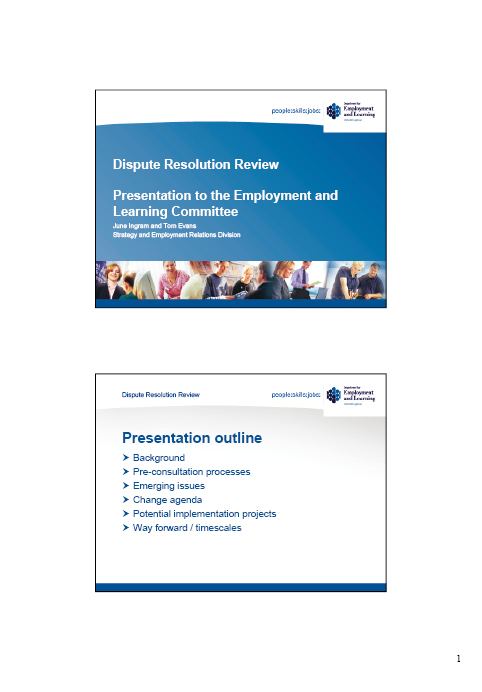
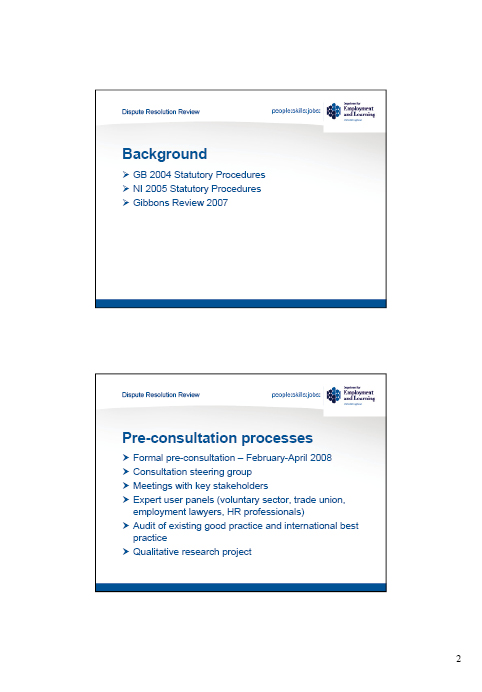
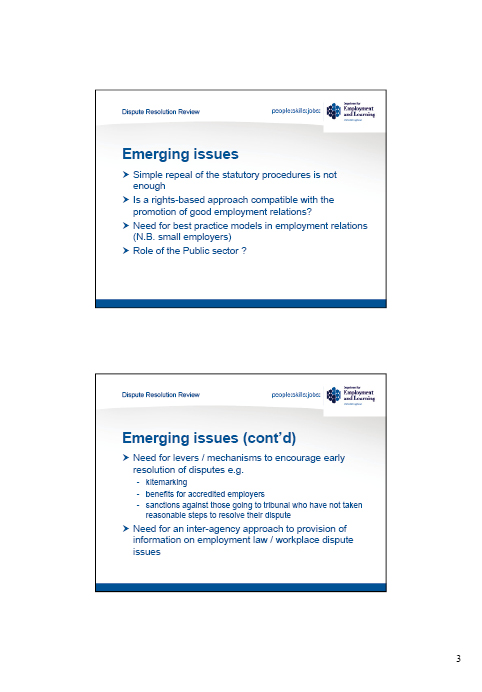
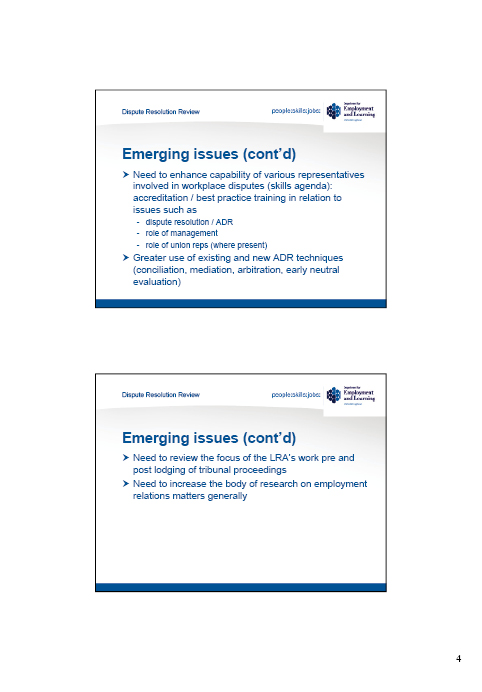
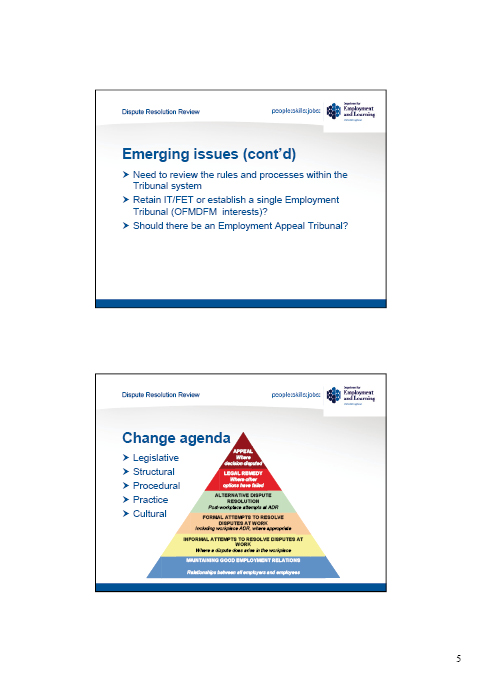
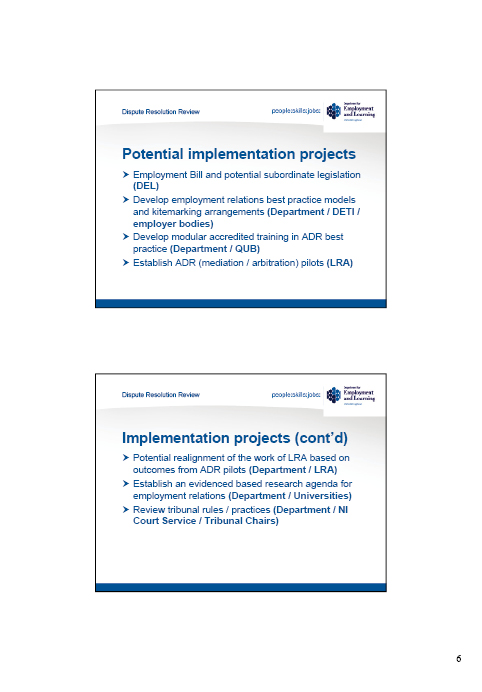

Labour Relations Agency
- 14 January 2009
Background to the Labour Relations Agency (LRA)
The LRA (the Agency) was established in 1976. The general statutory duty of the Agency is to promote the improvement of industrial relations in Northern Ireland (NI) through facilitating good employment practice and resolving industrial disputes.
The LRA promotes good employment practice through the following:
- The issuing of Codes of Practice which provide standards of good practice for reference by Tribunals.
- The provision of an employment advice and information helpline.
- The provision of a comprehensive website dedicated to Northern Ireland employment law and good employment practice.
- The provision of workshops and seminars on core and topical employment issues.
- The vetting of employment policies and procedures for small firms.
- Undertaking industrial relations project work.
- The undertaking/commissioning of industrial relations research.
- The LRA resolves employment disputes through the following:
- The provision of an individual employment rights conciliation service.
- The provision of a collective conciliation service for disputes between employers and trades unions.
- An arbitration service.
- The provision of a mediation service.
- The Agency is empowered to enquire into industrial relations through the establishment of a Committee for Enquiry.
THE DEL REVIEW OF DISPUTE RESOLUTION
The DEL review follows on from a similar review undertaken by Michael Gibbons in Great Britain (GB). The Agency sees the DEL review as an opportunity for the NI Assembly to introduce employment law, arrangements and provisions that are responsive to the unique circumstances of NI:
- The micro-firm economy of NI
- The litigious culture in NI
- Pro-rata to GB the high level of claims submitted to Tribunals
- The lack of research on dispute resolution in the workplace
- The handling of bulk or multiple cases (a bulk cases is defined as 5 or more submissions of the same case from different employees)
Developing an Agency Position
Over recent months the Agency Board has been conducting its own review of the dispute resolution processes and has decided to support the following:
- The repeal of the current statutory dispute resolution procedures
- The production of simple guidelines on grievance, discipline and dismissal
- The current Tribunal cost regime should remain unchanged
- The greater use of in-house early dispute resolution processes
- The increase in quality of employment advice and information
- Maintain free dispute resolution services before the lodgement of a Tribunal claim
- The simplification of employment law
- The simplification of Tribunal claim and response forms
- Improve the handling of ‘multiple’ claims
- Encourage Tribunals to engage in active early case management
- No need for a review of when a Tribunal Chair sits alone
- Tribunals have sufficient powers to deal with weak and vexatious claims
The Agency awaits the issue of the DEL formal consultation papers before coming to a final position on other key issues such as giving claimant’s access to the Tribunal process through the LRA helpline and abolishing fixed periods for conciliation.
Agency Effectiveness and Economy
In a recent GB study of the economic contribution of ACAS, which provides similar services as the Agency, it was found that the benefit cost ratio of ACAS handing individual employment rights claims was a net benefit of 6.4, that is, each pound spent produced £6.4 benefit to the GB economy. For the ACAS telephone helpline the benefit ratio was 53.1 and for collective conciliation 98.8. The overall net benefit ratio for all the ACAS services covered in the study was 16.1.
In a recent study reported by the Chartered Institute for Personnel and Development (CIPD) it was estimated that an individual rights case taken through the Tribunals would on average cost up to £250,000 whist the same case conciliated through ACAS would on average cost up to £9,000.
It is notable that of the 4,000 individual rights cases received by the LRA each year more than 80% do not proceed to a Tribunal hearing. The Agency’s independence and neutrality is held in high regard by all sections of industry. It is anticipated that additional resources will be required if the Agency is to maintain continuous improvement in dispute resolution particularly in light of the potential changes likely to follow from the DEL review.
Future meeting with the DEL Committee
Given the complexity of the above and the fact that the DEL formal consultation papers have yet to be issued the Agency requests a further meeting with the DEL Committee in order to inform the Committee of the Agency’s final position on the review.
Law Centre (NI) - 14 January 2009

Resolving Workplace Disputes
Executive Summary for Committee for Employment
and Learning
Law Centre (NI)
February 2009
Law Centre®
Introduction
1.1 Law Centre (NI) welcomes the opportunity to give evidence on this topic to the committee. In our evidence we identify those areas where our experience suggests the current system works well, those areas that work less well and the problems the forthcoming consultation could address
1.2 We would accept that the current grievance procedure is overly complex and in need of reform. There are compelling reasons, however, for the retention of the statutory disciplinary process in Northern Ireland. Principal among these is that the process is simple and generally well understood by the majority of employers. For employees it incorporates the basic principles of natural justice that anyone facing serious disciplinary action or dismissal might expect. Northern Ireland has a significantly higher proportion of small businesses relative to the rest of Britain for whom the statutory disciplinary procedure provides welcome clarity as to their legal obligations in this area. We feel that a change to the disciplinary process could create uncertainty and would require extensive publicity and education for employers in particular.
Statutory Procedures
2.1 Law Centre (NI) supports the review of the statutory dispute resolution procedures, as certain aspects have led to considerable difficulties for both claimants and respondents. However we believe that it would be a mistake to limit options in the forthcoming consultation to rejection or endorsement of the procedures as a whole.
2.2 The statutory disciplinary and dismissal procedure and the statutory grievance procedure are distinct in scope and operation and each should be considered individually and addressed in separate consultation questions.
2.3 The statutory grievance procedure is complicated, time-consuming and legalistic and confuses employers, employees and legal representatives. There is a strong case for its removal.
2.4 On the other hand, the statutory disciplinary and dismissal procedure is simple, easily understood, and provides welcome clarity for both employer and employee. There is a strong case for its retention.
2.5 We argue that the retention of the statutory dismissal procedure actually benefits small employers as a class. This is particularly applicable in Northern Ireland, as we have a much higher proportion of small employers in this jurisdiction than elsewhere in the UK. Small businesses are much less likely to have set disciplinary procedures of their own, but awareness of clear statutory procedures would enable them to offer employees basic procedural fairness, avoid dismissals based on incomplete or incorrect facts, and reduce the possibility that they might be held liable for unfair dismissal.
Alternative Dispute Resolution
3.1 Law Centre (NI) strongly supports exploring the options of ADR for certain employment disputes (while recognising that it will not be appropriate in all cases). The benefits of ADR include the following:
I. it provides a less confrontational and more positive means of resolving disputes (which is particularly valuable where an employment relationship is continuing);
II. it is less formal and more accessible than the Tribunal route which means that unrepresented claimants have a better chance of successfully pursuing a claim;
III. some forms of ADR may allow for a more flexible remedy/resolution than available from a Tribunal;
IV. it is generally speedier and less costly than the Tribunal route.
3.2 While arbitration is clearly part of ADR, we suggest it may be appropriate for it to be considered it separately from conciliation, mediation and early neutral evaluation. Arbitration is an alternative to the Tribunal route and results in a decision which is binding on the parties whereas the other forms of ADR precede or run parallel to Tribunal proceedings and are non-binding (conciliation becomes binding at the behest of the parties)
Access to Justice
4.1 Reform of the system for resolving employment disputes should keep the issue of the access to rights of the individual at the forefront. Our experience is that the system deters many individuals with valid claims from pursuing their cases. We are concerned that the high numbers of settlements and withdrawals of cases are due largely to the built-in barriers within the system. The barriers include: the adversarial nature of the Industrial Tribunal; the lack of partial advice; the legal complexity of the Tribunal process; the high cost of representation; the way the system appears to favour the represented parties who are more likely to be legally represented, which in the majority of cases, is the employer and the measures taken by respondents’ legal representatives, such as costs threats and delaying action.
4.2 One significant barrier to justice is the policy focus on vexatious litigation. We would accept there will always be vexatious cases; our experience is that the number is very small. For this reason, we feel using this issue as a main driver of policy, rather than aiming to increase the number of meritorious cases being taken to completion, acts as a barrier to accessing justice and is an inappropriate driver of policy. Many meritorious claims are not brought to hearing, are abandoned, or are settled for a reduced sum due to the lack of proper representation. This should be a stronger driver of policy. We also believe that with increased provision of advice to workers at an early stage would help prevent disputes from escalating and would facilitate early resolution. The need for such early dispute resolution is more pressing in the current economic downturn.
4.3 Any measures that address the symptoms without tackling the fundamental problem are cosmetic and likely to be ineffective. They also have the effect of making it even more difficult for genuine claims to be successfully resolved. Northern Ireland has the opportunity for taking both the best of the current system and the best of the changes from Britain to fashion a system for resolving employment rights disputes that meets the needs of Northern Ireland and allows greater access to justice for individuals while still improving the efficacy of the system
Confederation of British Industry (CBI) –
25 March 2009
NI 10 09
Response to NI Assembly Committee for Employment and Learning review of workplace dispute resolution (DRAFT 1)
1. CBI Northern Ireland welcomes the opportunity to participate in the review by the Committee for Employment and Learning of workplace dispute resolution.
2. The CBI is the UK’s leading business organisation, speaking for some 240,000 businesses which together employ around a third of the private sector workforce. No other UK organisation represents as many major employers, small and medium-sized firms or companies in the manufacturing and service sectors.
General Points
3. The CBI recognises that the principal aim behind the introduction of the statutory dispute resolution procedures in Northern Ireland in 2005 was to encourage companies and employees to settle disagreements through internal grievance and disciplinary procedures and reduce the reliance on employment tribunals.
4. However, in practice there is some evidence that the regulations have failed to achieve this objective and a range of problems have been experienced. Employers have been faced with an elevation of procedure over substance and an overformalisation of disputes, and it may often be unclear whether an employee has actually raised a grievance. In addition, the procedures do not distinguish between different types of dismissals and this significantly complicates the operation of the regulations. The CBI therefore believes that there is at least an argument for repealing the regulations.
5. Our view is that resolving individual disputes in the workplace promotes good employee relations and any procedures for dealing with them must follow the principles of fairness and consistency. If the regulations were to be repealed, new guidance on the formal procedures would be required. This should focus on key principles and offer simple procedures which all employers can follow. Employees must of course have access to industrial tribunals where they feel that their legitimate claims have not been resolved adequately, but it is also essential to ensure that the tribunals system deals effectively with weak and vexatious claims which bring the system into disrepute.
6. CBI members have raised various concerns about how the statutory dispute resolution procedures have been operating in practice. These include:
- Procedure has been elevated over the substance of a claim – employers are concerned that, despite having more than adequate discipline and dismissal procedures, tribunals are able to find against them on a technicality – for example, not inviting an employee to a disciplinary meeting in writing. Cases could now much more likely be decided on the unsatisfactory basis of compliance with technicalities, rather than the substance and merits of the case and whether the employer has behaved fairly
- Too many disputes have become overly formalised – in many cases the statutory procedures have formalised minor disagreements at too early a stage, invoking formal procedures to resolve conflict that could have been better dealt with informally. Companies follow procedures to the letter to ensure that they are not subject to a tribunal claim later because they failed to respond appropriately to a claimant’s grievance when raised at the workplace. This is not conducive to the efficient running of the business, with significant management time being taken up with formalised grievance procedures
- Differing types of dismissal require different procedures – the three-step procedure is unsuited to non-disciplinary dismissals- the statutory procedures do not discriminate between different types of dismissal – disciplinary dismissals are treated in the same way as those resulting from redundancy (of fewer than 20 employees) or, for example, the end of a fixed-term contract. This requirement - which has added nothing to the fairness of the process for non-disciplinary dismissals, particularly redundancies – has significantly complicated the operation of the regulations
- Employers are often unsure whether an employee has actually raised a grievance- some employers are unsure as to whether or not they need to proceed with the grievance procedure as it is often unclear whether an employee has actually raised a ‘grievance’. For example, in a resignation letter, an employee may make an observation or remark such as “ My boss always disliked me". Many employers are unsure as to whether they have to initiate the grievance procedure or not in these circumstances
- The interaction of the grievance and disciplinary procedures has proven particularly problematic – too often an employee facing disciplinary action lodges a grievance concerning how the disciplinary procedure is being handled – or even about an unconnected issue. Many employees are well aware that they are able to effectively stagnate the disciplinary process through continuing to raise grievances which the employer feels they have to deal with before proceeding with the disciplinary action.
7. The CBI will be responding in detail to the consultation on the review of workplace dispute resolution which we understand is due to be issued by the Department for Employment and Learning around the end of this month, and we will be consulting our members on the wider issues with which it will deal, such as the current systems for resolving disputes, the options for changing these, alternative dispute resolution and legal remedies and appeals, particularly how industrial tribunals are currently conducted and the need for an Employment Appeals Tribunal. However, our general policy is that unless there is a convincing argument that enacting different provisions would benefit our economy, Northern Ireland employment legislation should follow that of Great Britain.
CBI Northern Ireland
19 March 2009
The Equality Commission for
Northern Ireland – 25 March 2009
Briefing
The Equality Commission
The Equality Commission for Northern Ireland (the Commission) is an independent public body established under the Northern Ireland Act 1998. The Commission is responsible for implementing the legislation on age, fair employment and treatment, sex discrimination and equal pay, race relations, sexual orientation and disability. The Commission’s remit also includes overseeing the statutory duties on public authorities to promote equality of opportunity and good relations under Section 75 of the Northern Ireland Act 1998 and the disability duties under the Disability Discrimination Act 1995.
ECNI Representatives
Bob Collins, Chief Commissioner of the Equality Commission
Eileen Lavery, Head of Strategic Enforcement who represents the Equality Commission on the Statutory Dispute Resolution Steering Group.
Commission comments on Dispute Resolution Review
1. The Commission has welcomed the opportunity to be involved in the present review of the Statutory Dispute Resolution system.
2. In the pre consultation on resolving workplace disputes the Equality Commission commented that alternative dispute resolution (ADR) if applied effectively in discrimination disputes can result in early, less costly and more informal resolution of complaints with meaningful outcomes. In certain types of cases, an informal system of dispute resolution may be more effective and appropriate and individuals may benefit from the private nature of the outcomes. However, it also recognized that there are cases in which it is necessary to establish precedents in both law and practice and the Equality Commission has a continuing role in assisting cases of strategic importance to its corporate objectives.
3. Each year the Equality Commission provides advice to some 3,000 individuals who believe they have been the victim of unlawful discrimination; the vast majority (80%) of the enquiries are about employment matters. Our advice in the first instance is focused on facilitating the enquirer to resolve the issue informally. Where such informal resolution is not possible we subsequently provide advice in relation to the lodgment of formal proceedings. We select a number of cases each year to assist with the pursuit of such proceedings. The Commission has a strategic approach to litigation and complainant assistance, as set out in our Policy for the Provision of Legal Advice and Assistance. Our staff have considerable experience in assisting individual clients to exercise their legal right to non discrimination and to obtain appropriate remedies. Two recent surveys, one in relation to those to whom we provide initial advice and a second of those to whom we have provided legal assistance, record that Equality Commission help is greatly valued and the achieved outcomes have been considered satisfactory.
4. The Equality Commission will enter into negotiations to settle a case prior to hearing if it is in the interests of the assisted claimant and the Commission to do so. The Commission will seek appropriate compensation and additional clauses such as a commitment to equality issues or respondent agreement to liaise with the Commission regarding equality policies, practices and procedures, implementing such changes as are recommended. Such agreed action, over and above compensation, is of benefit both to the complainant, where s/he has remained in employment, and the wider workforce in the employment. It is also of significance in helping the Commission to fulfil its statutory remit in respect of working towards the elimination of unlawful discrimination.
5. The majority of cases which we assist are concluded by way of negotiated compromise settlements and only a small number proceed to determination in the Industrial or Fair Employment Tribunals, and very occasionally in the higher courts. In the year 2007/08, we resolved a total of 103 discrimination cases supported by us. Of these, 90 were settled before reaching a court hearing. A further 13 were determined in a court or tribunal. The Commission agrees that in most instances achieving a resolution between the parties at an early stage is preferable but nevertheless we will always seek to retain a role in supporting cases where the law is uncertain and where a ruling by a tribunal or court can clarify the law.
6. The role of the Industrial Tribunals and the Fair Employment Tribunal in addressing discriminatory practice has been of considerable significance in Northern Ireland. Tribunal decisions have provided individuals with a declaration of their legal rights and have also provided employers with clear examples of discriminatory practice and so assisted the improvement of employment practice generally.
7. The Equality Commission agrees that the arrangements in respect of dispute resolution should encourage such resolution at the lowest possible level, that is, ideally within the employment relationship. However there is at present and will continue to be a role for Tribunals in the resolution of disputes and this is particularly so where an individual’s rights under anti discrimination legislation has been infringed. Any reform of alternative resolution processes must ensure that discrimination rights are not diluted. A revised system must not limit or deny access to justice. Importantly too vulnerable applicants must receive the same level of protection which would be expected in the judicial process.
8. In terms of informal resolution the Committee will be aware that in Northern Ireland the statutory requirement for a three step process (written statement, meeting and appeal), continues, although this statutory requirement will come to an end in Great Britain from 6 April 2009. There have been concerns expressed that, here in Northern Ireland as in Great Britain, the statutory requirement to follow the three step process too quickly moves the parties to formality and diminishes the opportunities for informal resolution. Further, the complexity has been increased for individuals in discrimination cases who have had to deal both with SDR and the procedural requirements attaching to the particular discrimination ground or grounds. There have nevertheless been certain advantages arising from SDR; in many disputes lodged with Tribunals in the area of discrimination the SDR process has provided to complainants early sight of the respondent’s defence. Such information has allowed complainants, and the Equality Commission in cases in which support was sought, to make a more informed decision about progression.
9. A revised Code of Practice on Discipline and Grievance, has been prepared by ACAS for use in Great Britain once the Statutory Dispute Resolution procedures cease in April this year. It is intended that this guidance, while reducing the formality of SDR, will nevertheless provide parties to a dispute with a clear procedure to assist informal resolution. While we recognize the advantages of informality we are strongly of the view that, given the complexity and seriousness of some discrimination complaints, an effective system of guidance to replace SDR is required. It is important that all employers have arrangements, rules and procedures which are consistently and fairly followed.
10. To date the work of the Steering Group has included the pre consultation work and information gathering from professionals, reviews of other jurisdictions and discussions with stakeholders. This early work has led to the identification of certain key principles for a revised system. These include the promotion of good employment relations and the provision of strong employment rights. The principles also include effective mechanisms to resolve disputes and to enhance capacity of all those involved in the prevention and resolution of workplace disputes. We welcome in particular this commitment to measures to encourage employers to develop their skills to deal with dispute resolution effectively. Indeed, we ourselves are heavily involved in such capacity building. We commit significant resources to advising employers on how to avoid discrimination and promote equality of opportunity. We make available to employers a range of advisory and guidance materials including a Model Equal Opportunities Policy, which employers can modify to suit their own requirements. We have recently drawn together the main elements of our employment guidance across all discrimination strands into a Unified Guide for Employers. This was discussed with employers in a targeted consultation and as warmly received. We provide an annual programme of employer training covering the full range of equality areas. We have a dedicated Employer Enquiry Line where employers may contact the Commission to obtain confidential advice. This Enquiry Line is promoted generally among employers as well as more specifically among key groups such as the Federation of Small Business (FSB). We also work in partnership with FSB, Enterprise Agencies, LRA and Invest NI, targeting start up businesses, in relation to the promotion of good equality practice.
11. Furthermore in relation to individuals who have rights under the equality legislation in addition to our role of providing advice to individuals we prepare and promulgate materials for claimants on resolving disputes.
12. The present review will also consider options to improve further the Tribunal system. The President of OITFET has already implemented a series of actions to reduce the time from case lodgement to hearing and the ECNI along with other users has welcomed the opportunity to be involved in the revisions. Further matters including the option of the establishment of a single Equality Tribunal and the potential for an appeal tribunal will also be considered as part of the forthcoming consultation.
13. The Equality Commission has welcomed the opportunity to be involved in the Steering Group and to contribute thus far. We look forward to the consultation and subsequent design of systems which reflect the specific needs of Northern Ireland and which provide for the promotion of good employment relations and strong employment rights.
Appendix 4
Research Papers
_fmt.jpeg)
Research Paper No: December 2008
Alternative Dispute
Resolution in Employment
Paper prepared for the Committee for Employment and Learning
Jennifer Betts
Research Officer
Research and Library Services
The Employment Act 2008 followed an independent review of employment dispute resolution in the UK and a public consultation in GB. The Employment Act 2008 repeals employment law and regulations in the UK. As employment is a devolved matter this gives Northern Ireland the opportunity to tailor an employment dispute resolution structure that is tailored to suit local needs. This paper examines developments in GB and the review currently being conducted by the Department for Employment and Learning in Northern Ireland. Early resolution of disputes within the workplace is acknowledged as a favoured alternative to costly tribunals and this Research Paper examines models for alternative dispute resolution in the workplace.
Library Research Papers are compiled for the benefit of Members of The Assembly and their personal staff. Authors are available to discuss the contents of these papers with Members and their staff but cannot advise members of the general public.
Summary of key points
The Employment Act 2008 received Royal Assent on 13 November 2008. It repeals previous legislation and regulations for employment dispute resolution in the UK. The intention of the 2008 Act is to simplify employment dispute procedures and make informal dispute resolution in the workplace a more viable option.
The review of employment law in GB had been necessary because the Employment Act 2002 and (Dispute Resolution) Regulations 2004 were resulting in more employment disputes reaching tribunal stage, instead of fewer as had been the intention. This was having financial implications for the Government, employers and employees. It is estimated that it costs the Government approximately £120 million per year to operate the employment dispute resolution system and an average cost to business of £9,000 to defend an employment tribunal claim. In addition there is emotional stress for employees that cannot be quantified.
Recommendations to come from the review in GB have reflected the need for a simplification of the system. Complexities had led to confusion for both employees and employers, particularly in small businesses, that meant proceeding straight to tribunal seemed a simpler and safer option.
As employment is a devolved matter, the Department for Employment and Learning (DEL) are conducting a review in Northern Ireland that will encourage the early resolution of workplace disputes within the workplace. Pre-consultation discussions have taken place with key stakeholders and DEL will be launching a public consultation early in 2009. Northern Ireland will have an opportunity to create an employment dispute resolution framework to suit local needs.
Methods of alternative dispute resolution will form a key part of the consultation. The Labour Relations Agency has a statutory duty to offer conciliation and arbitration services to parties involved in a workplace dispute before it goes to a tribunal hearing. Although it does not have a duty to do so, the Labour Relations Agency also offers a mediation service to employers and employees. DEL’s consultation will look at how models for dispute resolution can become a viable first option for resolving disputes at an early stage within the workplace rather than escalating to an Industrial Tribunal or Fair Employment Tribunal.
Contents
1.0 Introduction
2.0 The Gibbons Review
3.0 GB Consultation
4.0 Employment Act 2008
5.0 Northern Ireland Employment Dispute Resolution
5.1 Tribunal system in Northern Ireland
5.2 Case outcomes
6.0 Department for Employment and Learning Pre-consutation Process
7.0 Issues for Proposed Northern Ireland Consultation
8.0 Alternative Dispute Resolution (ADR)
9.0 Models for Alternative Dispute Resolution
9.1 Conciliation
9.2 Arbitration
9.3 Mediation
9.6 Med-arb
9.7 Mandatory ADR
Conclusion
1.0 Introduction
This Research Paper will look at Alternative Dispute Resolution (ADR) in employment, currently the subject of review in Northern Ireland. Minimum standards for disciplinary and grievance procedures have been provided for by the Employment Act 2002 and (Dispute Resolution) Regulations 2004 since 2005 (2004 in GB)[1]. Following changes in GB, the Department for Employment and Learning propose launching a public consultation on employment dispute resolution in January 2009.
In March 2007 a Consultation[2] was launched in GB based on recommendations contained in an Independent Review of employment dispute resolution conducted by Michael Gibbons[3]. The need for a review was based on an acceptance by Government that the current legislation, although recent, was too administratively burdensome for both employers and employees. Contrary to its intention to reduce the need for litigation in employment disputes, it had led to an increase in cases brought to tribunal.
The Consultation allowed the Government to identify key legislative reforms contained in the Employment Act 2008 which received Royal Assent on 13 November 2008. The Employment Act 2008 repeals the legislation and regulations that also applied in Northern Ireland.[4]
In comparison with GB, Northern Ireland has a high proportion of small business employers and a large public sector. Since employment is a devolved matter there is now an opportunity to create a bespoke employment dispute resolution model tailored to fit the needs of local business and employment.[5]
This paper reviews the findings of the Gibbons Review, the Employment Act 2008 and proposed changes in GB. It will also include discussions the Department for Education and Learning held with key employment stakeholders in Northern Ireland prior to the public consultation on employment dispute resolution reform in 2009. Finally, it will look at models of alternative dispute resolution (ADR).
2.0 The Gibbons Review
An agreement that the regulations have not worked as intended led to the Government commissioning Michael Gibbons in December 2006 to conduct an Independent Review of employment dispute resolution in GB (‘the Gibbons Review’). The aim of the Gibbons Review was to simplify and improve all aspects of employment dispute resolution for both employer and employee.
When the Employment Act 2002 was introduced, small businesses had expressed their concern about the level of resources and expertise required to comply with the legislation. A year after the regulations that followed were implemented in 2004, the CBI claimed that many firms were settling cases they could have won because they were afraid of the cost of going to tribunals. There was also a perception that tribunals allowed weak and vexatious claims to be heard.[6]
The Gibbons Review found that the procedures introduced in 2004 (2005 in Northern Ireland) had brought some benefits. There was now more clarity for employers and employees on the steps that needed to be followed in formally pursuing disciplinary and grievance cases. Employers were more likely to ensure their managers were trained in handling such situations and there was the opportunity to consider an employee’s grievance before submitting a tribunal claim, thereby offering an opportunity for early resolution.
However, the findings of the Review concluded that the costs outweighed the benefits, placing additional administrative pressures on employers and generally failing to deliver what had originally been intended. It is estimated that the average cost to business of defending an employment tribunal claim is £9,000[7] and that the dispute resolution system costs the UK Government around £120 million per year.[8]
Gibbons summarised that overall:
In conducting the Review I was struck by the overwhelming consensus that the intentions of the 2004 Regulations were sound and that there had been a genuine attempt to keep them simple, and yet there is the same near unanimity that as formal legislation they have failed to produce the desired policy outcome. This is perhaps a classic case of good policy, but inappropriately inflexible and prescriptive legislation.
The Committee may wish to note that smaller employers reported that recording everything in writing could introduce a formality that often needlessly escalated a workplace issue.
Gibbons presented his main findings under the following headings:
- Formalising disputes – The complexity of the procedures and the penalties for failing to follow them mean that both employers and employees have tended to seek external advice earlier.
- One size does not fit all – Procedures apply to many situations where they do not fit or are excessive. The three-step[9] process is inappropriate in agreed redundancy situations or where fixed-term contracts terminate.
- Too bureaucratic and complicated – Employment tribunals are considered too costly and complex for all involved. The requirement to focus on procedure rather than merits is now excessive.
- More effective targeting of resources needed – Concerns that employment tribunals are making inconsistent decisions and that too many weak and vexatious claims are being allowed through the system.
- Early resolution and alternatives to tribunals – Early resolution can involve outcomes not available through the tribunal system such as a positive job reference, an apology and changes in behaviour. Around 75% of claims made to tribunal are resolved without the need for a hearing, a substantial proportion with the involvement of the Advisory, Conciliation and Arbitration Service (Acas).
Gibbons key recommendations were to:
- ensure that employment tribunals at their discretion take into account reasonableness of behaviour and procedure when making awards and cost orders;
- introduce a new simple process to settle monetary disputes without the need for tribunal hearings;
- increase the quality of advice to potential claimants and respondents through an adequately resourced helpline and the internet; and
- offer a free early dispute resolution service, including mediation where appropriate.
3.0 GB Consultation
Building on the Gibbons Review the Government launched a Consultation[10] seeking views on resolving employment disputes successfully in the workplace. There were over 400 responses to the Consultation and following changes in the responsibilities of Government Departments the work is being taken forward by the Department for Business, Enterprise and Regulatory Reform (BERR).[11]
Based on the Review and Consultation, the Government response was published in May 2008[12]. It contained a number of measures the Government was considering, not all of which require primary legislation.
Measures to help resolve more disputes successfully in the workplace by:
- repealing the Employment Act 2002 (Dispute Resolution) Regulations 2004 and the corresponding sections of the Employment Act 2002, and examining any consequential changes to other areas of law;
- providing clear guidelines on good practice for resolving disputes, building on the work currently being done by Acas;
- providing encouragement to follow good practice in resolving disputes, which would include penalties for those who make little or no attempt to resolve their dispute before an employment tribunal hearing; and
- inviting employer and employee organisations and others to develop guidelines for using alternative dispute resolution and to promote its use to their members.
Measures to help employers and employees resolve disputes beyond the workplace by:
- providing a new advice service on dispute resolution accessible by telephone and internet;
- providing a new, swift way to settle straightforward monetary disputes without the need for employment tribunal hearings; and
- encouraging earlier conciliation in appropriate cases and removing the fixed conciliation periods which place time limits on Acas’ duty to conciliate tribunal claims.
Measures to make the employment tribunal system simpler and cheaper by:
- simplifying employment tribunal forms;
- considering unifying time limits and the grounds for extension;
- improving procedure and encouraging more active case management;
- simplifying management of multi-claimant claims;
- improving the handling of weak claims and vexatious claimants; and
- considering when chairs should sit alone in employment tribunals.[13]
4.0 Employment Act 2008
The Employment Act 2008 received Royal Assent on 13 November 2008. The changes to employment dispute resolution in the workplace in GB will inform consideration of the process in Northern Ireland.
The Employment Act 2002 (Dispute Resolution) Regulations 2004 included minimum ‘three-step’ dismissal, disciplinary and grievance standards. Unless the ‘three-step’ disciplinary procedures[14] were adhered to, any dismissal of an employee was automatically deemed by a tribunal to be unfair. Whether or not the dismissal would have been upheld by the tribunal if the three-steps had been followed was not a consideration. A primary recommendation of the Gibbons Review was the repeal of the three-step rule.
Sections 1-7 of the 2008 Act make the following changes to legislation and procedures in GB and will come into force in April 2009. The changes are outlined below.[15]
- Existing statutory dispute resolution procedures and related provisions about procedural unfairness in dismissal cases are repealed. This means that a dismissal will no longer automatically be deemed unfair where there is a procedural breach by the employer. It also means that employees will no longer be prevented from bringing a claim before an employment tribunal without first having raised the grievance with their employer.
- Discretionary powers are conferred on employment tribunals to adjust awards by up to 25% if parties have failed unreasonably to comply with a relevant code of practice. This is the Acas Code of Practice on Disciplinary and Grievance Procedures which will come into force in April 2009. It focuses on appropriateness of behaviour rather than compliance with a set procedure.
- Acas’s statutory duty to conciliate between parties where proceedings have been issued is currently bound by a fixed time period. The Employment Act extends Acas’s duty to conciliate throughout the proceedings, up until judgement is made.
- Employment tribunals may be authorised to decide cases without a hearing[16]. The permission of the parties involved must first be gained in writing. (Tribunals may continue to issue default judgements without a hearing and without the permission of the parties involved.)
- In unlawful deduction of wages or redundancy payments, tribunal’s powers will be extended in order to be able to award an additional amount to fully compensate an employee for any additional financial losses such as bank charges.
5.0 Northern Ireland Employment Dispute Resolution
Employment dispute resolution in Northern Ireland closely resembles that of GB. Therefore issues identified and proposals for change in GB are useful for consideration in the review in Northern Ireland. However, there are some key differences, notably the way in which the tribunal system is set up:
- While GB has a single Employment Tribunal Northern Ireland has an Industrial Tribunal and a Fair Employment Tribunal.
- Northern Ireland has no Employment Appeal Tribunal where decisions can be appealed on points of law. In NI anyone wishing to appeal on a point of law must go to the Court of Appeal.
- The Labour Relations Agency (LRA) closely resembles Acas and performs a role in dispute resolution including conciliation[17] and arbitration. LRA will also carry out mediation, but is not under a duty to do so.
- NI employees are approximately 20% less likely to make a claim to a tribunal than employees in GB.
5.1 Tribunal System in Northern Ireland
The Fair Employment Tribunal (FET) hears cases where discrimination on a religious or political basis is involved. The Office of the Industrial Tribunal and the Fair Employment Tribunal (OITFET) Annual Report 2006/07 shows that registered claims and complaints to the FET have fallen steadily over the last five years from 500 in 2002/03 to 160 in 2006/07.[18]
Members may wish to consider if they think there is a need for two separate tribunal bodies (IT and FET) as opposed to one in GB.
Pressure has been mounting on the tribunal system in Northern Ireland in recent years. In order to support its work the department has introduced the following measures as part of a reform process[19]:
- changes in 2004 and again in 2005, to the rules of procedure governing the operation of tribunals, including enhanced powers to manage cases;
- the introduction, from 3 April 2005 of statutory minimum dispute resolution legislation requiring all employers to have in place, as a minimum, the three-step procedure for dealing with formal employment rights disputes in the workplace. Failure to follow the procedure can result in penalties ranging from a reduced tribunal award to rejection by the tribunal of a claim;
- the introduction respectively in 2002 and 2006, of statutory arbitration schemes enabling the LRA to provide an alternative to tribunal proceedings where the point at issue relates only to unfair dismissal or flexible working; and
- the appointment of additional full-time judiciary and administrative staff, a strengthening of management structures, improved liaison arrangements between the OITFET and the LRA, and the procurement of new information technology solutions to automate some functions relating to the handling of cases.
During the short time these measures have been in operation and despite criticism of their complexity, the Department for Employment and Learning (’the Department’) believes that early indications show they have had positive impacts.
A main impact the Department viewed as positive in the February 2008 pre-consultation document[20] was the Department’s estimate that, for the first time in years, the number of claims registered as a proportion of employees had fallen below that of GB. However, the Department acknowledges that this may be due to the bar having been raised for accepting claims, the complexity of the system acting as a deterrent, or that it only represents a temporary reduction while claimants and advisors adjust to the new statutory requirements.
5.2 Case Outcomes[21]
The majority of tribunal claims do not proceed to a full hearing; 12% of IT and 10% of FET cases. Most cases have one of three outcomes; successful conciliation by the LRA, private settlement between the parties, or withdrawal. In 2006/07 24% of claims received by the LRA settled before a claim was made to a tribunal.
When cases register with a tribunal, even if they do not go to full hearing stage, there will have been a high degree of case management in the form of discussions and pre-hearing reviews. Some parties wait to settle until just prior to the hearing itself. The benefits of early resolution would therefore have an obvious beneficial effect on resources involved in the preparation and conducting of tribunals.
6.0 Department for Employment and Learning Pre-consutation Process
Following the Gibbons Review and GB Consultation, the Department has been in discussion with key players in employment dispute resolution in Northern Ireland. The discussions were based around a pre-consultation document published by the Department in February 2008[22]. A desire for change has been identified and the Department intends to have a full review of employment dispute resolution in Northern Ireland beginning with a public consultation early in 2009. The desired outcome from such a review will be to have ‘a bespoke system that best reflects the needs of the Northern Ireland economy while upholding the rights of individual employees’.[23]
Based on the discussions with key players and interest groups, GB recommendations that would make a useful starting point for discussion in Northern Ireland include:
- repeal of provisions relating to the three step process for unfair dismissal and reverting to the legal position before the procedures were introduced[24];
- revise the Acas Code of practice and enable an Employment Tribunal to raise or lower an award if the Code has not been followed;
- remove time limits on ACAS’ ability to offer its conciliation services;
- provide funding for an improved ACAS helpline and increased availability of early conciliation services; and
- adjust the compensation powers of tribunals.
These recommendations will form the basis of the Public Consultation the Department intends to conduct at the end of January 2009.
7.0 Issues for Proposed Northern Ireland Consultation
The outcome of the pre-consultation in Northern Ireland identified the advantages and disadvantages in retaining the statutory procedures currently operating in Northern Ireland. While many felt that NI should follow GB in dispensing with them, there were also arguments for their retention.
7.1 Advantages of Current Procedures
Opinions voiced in pre-consultation discussions showed that the statutory procedures did have their place. They provide a ‘safety valve’ that forces grievance issues to be raised and addressed between employers and employees, with the opportunity to resolve them. They also mean that employers are forced to respond to employee issues. Where discussion takes place, issues can be clarified and an informed decision made about whether there is a need to proceed.
Around the issue of smaller businesses operating in Northern Ireland, it was pointed out that the procedures equip employers with a ‘mandatory baseline’ that leads to ‘a degree of consistency’ among employers regardless of their size and knowledge of employment law.
7.2 Disadvantages of Current Procedures
Complexity is a recurring theme of any discussion around the statutory procedures and is in line with the findings of the Gibbons Review. A widespread view is that the ‘legislation itself has proven unfit for purpose’ and over-formalises dispute resolution processes from the beginning. It is argued that putting a dispute in writing at too early a stage encourages parties to become entrenched with a focus on the possibility of a tribunal, rather than considering a more informal approach. It was thought that the procedures could encourage formal rather than informal dispute resolution.
A lack of clarity about what precisely constitutes a grievance ‘places pressure on employers to scrutinise every written communication and to react formally if there is the slightest possibility that it could be seen as a stage one grievance letter. Employers therefore begin formal processes where this may not be necessary.’
In order to ensure that a claim will be accepted by a tribunal, a claimant has to decide at a very early stage whether they wish to follow statutory procedures as they will ultimately have to account for the decision on a tribunal claim form if they go to tribunal stage.
The Department acknowledge that the implications for the review show that ‘any fundamental review of dispute resolution systems will have to look carefully at whether statutory procedures have a future, how they can be modified if they do, and what might replace them if they do not.’
The Department concludes that the implications for the review that have come from the pre-consultation exercise show that[25]:
Stakeholders are agreed that tribunals provide an essential service where alternative methods of resolving a dispute have been tried but have failed, or where other methods are simply inappropriate. Beyond that, they have identified a range of issues that they would wish the review to explore, from the operation of the Rules of Procedure to the fundamental structure of the tribunal system. Drawing on these concerns, the dispute resolution review will set out to ensure that tribunals continue to be fit for purpose and are able to mesh successfully with any new arrangements that are made for wider dispute resolution.
8.0 Alternative Dispute Resolution (ADR)
The Acas statutory Code of Practice[26] (‘the code’) on discipline and grievance states in its foreword:
Employers and employees should always seek to resolve disciplinary and grievance issues in the workplace. Where this is not possible employers and employees should consider using an independent third party to help resolve the problem. The third party need not come from outside the organisation but could be an internal mediator, so long as they are not involved in the disciplinary or grievance issue. In some cases, an external mediator might be appropriate.
The code replaces the 2004 statutory dispute regulations under the Employment Act 2008. Tribunals have the discretion to amend awards to parties if they have failed to comply with the code.
In Northern Ireland pre-consultation discussions, key stakeholders agreed on the need for a statutory code. Currently the LRA produces a code of practice on disciplinary and grievance procedures. However, there is no requirement to follow the code, but failure to do so can be taken into account if a case reaches tribunal stage.
8.1 Financial implications
As previously stated, the average cost in GB to a business where an employment case goes to tribunal is estimated at £9,000. The tribunal system costs the Government £120 million per year to administer[27].
Research published in November 2007 by the National Institute of Economic and Social Research[28] showed that for every pound spent by Acas, over £16 is returned. They claim that this generates benefits worth almost £800 million a year across businesses, for employees and for the economy in GB.
As a result of individual conciliation the research estimated that the intervention of Acas reduced employer’s potential costs by up to £223 million. This represented £138 million in lower legal costs and recruitment costs in cases that are settled compared with those that proceed to hearing and a saving of £6 million in compensation paid to employees. Employer’s costs in terms of management time spent on cases that proceed to hearing, compared to those that are settled, were worth £79 million. The taxpayer is also estimated to save over £71 million in the cost of tribunal hearing days as a result of fewer cases going to a tribunal.
It is obvious that financial savings could be made if circumstances favoured finding a resolution without registering with a tribunal. When registration takes place there is immediate involvement with case management until such time as a case is settled, however long that may take. Cases that ‘go to the wall’ and are withdrawn or settled just prior or on the day of a hearing are a waste of resources. LRA’s duty to provide conciliation was an effort to address this, but changes are required in statutory procedures to make it a more attractive and viable alternative to tribunals.
Through their conciliation service Acas reduced the potential workload of Employment Tribunals by 75%, slightly up on the previous year according to their 2007/08 Annual Report. The percentage of users for whom guidance helped solve a problem at work or reassured them they had taken the right course of action was 76%. Workplaces (81%) also reported an improvement in employment relations following intervention by Acas advisers[29].
9.0 Models for Alternative Dispute Resolution
9.1 Conciliation
The LRA provide a free conciliation service that is available before and after a tribunal hearing. When a claim is lodged with OITFET it is automatically copied to the LRA to offer their services. LRA can also be approached by employers and employees to provide conciliation where no claim has been made to a tribunal.
Conciliation is voluntary on the part of both parties, with either side free to withdraw at any time. Impartial and independent information is offered to focus attention on the issues involved and assist the parties to make informed decisions.
Conciliation does not involve any decision on the part of the LRA; who facilitate rather than direct discussion. Any decisions reached are the responsibility of the parties involved.
The Department found that stakeholders commended current conciliation processes for ‘providing neutral, non-directive assistance whilst leaving the parties themselves in control’. However, conciliation was felt to be more successful in situations where an employment relationship still existed rather than when it had already broken down and ended. Stakeholders felt it would be beneficial to explore the use of other methods of ADR.
9.2 Arbitration
Arbitration is also provided by the LRA. A case is only referred for arbitration when it applies to unfair dismissal or flexible working and because its remit is so narrow it is rarely used. Most employment cases will incorporate more issues than simply unfair dismissal or flexible working.
Although arbitration has to be agreed to in writing by both parties involved, unlike conciliation an independent arbitrator[30] will ultimately make a judgement in the case. Their judgement is binding on both parties and can only be appealed against on a point of law.
The LRA’s arbitration service is under-used and this is thought to be due to the lack of an appeal mechanism and its narrow remit. Legislation is in place to allow arbitration to be used in discrimination cases, but there is no such scheme in place. The Department feels that if the scope of the scheme was widened and an appeal mechanism put in place it may encourage use of the scheme.
The Committee may wish to consider whether they would recommend widening the remit of the scheme. Should this only include discrimination cases, or a general increase in the scope of the scheme?
9.3 Mediation
In mediation parties to a dispute agree (usually with LRA assistance) on joint terms of reference to be put to a mediator or mediation panel. The LRA has a list of suitable independent mediators who take written and oral submissions from the parties involved and make formal non-binding proposals or recommendations to settle the dispute.
Since mediation involves a high time commitment on the part of the parties involved and the mediator, it is not considered the most suitable method for simple cases. It is also less suited where allegations need to be investigated or where legal points have been raised.
The Department point out[31] that if mediation were to be given a greater role in the system, a decision would have to be made about how and by whom it would be carried out.
The Committee may wish to consider whether the LRA would be the most suitable body to provide an expanded mediation service.
9.4 Early Neutral Evaluation
This involves an independent third party examining the details of a case and advising the parties involved of its likely outcome. During pre-consultation discussions it was suggested that such a service could be run by the LRA, possibly through a helpline service.
In a survey[32] of callers to its helpline in GB Acas found that those who reported being the most satisfied with the service were those without an HR specialist in their workplace or small organisations with one to four employees.
More than two thirds of employees who called the helpline said that it had been influential in helping them to reach a decision about an Employment Tribunal claim. Figures showed that approximately 16,000 prospective claimants decided against pursuing a claim after calling the helpline.
The survey also showed that more than two in five employers reported that calling the helpline had motivated them to update or improve their existing policies, particularly if they had no HR specialist in their business.
Given the number of small firms in Northern Ireland, the Committee may like to consider the merits of having a well publicised helpline service where employers and employees can seek advice at any time on employment issues and employment law.
9.5 Rights Commissioner Model
In RoI the Rights Commissioner Service[33] is operated by, and a service of the Labour Relations Commission. The Service is independent in its functions and investigates disputes and grievances in the workplace.
It is only possible for a party to a dispute to object to a Rights Commissioner’s investigation under Industrial Relations Acts or Unfair Dismissals Acts, in which case the applicant can ask for the case to be heard by the Labour Court or Employment Appeals Tribunal. All other cases not referred under these Acts are investigated by the Rights Commissioner in the first instance.
A Rights Commissioner’s recommendation or decision can be appealed within certain time limits either by the Labour Court or Employment Appeals tribunal (depending on the relevant Acts) and their decision will be binding.
The Committee may wish to consider this model for its simplicity in relation to small businesses.
9.6 Med-Arb
Med-arb[34] was not included in the Department’s pre-consultation discussions with key stakeholders. Med-arb is a recent development in ADR. It is intended to combine the advantages of both mediation and arbitration, while using the two methods separately within a single dispute. Both parties agree to take part knowing that if they fail to reach an agreement during mediation the next stage is arbitration when a decision will be delivered that is binding on both parties. Therefore it is important that both parties agree to the full process in advance, in the knowledge that the final outcome involves a binding decision by an arbitrator.
This model, on first consideration, would eliminate the possible expense of trying mediation and, if unsuccessful, having to bear the cost of a tribunal. It also provides an option to have the same expert independent mediator carry out the arbitration, but only if both parties agree.
There are advantages and disadvantages in having the same person involved in both mediation and if necessary arbitration. At arbitration stage it may be advantageous to have the same person who is familiar with the case. However, there may be a disadvantage in that they may have pre-conceptions from the mediation process making it difficult to reach a neutral binding arbitration decision. At mediation stage both parties feel free to discuss issues freely knowing that what is said remains confidential and is not divulged in a tribunal hearing. Some participants therefore prefer to introduce a new person/organisation to conduct arbitration and that choice will have to be made by both parties before the arbitration process begins.
9.7 Mandatory ADR
There was no widespread support in pre-consultation discussions for mandatory ADR. Some stakeholders advocated an incentive where parties would have to explain their reasons to a tribunal if they had not taken part in voluntary mediation before having their case heard. This may have the advantage of leaving tribunals with cases that were more complex and could not be resolved through mediation and may set precedents in future. Another suggestion was barring access to tribunals unless ADR had been attempted.
Conclusion
Settling disputes within the workplace has obvious advantages, not least that it provides a better likelihood of an employee remaining in their post. Tribunal hearings carry costs, both financial and emotional.
However, there can be drawbacks to the use of ADR in employment disputes. ADRnow is an information website independent of Government and ADR providers[35]. In addition to providing information on models of ADR, it highlights some of the risks involved. The most relevant to employment dispute resolution is the possible imbalance of power between parties that may make face-to-face mediation unfair.
While mediators claim that mediation is quicker and cheaper than going to a tribunal and can produce a win/win solution, if mediation fails its cost will be additional to the tribunal cost.
There are diverse employment dispute resolution needs in Northern Ireland. These are more marked than in other jurisdictions as Northern Ireland has a high level of both small business and public sector employment. While the public sector has dedicated HR departments for handling employment disputes, small businesses need a model that is easy to understand and access. These differences in levels of knowledge and expertise will require consideration in employment legislation and regulation.
December 2008
Footnotes
[1] The Employment Act 2002 and (Dispute Resolution) Regulations 2004 available at: http://www.opsi.gov.uk/si/si2004/20040752.htm
[2] Success at Work: Resolving disputes in the workplace A Consultation March 2007: BERR available at: http://www.berr.gov.uk/files/file38553.pdf
[3] Michael Gibbons A Review of employment dispute resolution in Great Britain March 2007: BERR available at: http://www.berr.gov.uk/files/file38516.pdf
[4] The Employment Act 2002 and (Dispute Resolution) Regulations 2004
[5] Resolving workplace disputes: Report on the outcome of pre-consultation on possible reform of systems for resolving individual employment rights disputes in Northern Ireland October 2008: DEL
[6] CBI Press Release: ‘Tribunal system – one year on government reforms falling short’ 28 September 2005 in House of Commons Research Paper.
[7] BRE-PwC Administrative Burdens Database (2006).
[8] Executive Summary ‘A review of employment dispute resolution in Great Britain’ Michael Gibbons (March 2007).
[9] The procedure involves putting the problem in writing, holding a meeting to discuss it and, where the employee is dissatisfied, holding an appeal meeting
[10] ‘Resolving disputes in the workplace’ A Consultation (March 2007): DTI.
[11] Department for Business, Enterprise and Regulatory Reform (BERR) website at: http://www.berr.gov.uk/
[12] Resolving Disputes in the Workplace Consultation: Government Response (May 2008): BERR available at: http://www.berr.gov.uk/files/file46233.pdf
[13] ‘Employment Bill [HL] 2007-08’ House of Commons Research Paper 08/63, 11 July 2008.
[14] The three step procedure the employer had to follow was written notification to an employee of allegations, a meeting to discuss and inform employee of the employer’s decision and the right of the employee to appeal.
[15] Information taken from Employment Act 2008 Explanatory Notes.
[16] Tribunals have had this power since 2002, but it has never been used.
[17] Unlike Acas, the LRA can continue to carry out conciliation after a tribunal hearing.
[18] OITFET Annual report 2006/07 available at: http://www.employmenttribunalsni.co.uk/annual_report_final_2006-2008.pdf
[19] ‘Resolving workplace disputes: A pre-consultation on possible reform of systems for resolving individual employment rights disputes in Northern Ireland’ February 2008: DEL
[20] ‘Resolving workplace disputes: A pre-consultation on possible reform of systems for resolving individual employment rights disputes in Northern Ireland’ February 2008: DEL
[21] ibid
[22] ibid
[23] ‘Resolving workplace disputes: Report on the outcome of pre-consultation on possible reform of systems for resolving individual employment rights disputes in Northern Ireland’ October 2008: DEL
[24] Refers to the position established by the case of Polkey v A. E. Dayton where the House of Lords ruled that an employer’s failure to adhere to procedures rendered a dismissal unfair except in exceptional circumstances. However, a compensation award could be reduced or eliminated if it is judged the employee would have been dismissed in any case if the procedures had been followed.
[25] ‘Resolving workplace disputes: Report on the outcome of pre-consultation on possible reform of systems for resolving individual employment rights disputes in Northern Ireland’ October 2008: DEL (paragraph 6.20)
[26] The Acas Code of Practice will come into effect on 6 April 2009. It has been approved by the Business Secretary, Lord Mandelson. Until parliament gives final approval it remains in draft form and can be accessed at: http://www.acas.org.uk/CHttpHandler.ashx?id=961&p=0
[27] Michael Gibbons A Review of employment dispute resolution in Great Britain March 2007: BERR available at: http://www.berr.gov.uk/files/file38516.pdf
[28] ‘A Review of the Economic Impact of Employment Relations Services Delivered by Acas’ November 2007 available at: http://www.niesr.ac.uk/pdf/141107_91327.pdf
[29] Acas Annual Report 2007/08 available at:
[30] The LRA have a panel of experts and can appoint an individual or panel to act as an independent arbitration service to decide how a dispute will be settled.
[31] ‘Resolving workplace disputes: Report on the outcome of pre-consultation on possible reform of systems for resolving individual employment rights disputes in Northern Ireland’ October 2008: DEL (paragraph 7.9).
[32] ‘Acas Helpline Survey 2007’ Acas Research Paper available on the Acas website at: http://www.acas.org.uk/media/pdf/m/7/0307_Acas_Helpline_survey_2007_e-vers(FINAL).pdf
[33] Rights Commissioner Service website at: http://www.lrc.ie/ViewDoc.asp?fn=/documents/work/rights_commissioner.htm
[34] Included on the ADRnow website available at: http://www.adrnow.org.uk/go/Default.html;jsessionid=a3ZA5WbZBFJb
[35] ADR website is available at: http://www.adrnow.org.uk/go/Default.html;jsessionid=a3ZA5WbZBFJb
Appendix 5
Correspondence
Initial Correspondence from the
Department for Employment and Learning
– 29 September 2008
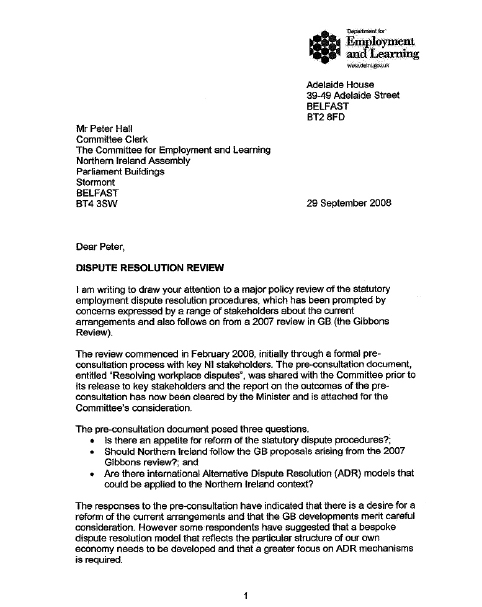
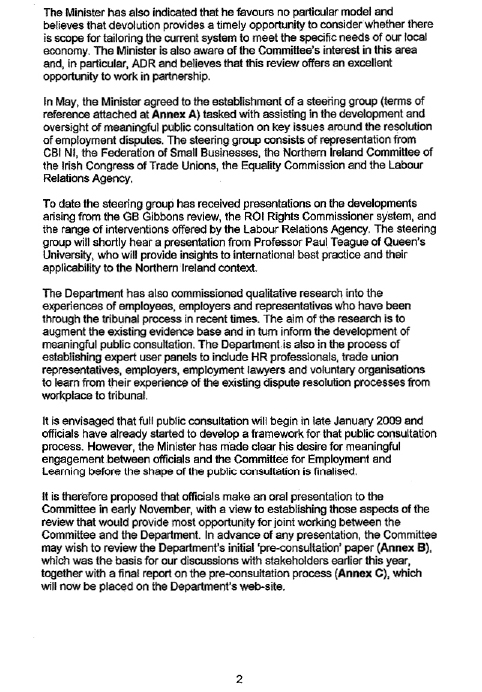
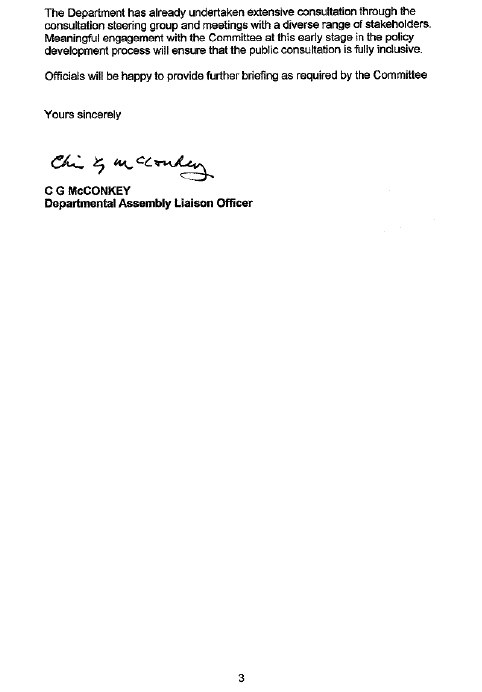
Annex A
Northern Ireland Dispute
Resolution Review
Consultation Steering Group
Terms Of Reference
The Workplace Disputes Consultation Steering Group will have oversight of both the pre-consultation and consultation phases of the NI Dispute Resolution Review. Membership of the Steering Group will be drawn from the following organisations:
- DEL
- CBI NI
- ECNI
- FSB
- LRA
- NIC ICTU
The Terms of Reference for the Group are as follows:
- Monitor progress during the pre-consultation phase
- Following the pre-consultation establish a set of guiding principles that will provide a framework for the full consultation process
- Advise on best practice examples and evidence for inclusion in the consultation document
- Work co-operatively to develop policy options and scenarios for inclusion in the document
- Assist in determining how best to target the full public consultation, including suggestions as to how it can be made accessible
- Monitor a qualitative research project to measure the attitudes of a sample of employers, employees, union and legal representatives to existing dispute resolution arrangements
- Quality assure the draft public consultation document prior to release
- Facilitate constructive public debate as part of the consultation process e.g. through consultation events, press releases, etc.
- Summarise the main views/themes arising from the consultation process.
The Steering Group will be chaired by the Department’s representative and the Department will provide the secretariat to the group.
The outputs from the project will be:
- Report on the pre-consultation
- Consultation document
- Report on the full consultation process
The Minister for Employment and Learning will be provided with the key findings drawn up on the basis of the consultation process. It will then be for the Minister, supported by his officials, to take decisions on the most appropriate policy options.
Annex B – Initial Pre-Consultation
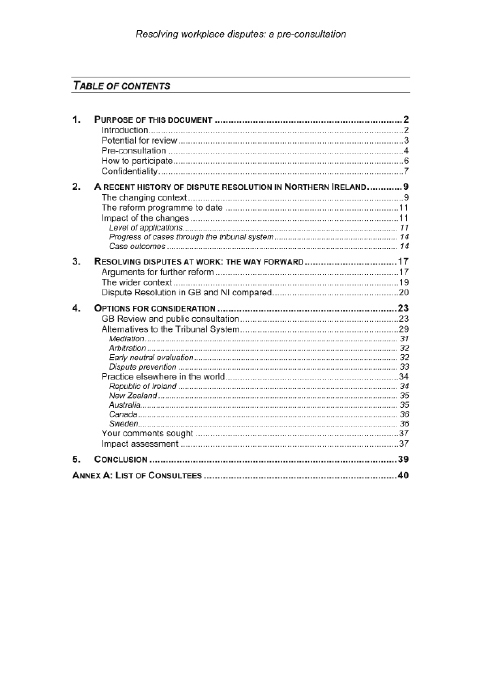
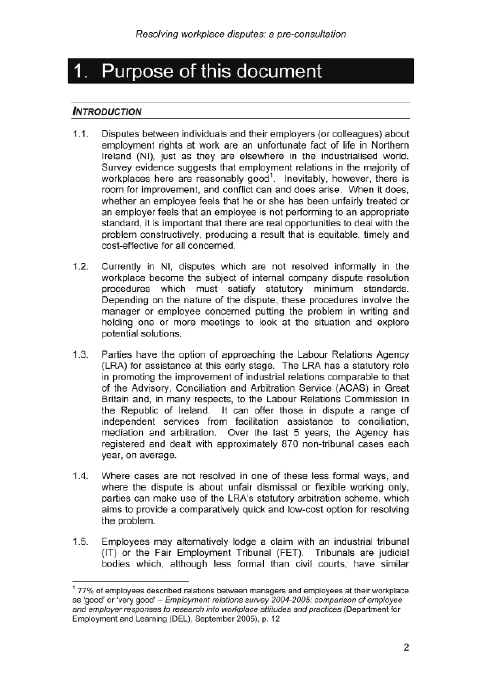
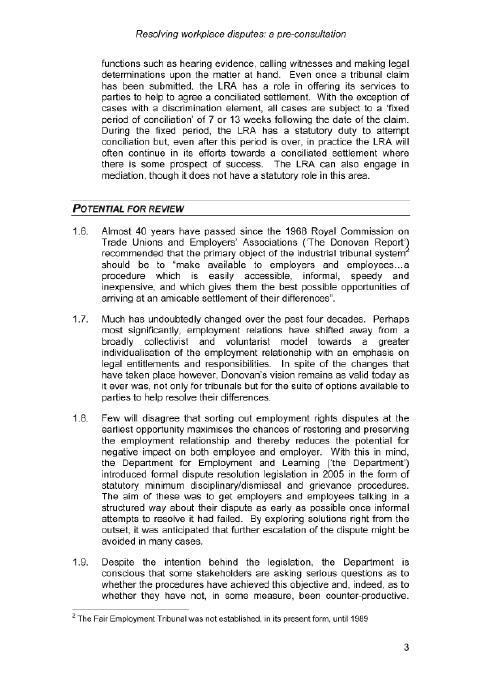
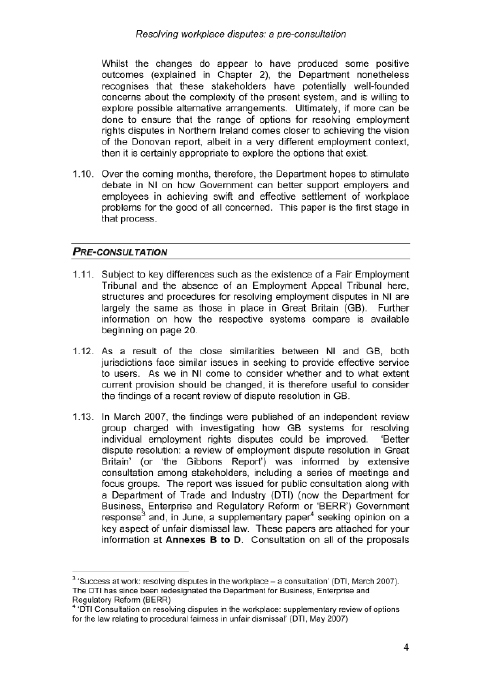
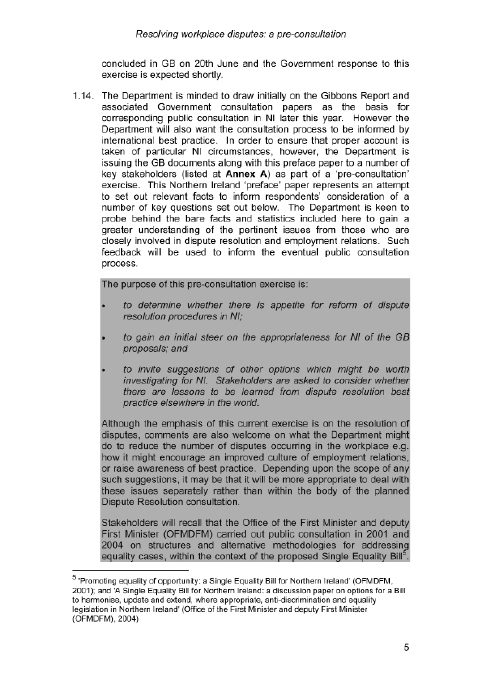
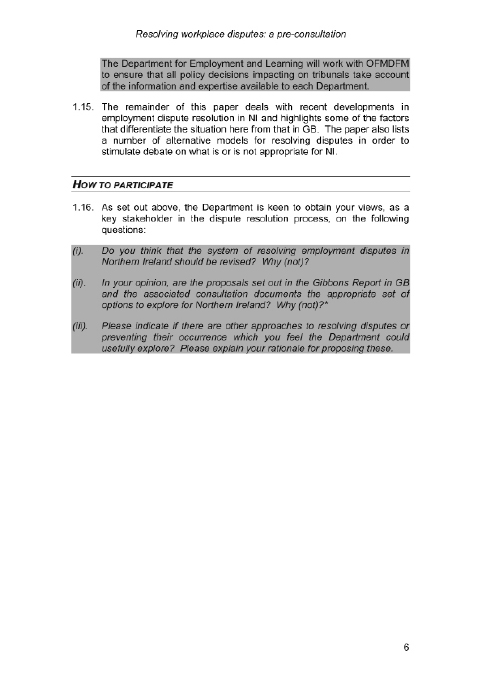
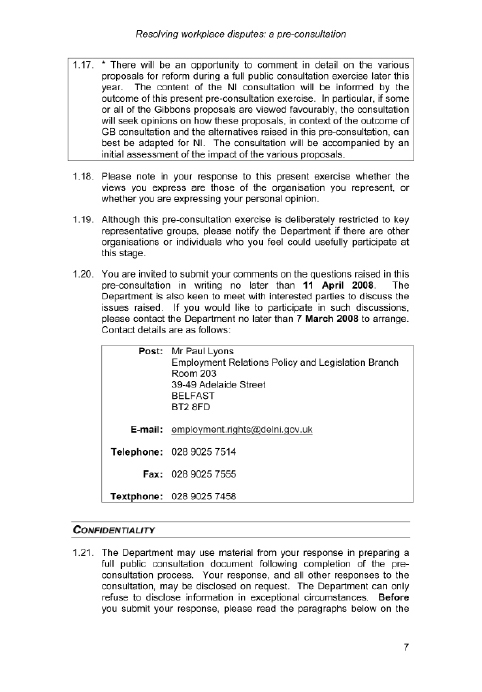
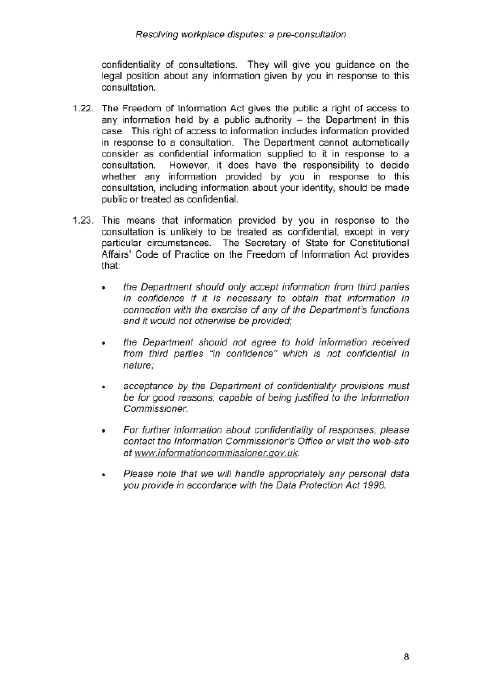
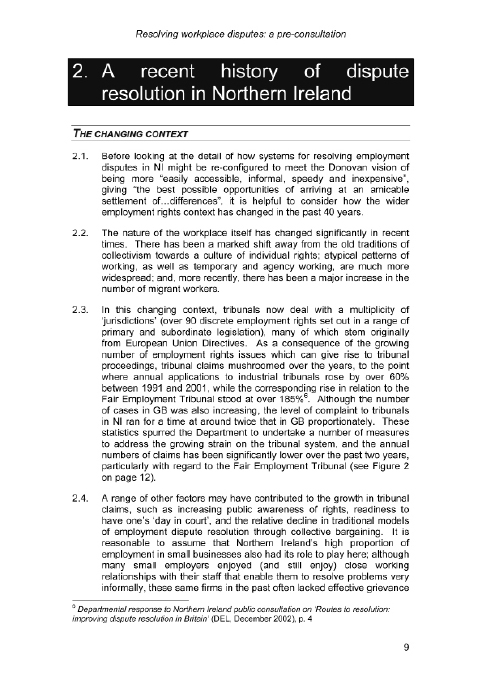
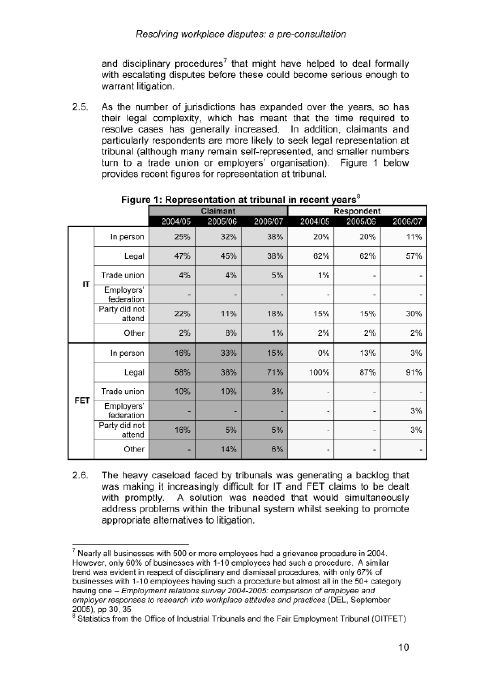
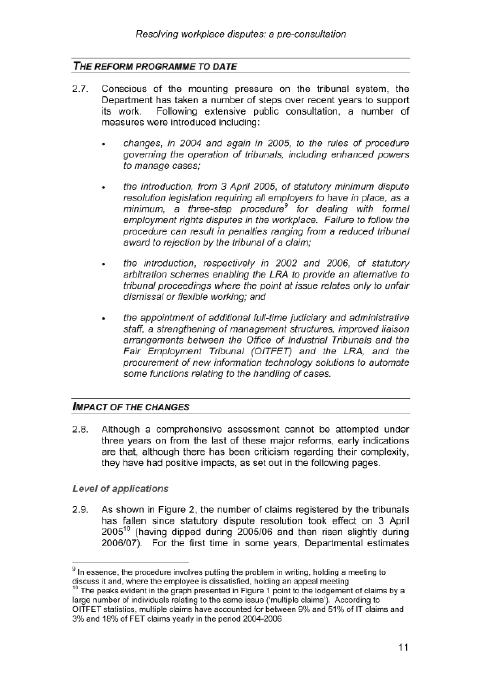
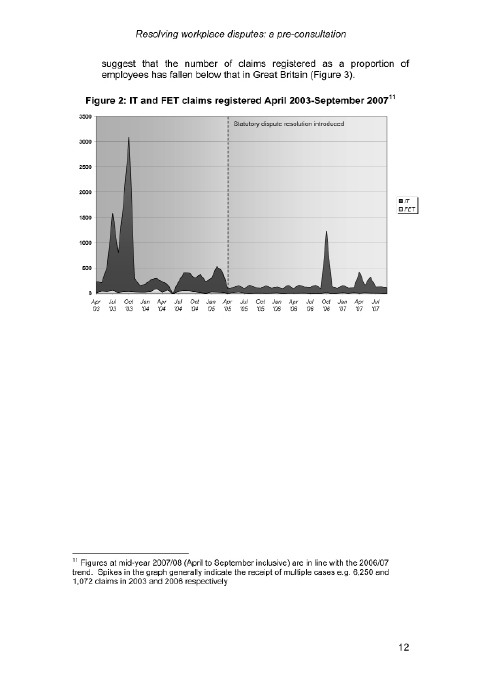
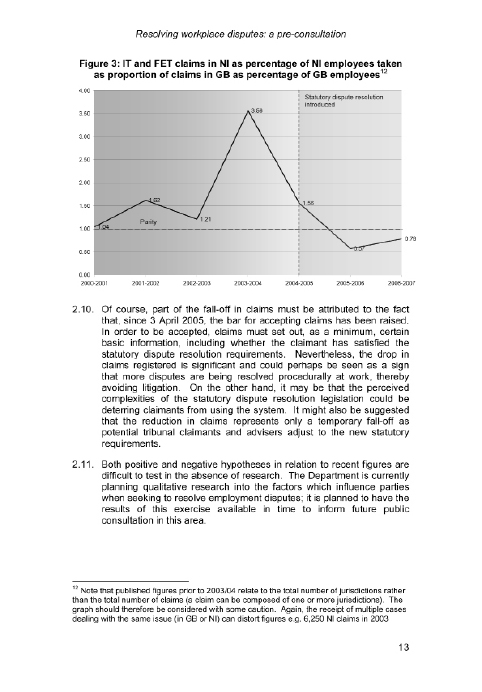
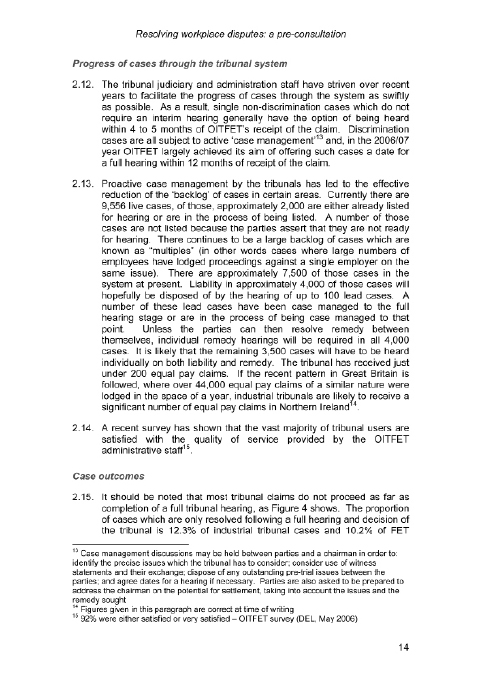
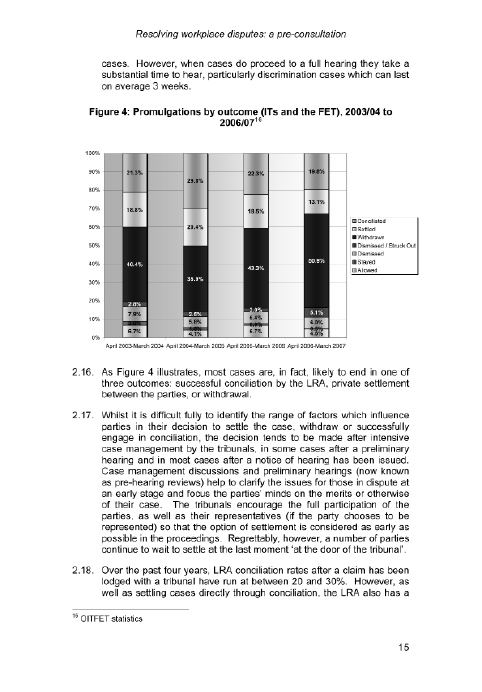
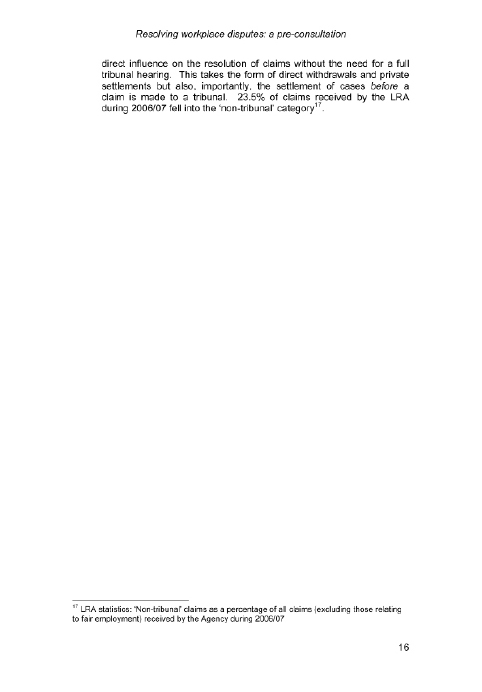
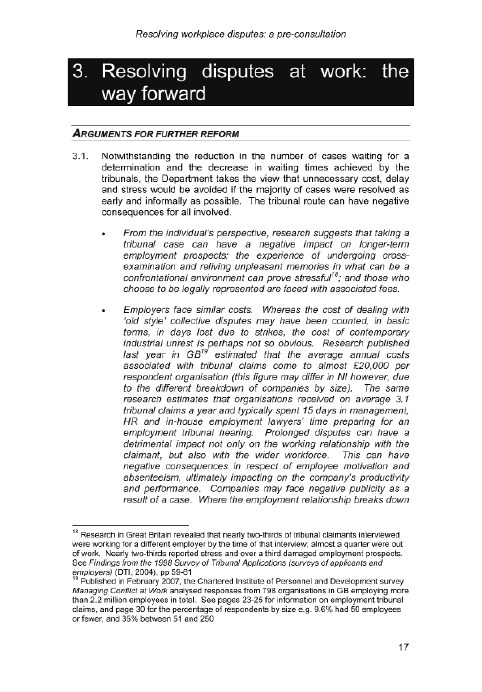
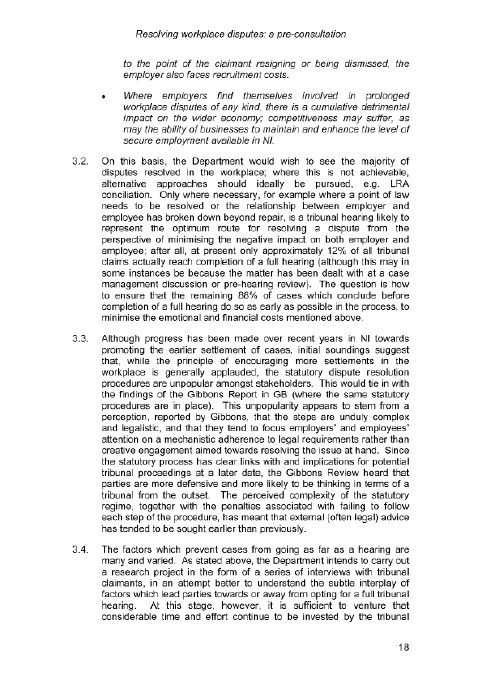
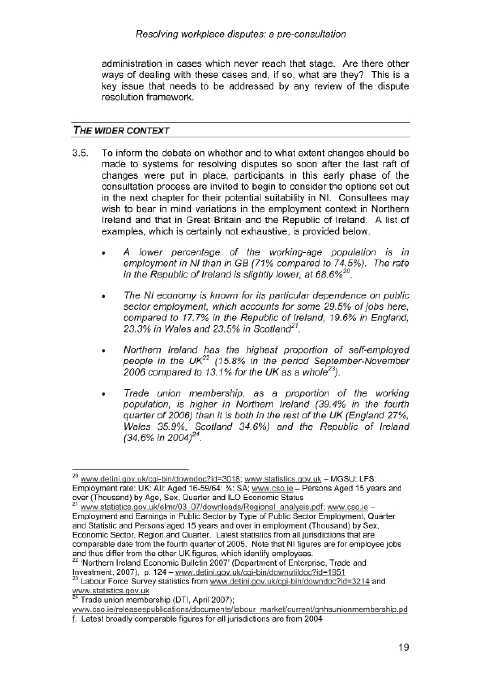
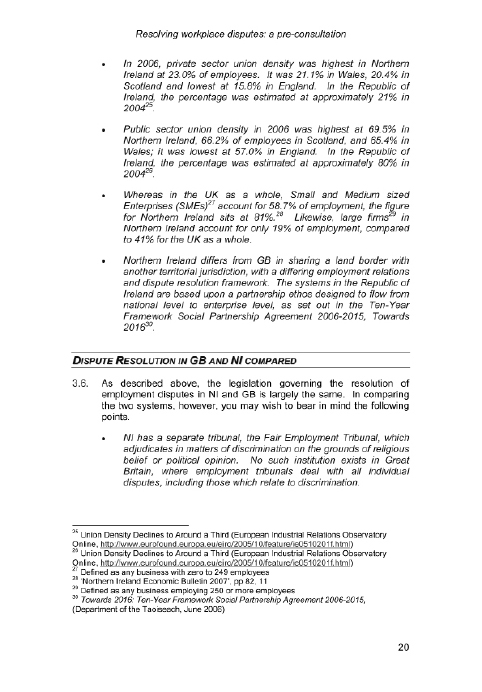
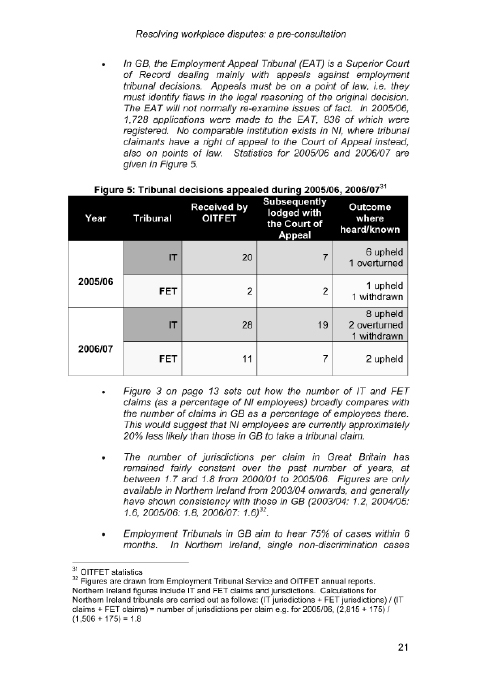
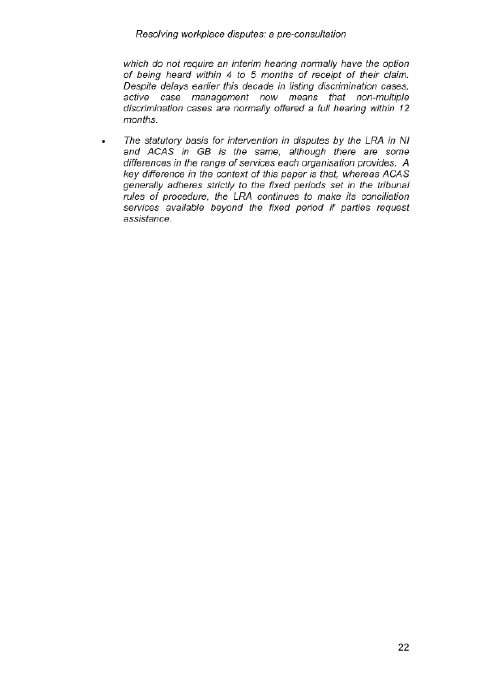
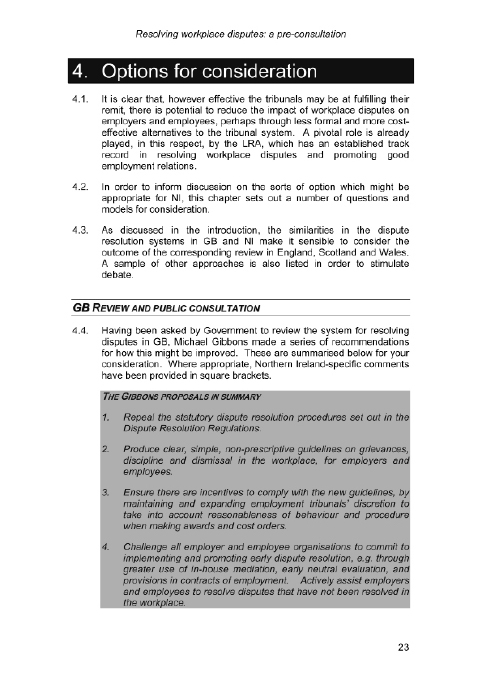
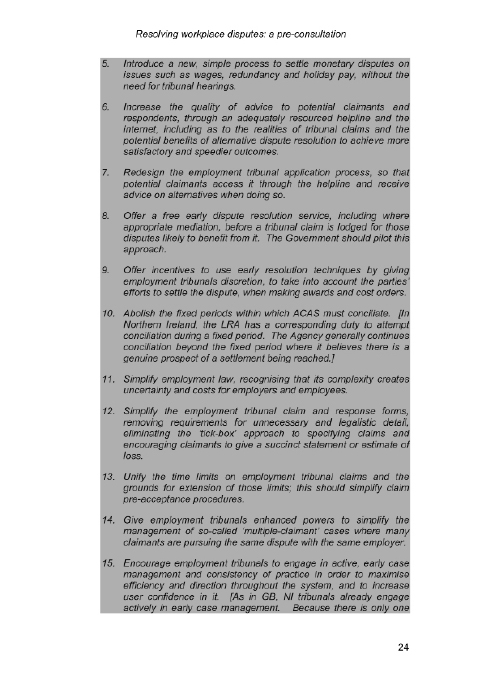
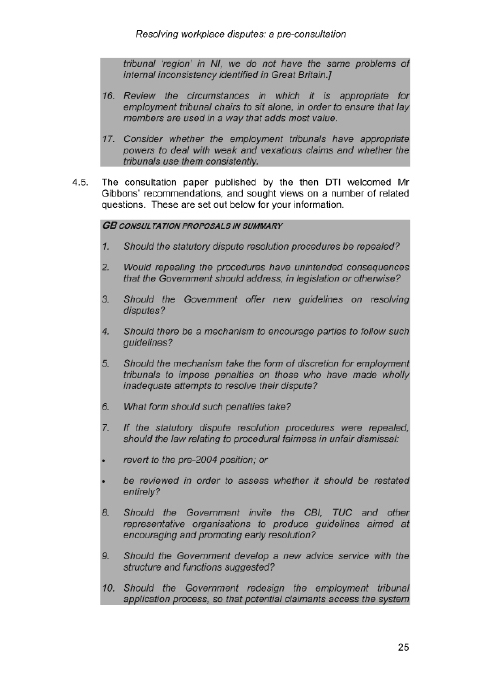
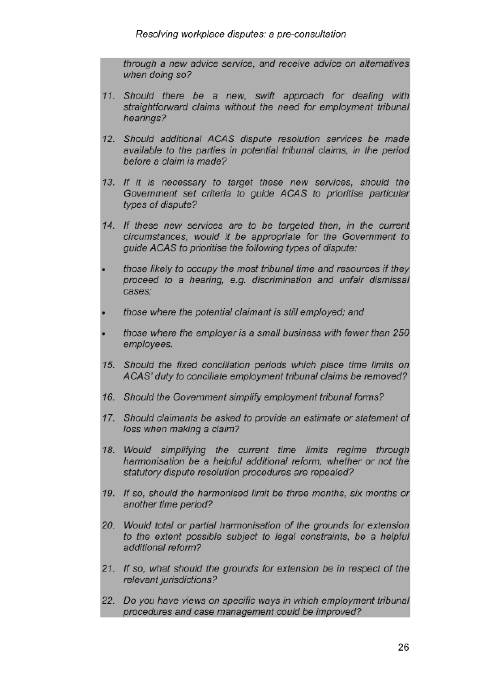
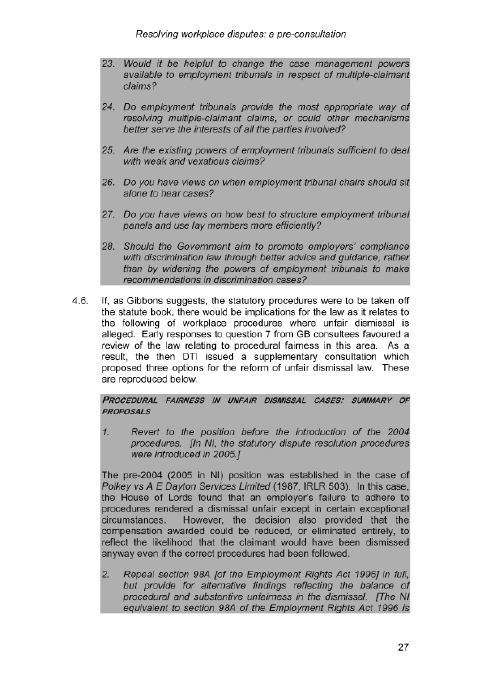
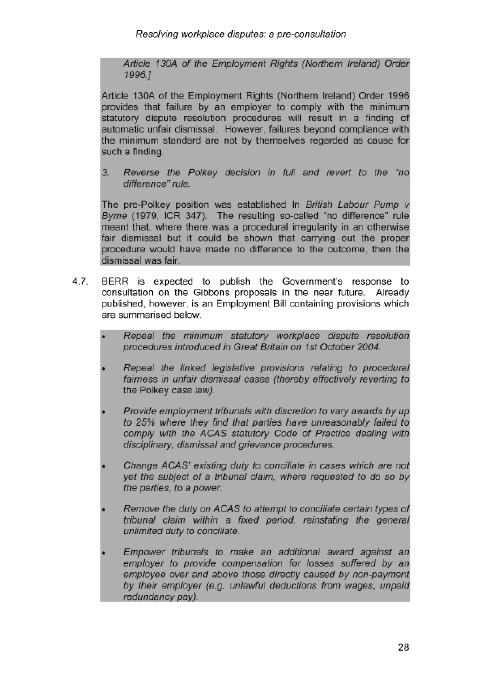
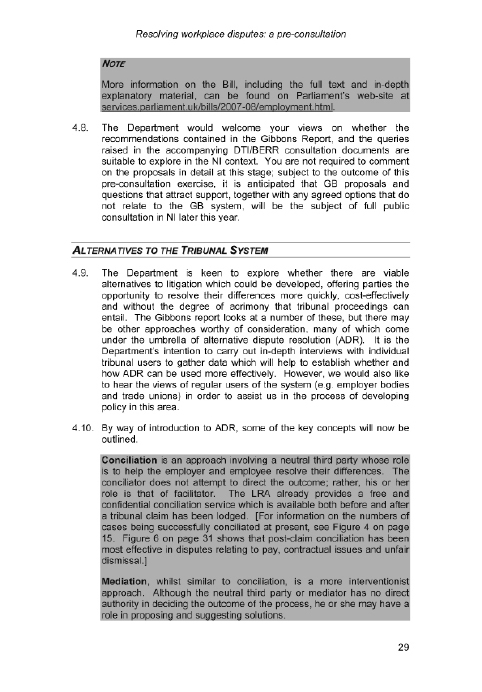
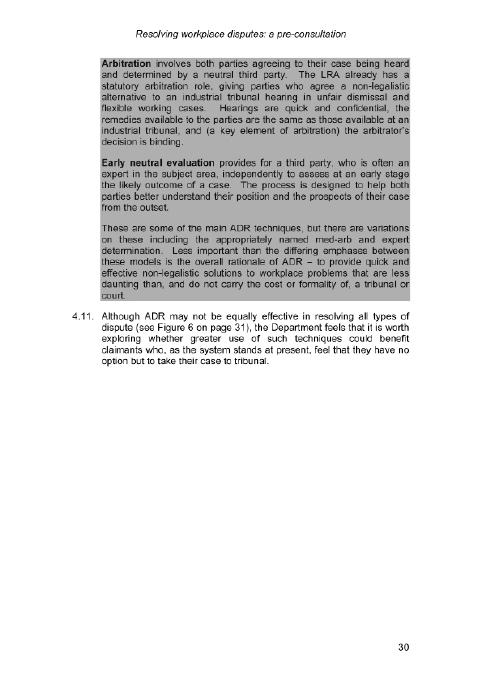
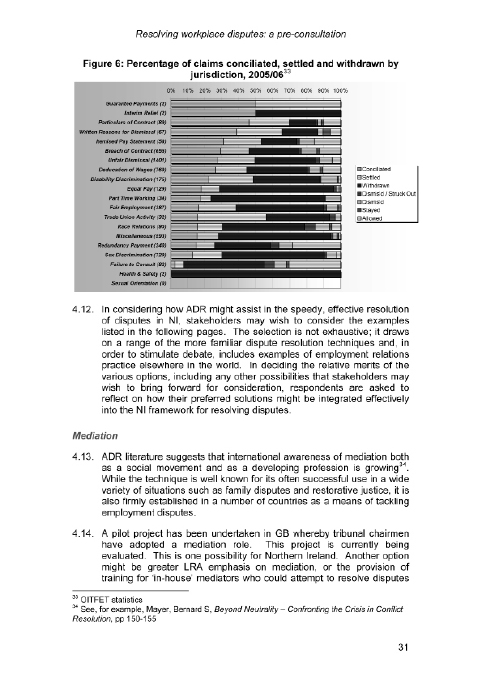
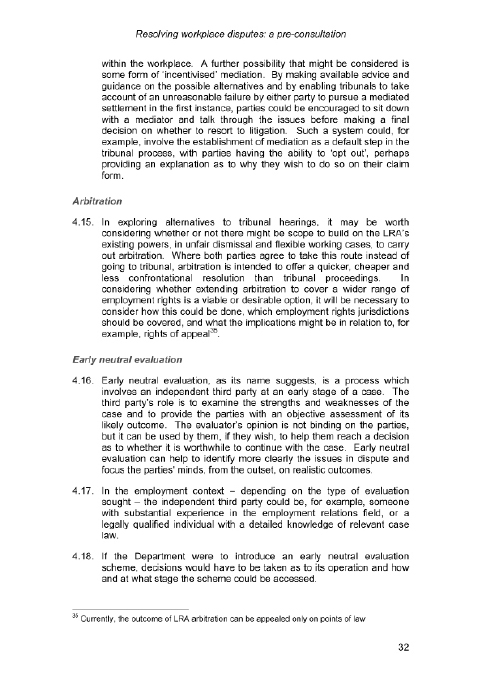
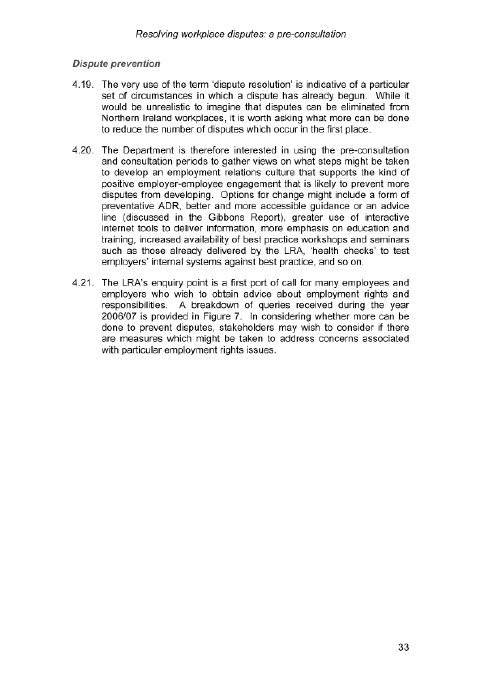
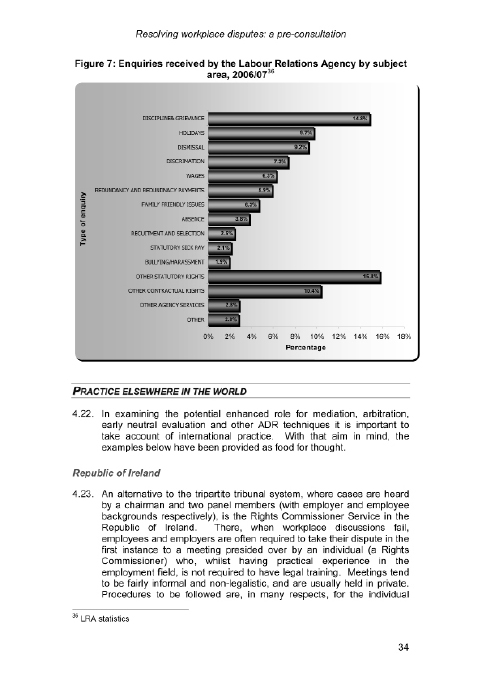
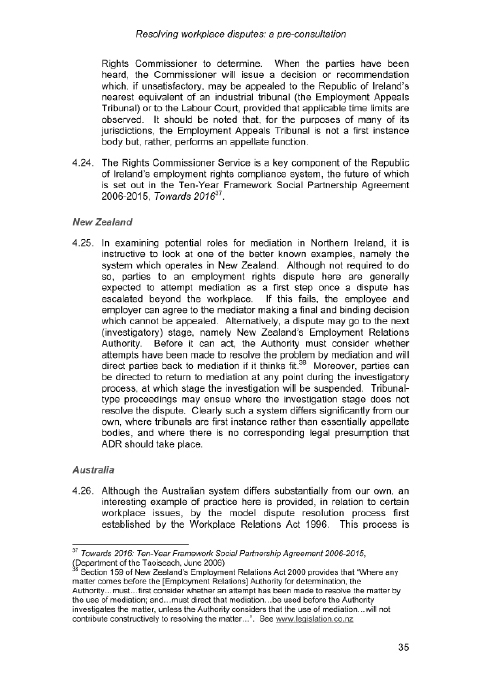
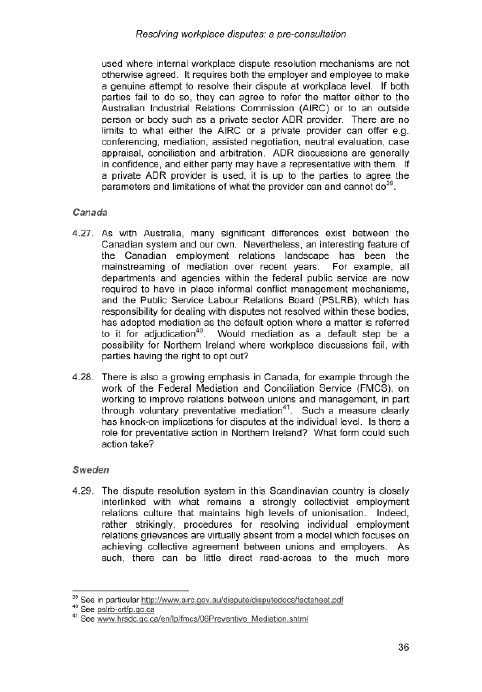
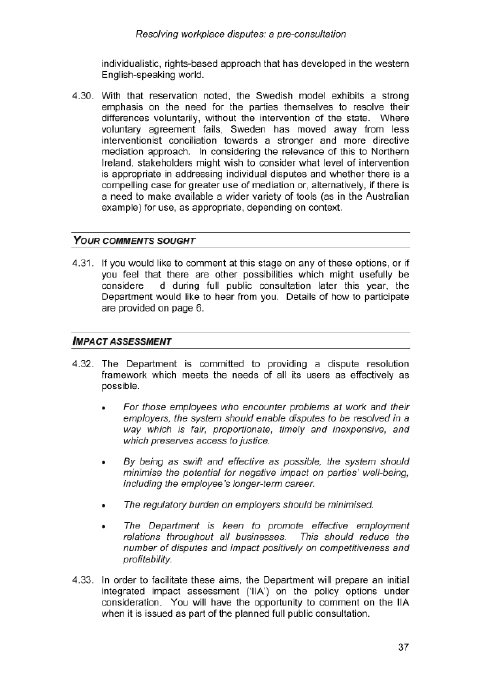

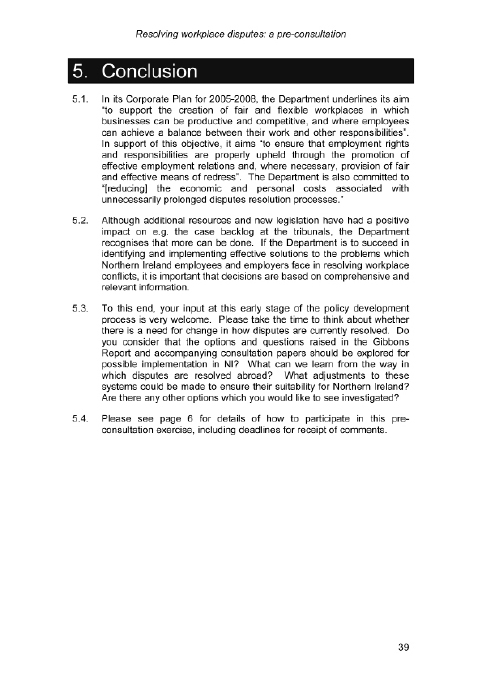
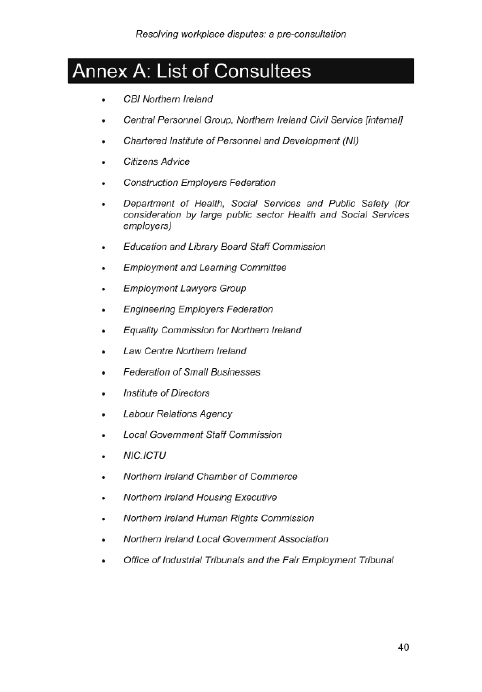

Annex C - Report on Dispute
Resolution Pre-consultation
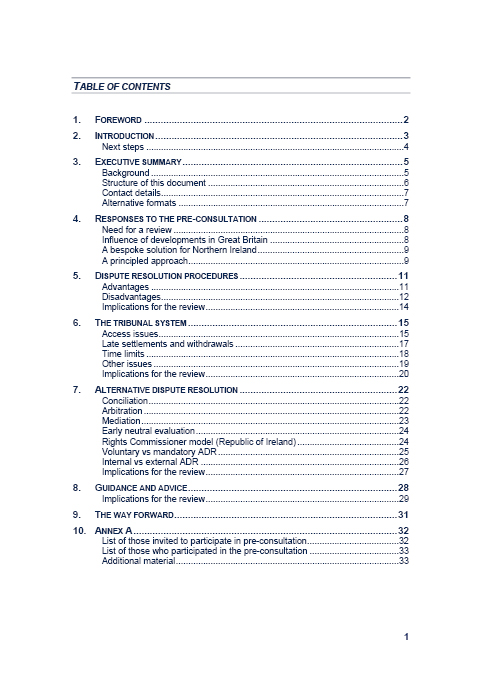
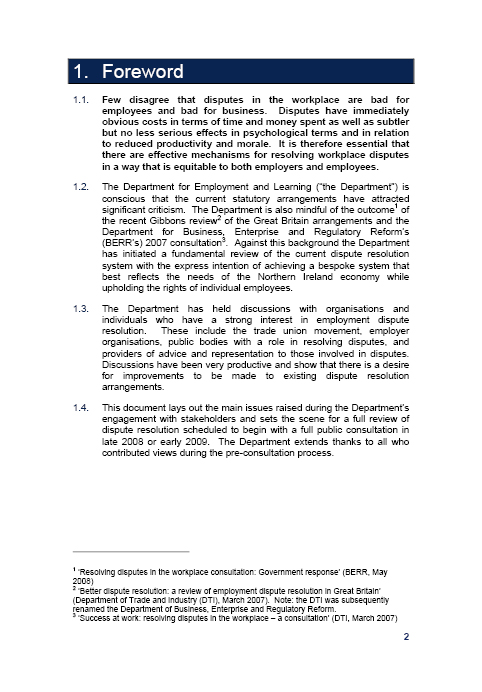
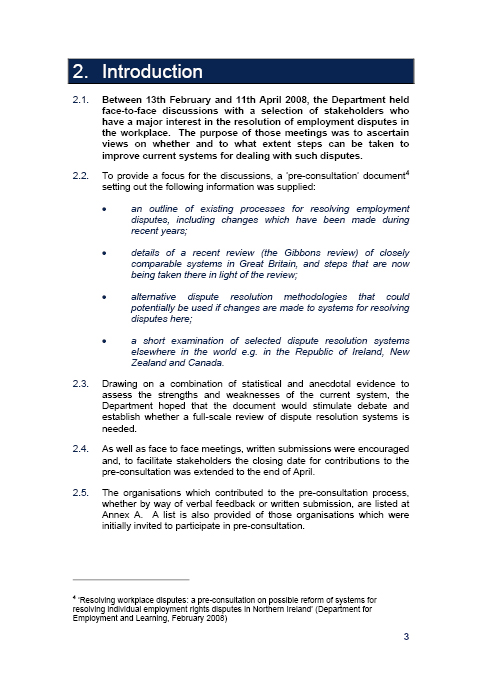
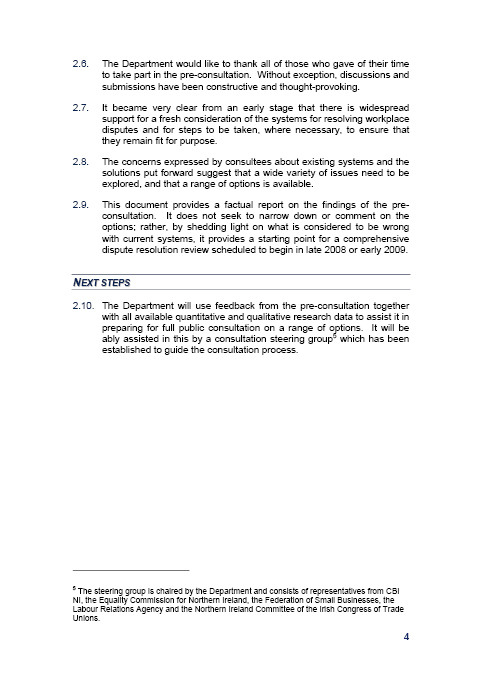
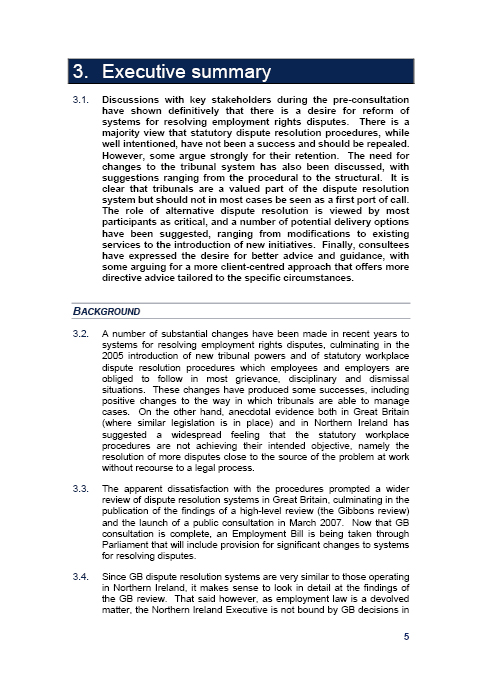
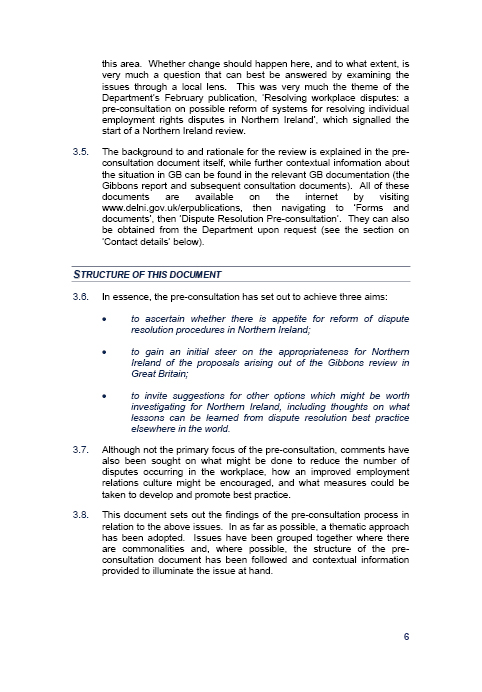
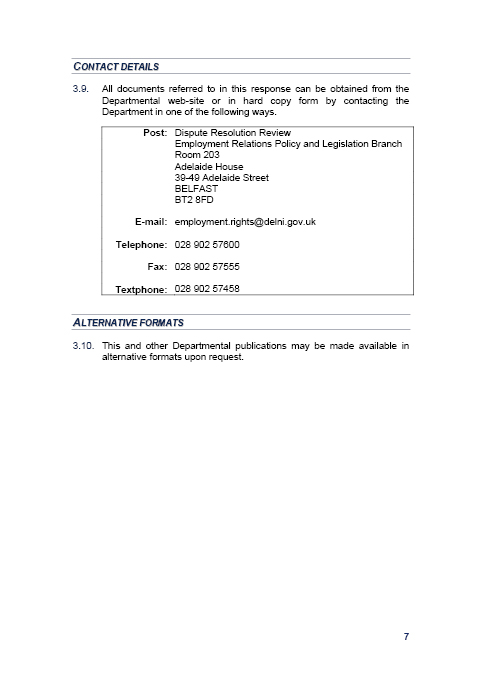
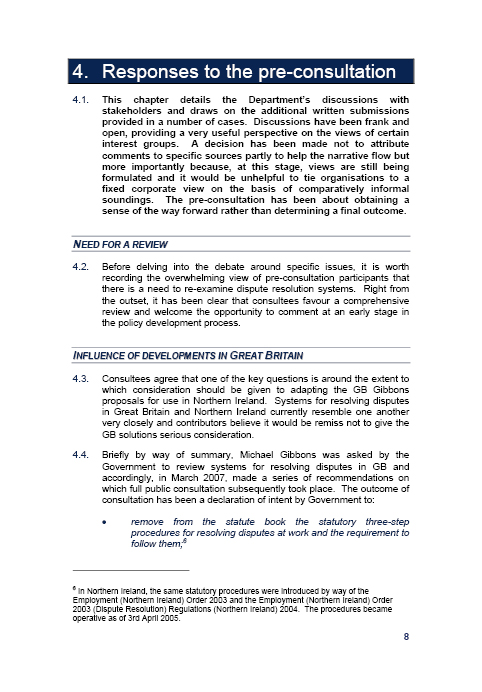
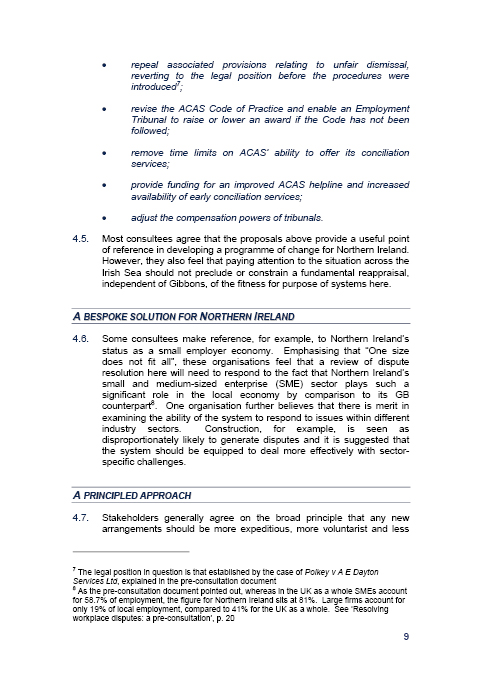
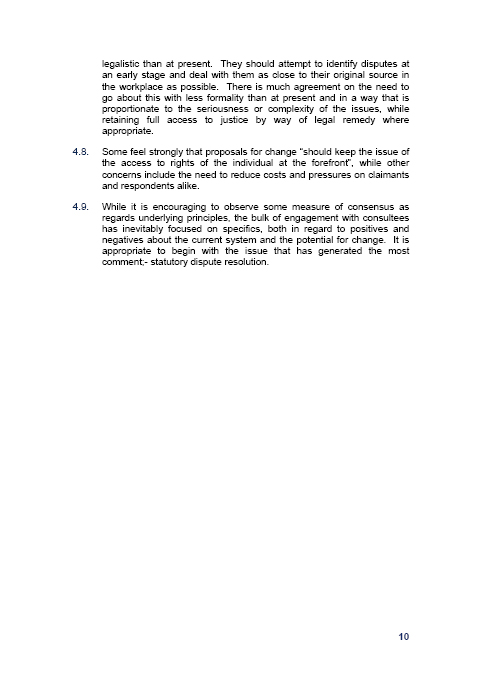
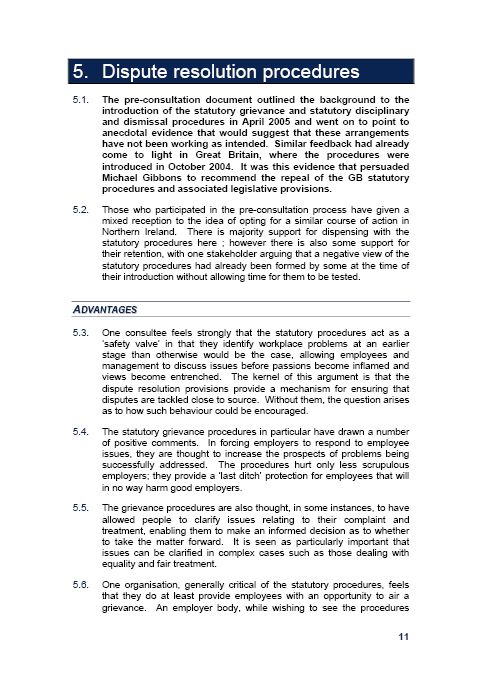
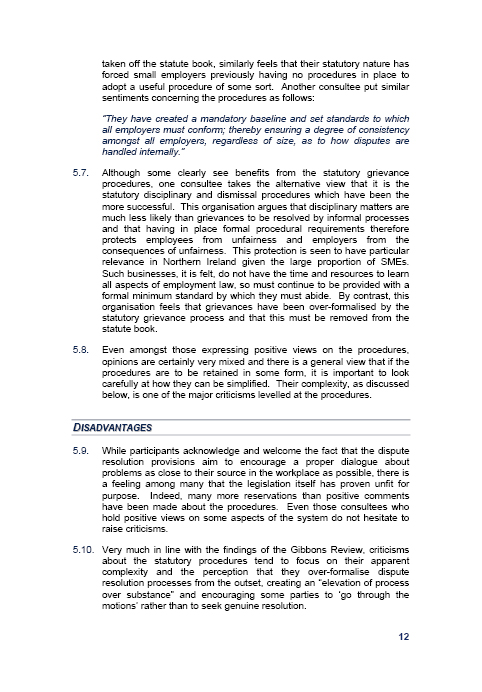
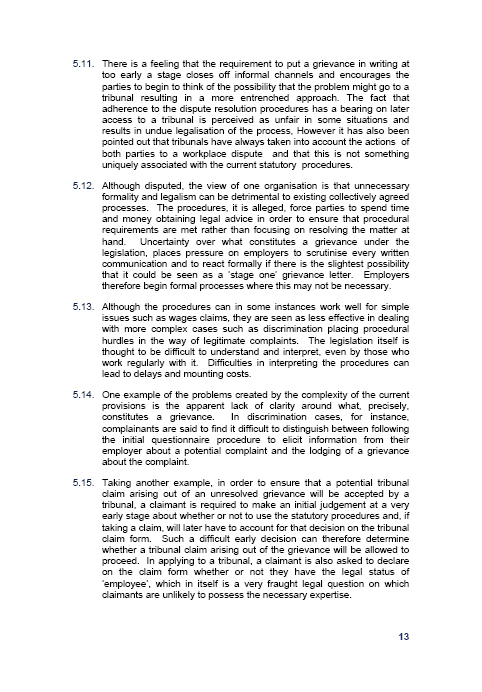
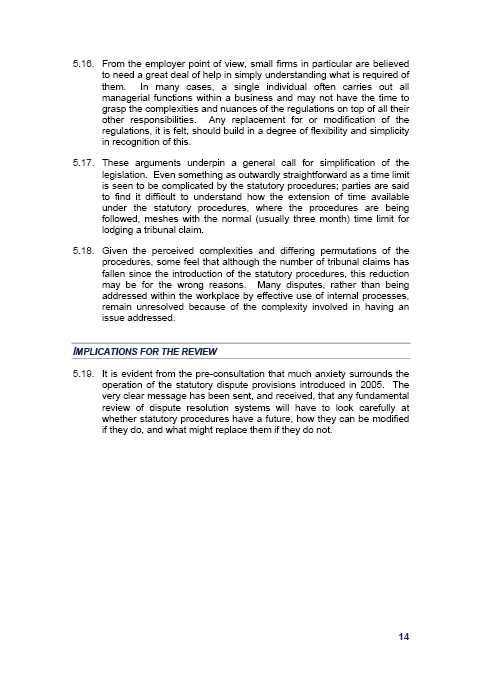
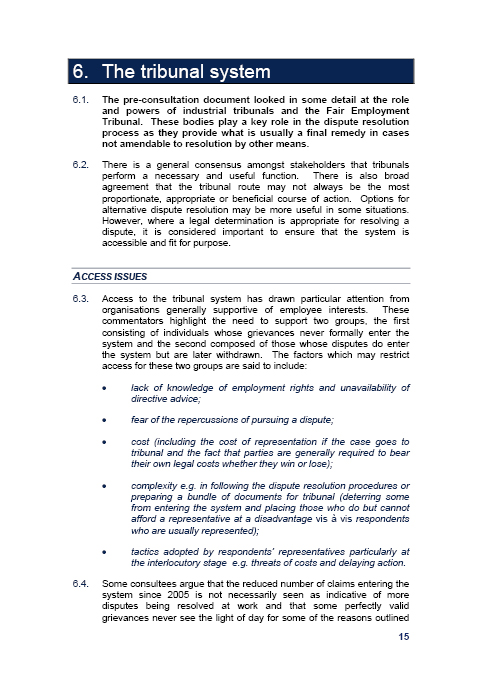
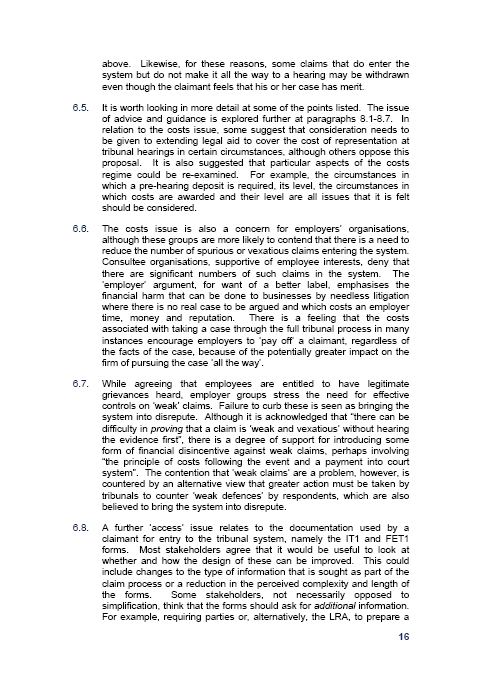
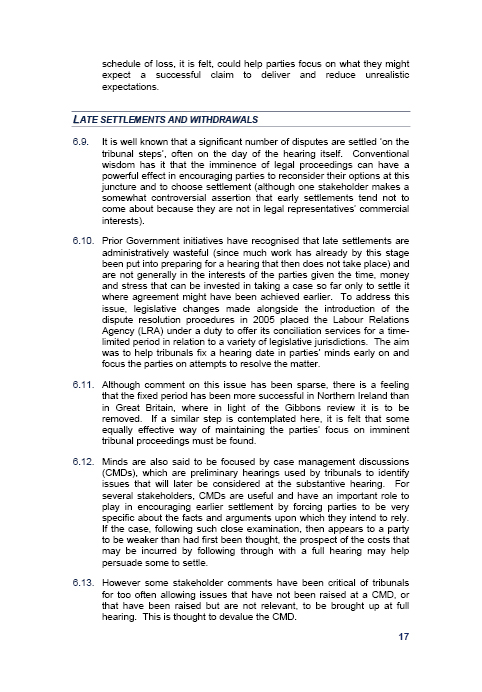
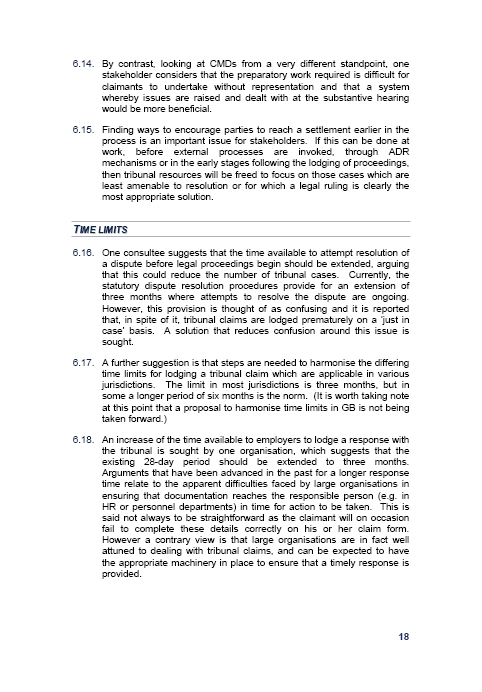
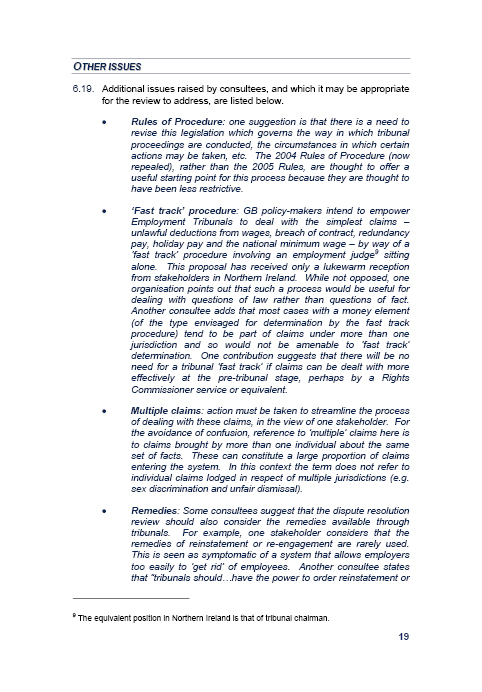
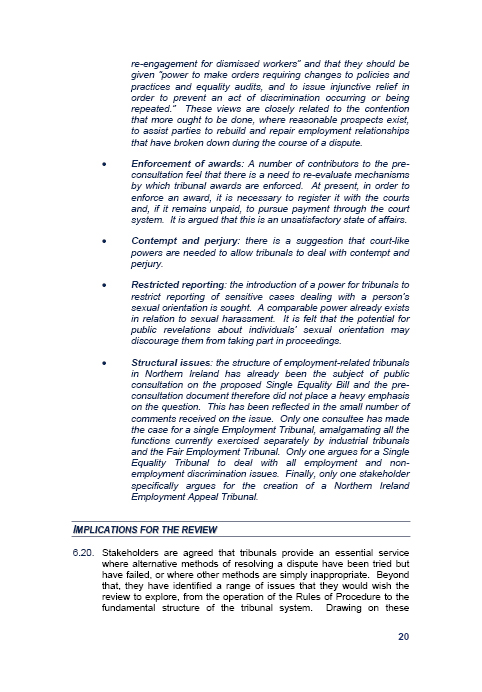

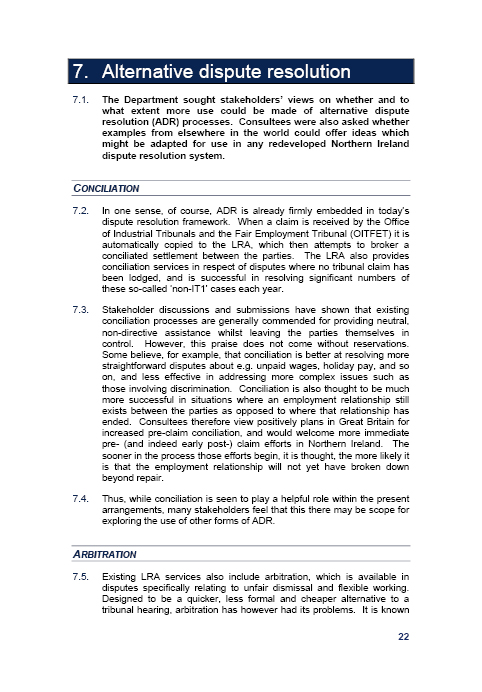
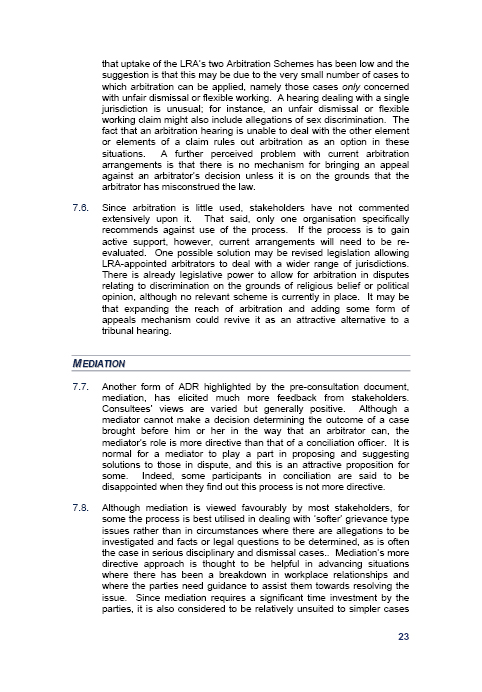
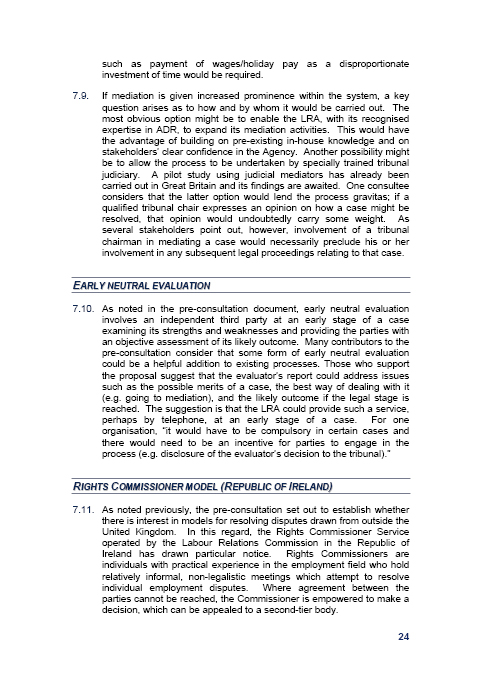
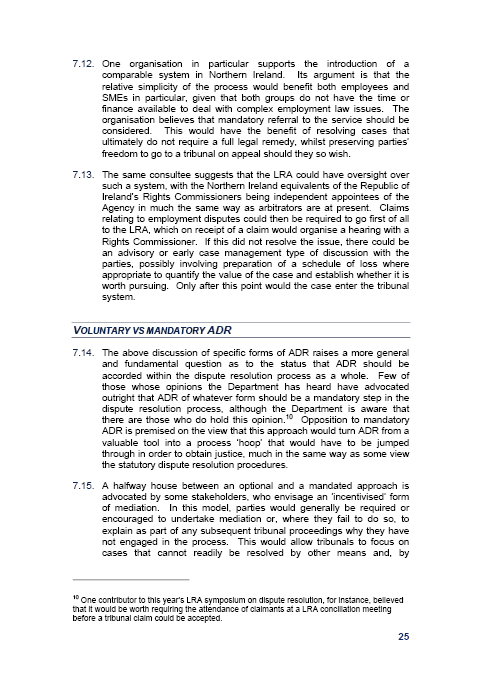
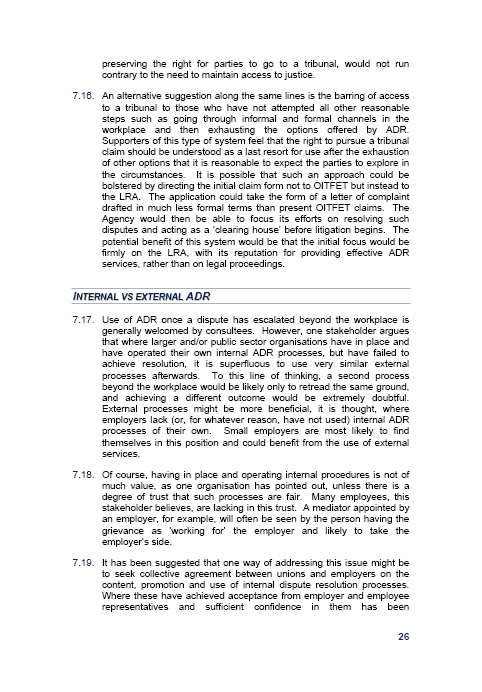
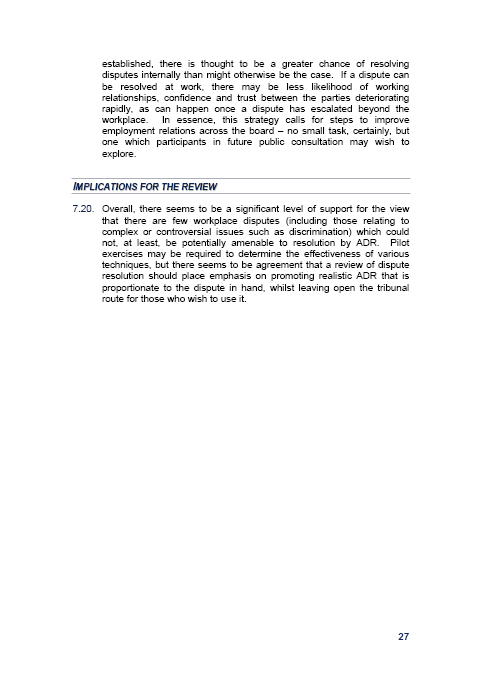
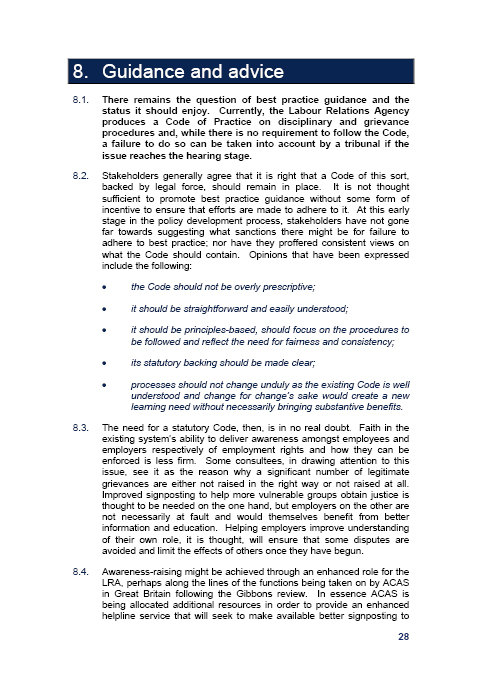
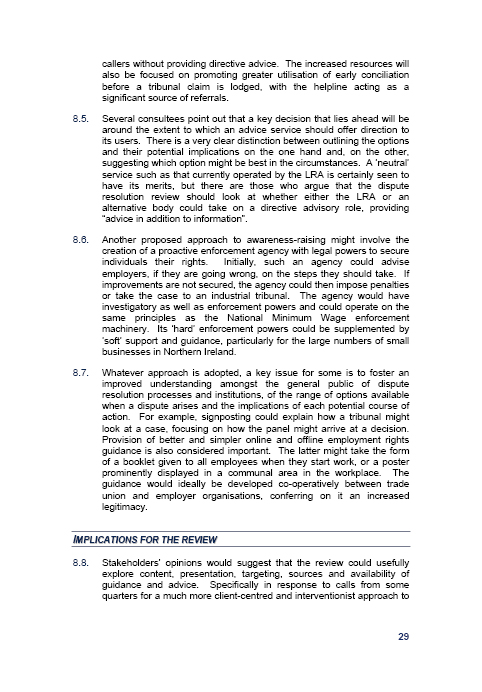

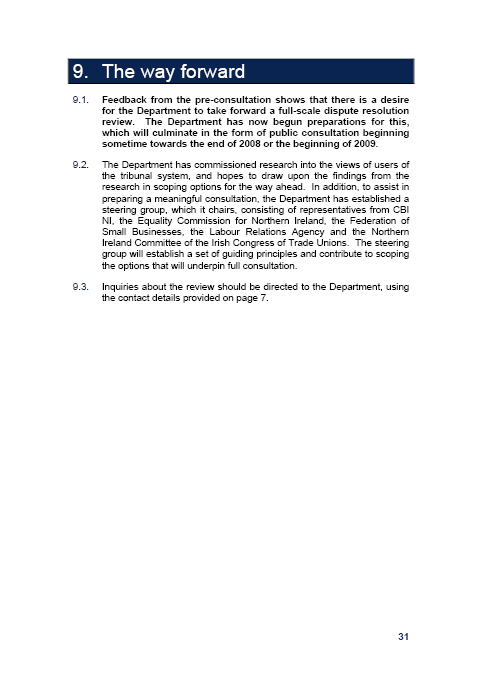
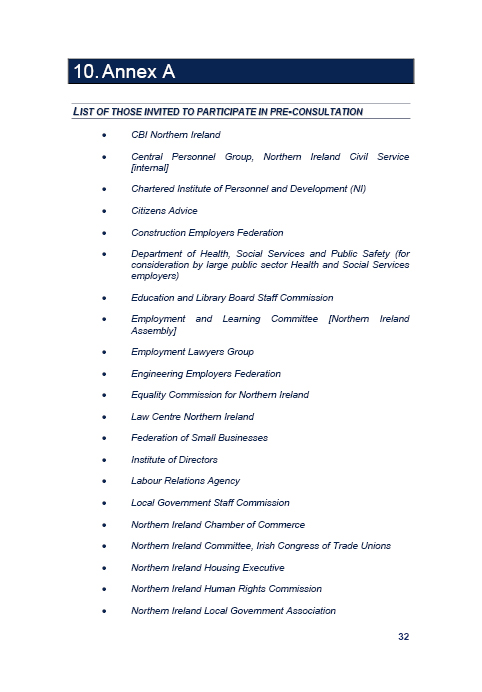
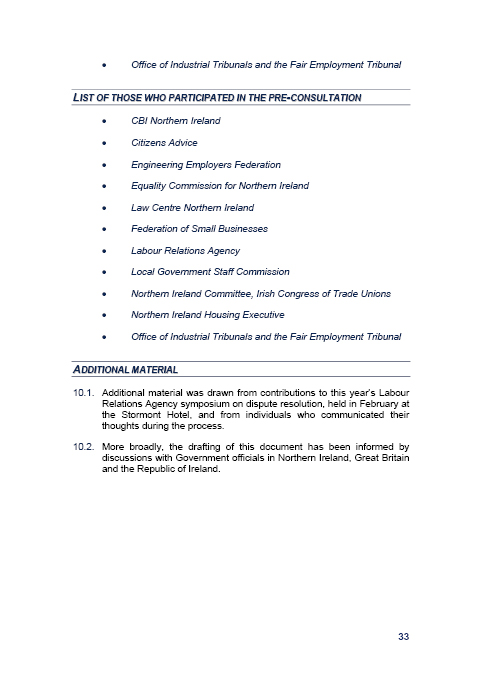
Request from the Labour Relations Agency
to brief Committee – 14 November 2008
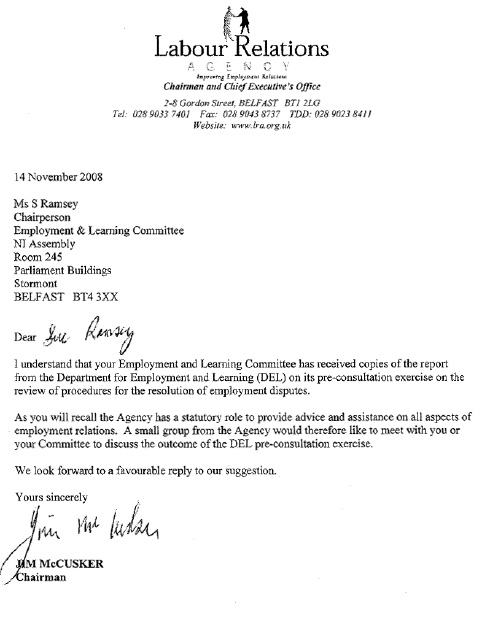
Appendix 6
Additional Papers
Paper from Bill Patterson,
Chief Executive of the Labour
Relations Agency – 1 February 2008
The Revision of Dispute Resolution Provisions in Great Britain
By Bill Patterson*
Background
In Great Britain (GB) the Employment Act 2002 (Dispute Resolution) Regulations came into force on 1October 2004. Under these regulations all employers had to have in place minimum statutory procedures for dealing with dismissal, disciplinary action and grievances in the workplace. These became known as the 1, 2, 3 Steps to dealing with dispute resolution. After a relatively short period of time concerns about the impact of the provisions were voiced by employer bodies and trades unions. In response Government commissioned a review headed by Michael Gibbons. The Gibbons Review was published in March 2007 at which point Government entered into consultation on revised dispute resolution proposals.
Government Proposals
Having undertaken consultations Government has proposed:
- The repeal of the 2004 dispute resolution regulations.
- The reversion to the situation whereby a dismissal may be found to be unfair on procedural grounds.
- A short non-prescriptive statutory Code on dispute resolution.
- Comprehensive accompanying non-statutory guidance.
- Tribunals should be allowed to adjust awards to reflect non-compliance with the statutory Code but the current costs regime should not be expanded.
- Government will continue to support the early resolution of disputes as close to source as possible and will maintain dialogue with organisations representing Human Resource professionals and mediation providers.
- It is proposed to make a significant new investment in the Advisory, Conciliation and Arbitration Service (ACAS) advice service, increasing its capacity to handle enquiries.
- The development of a short-track process within the Tribunals Service for certain jurisdictions, unlawful deductions from wages, breach of contract, redundancy pay, holiday pay and the national minimum wage.
- The expansion of early conciliation services provided by ACAS.
- All time restrictions on ACAS’s duty to conciliate are to be removed.
- Claim forms relating to the Employment Tribunal are to be simplified.
- There is no intention to harmonise time limits for tribunal claims.
- Further consultation will be undertaken with regard to the introduction of Tribunal legal officers and amendments to Tribunal rules.
- Government is not persuaded that legislative change is required for the handling of multiple-claimant claims.
- *Bill Patterson is Chief Executive of the Labour Relations Agency
- Government believes that the powers of Tribunals to deal with weak and vexatious claims are sufficient.
- No changes are proposed in respect of the role of lay members of Tribunals.
- Government believes that employers’ compliance with discrimination law is better promoted through better advice and guidance than by widening Tribunal powers.
The GB Employment Bill 2007
Those aspects of Government proposals that require legislation are being introduced through the Employment Bill 2007 which had its first reading on 6 December 2007 with the aim of receiving Royal Assent by summer 2008. It is expected that the dispute resolution aspects of the Bill will come into force in GB in April 2009. The Bill does not apply to Northern Ireland (NI) as the NI Assembly, uniquely within the United Kingdom, has the power to determine its own employment legislation.
Developments in NI
The Department for Employment and Learning (DEL) intends to undertake a pre-consultation exercise on dispute resolution arrangements in NI. The aim of the pre-consultation exercise is to determine whether or not there is an appetite for change in NI. It will be undertaken over an eight week period commencing in late January or early February 2008. The steering group for the pre-consultation exercise will be chaired by DEL and involve representatives from the Labour Relations Agency and the Tribunals. Subject to the outcome of the pre-consultation exercise the NI Assembly may undertake a review of dispute resolution arrangements in NI.
Principles for Effective Dispute Resolution
In seeking to improve the system for workplace dispute resolution in NI a number of basic principles can be taken into account.
- The need for multiple channels for the resolution of disputes both inside and outside the workplace.
- Balance between the resolution of disputes at source and supporting the exercise of employment rights.
- The use of soft (advice and guidelines) and hard (legislation and codes) means of regulation.
- Recognising the interdependence of dispute prevention and resolution processes.
- The need for trouble shooting arrangements both internal and external to the workplace.
- The involvement of all stakeholders in the development of the NI system.
- The promotion of an employment relations culture that is consistent with a bias to mutual gains, integrative bargaining, joint working and collaborative problem solving.
- Commitment and demonstrated support at regional, sector and workplace levels for the diffusion of alternative dispute resolution processes.
A Learning Network
Not all good practice in workplace dispute resolution can derive from either top - down or bottom - up processes. There is a lot to be gained from the transfer of learning between the public, private and voluntary sectors, between unionised and non-unionised workplaces and between large and small firms.
Conflict is stressful. We tend to avoid dealing with it until it is too late for informal resolution. Confidence, patience and compromise with a real commitment to fairness lie at the heart of resolving differences. The principles and processes of dispute resolution can be taught but seeing a solution and feeling one’s way through to a resolution are two different processes. It is one thing to see a potential result, quite another to establish a sound basis for the restoration of good working relations. This is where, in the long term, the real personal and economic benefits lie.
Pre-Consultation response from the
Law Centre (NI) – April 2008

Resolving Workplace Disputes
Law Centre (NI) Pre-Consultation Response
April 2008
Law Centre®
Law Centre (NI) Pre-Consultation Response
1 Introduction
1.1 Law Centre (NI) welcomes the opportunity to comment on this pre-consultation paper. In this response we identify those areas where our experience suggests the current system works well, those areas that work less well and the problems the consultation could address.
1.2 We would accept that the current grievance procedure is overly complex and in need of reform. There are compelling reasons, however, for the retention of the statutory disciplinary process in Northern Ireland. Principal among these is that Northern Ireland has a significantly higher proportion of small businesses relative to the rest of Britain for whom the statutory disciplinary procedure provides welcome clarity as to their legal obligations in this area. It would be a mistake to adopt wholesale the proposals put in place by the Department for Business Enterprise and Regulation Great Britain.
2 Access to Justice – the Need for Advice and Representation
2.1 We welcome the fact that DEL is prepared to look at the wider issue of the problems in the system that currently limit access to justice for claimants. The proposal to fund a research project looking to understand what happens to cases in the system is a good one and the Department is right to focus on the experiences of claimants. We would encourage the Department to explore those factors that, in our experience, discourage claimants from pursuing access to justice.
2.2 One significant barrier to justice is the policy focus on vexatious litigation. We would accept there will always be vexatious cases; our experience is that the number is very small. For this reason, we feel using this issue as a main driver of policy, rather than aiming to increase the number of meritorious cases being taken to completion, acts as a barrier to accessing justice and is an inappropriate driver of policy. Many meritorious claims are not brought to hearing, are abandoned, or are settled for a reduced sum due to the lack of proper representation. This should be a stronger driver of policy.
2.3 Much of the current thinking on possible reform for resolving employment rights disputes focuses on streamlining the system and reducing the burden on Tribunals. This approach tends to ignore one of the main root causes of disruption and delay in the system; claimants who cannot afford proper advice (which cannot be provided by a general LRA advice service) or legal representation.
2.4 Reform of the system for resolving employment disputes should keep the issue of the access to rights of the individual at the forefront. Our experience is that the system deters many individuals with valid claims from pursuing their cases. We are concerned that the high numbers of settlements and withdrawals of cases are due largely to the built-in barriers within the system and a wide-ranging research project could confirm this. These include: the adversarial nature of the Industrial Tribunal; the lack of partial advice; the legal complexity of the Tribunal process; the high cost of representation; the way the system appears to favour the represented parties who are more likely to be legally represented, which in the majority of cases, is the employer and the measures taken by respondents’ legal representatives, such as costs threats and delaying action.
2.5 There is a great need for the provision of dedicated and detailed advice to allow individuals to more accurately judge whether they should proceed with a case. The need becomes acute when it comes to representation before the Tribunal. The recommendation in the Gibbons Review of setting up a government funded impartial advice provider for those involved in Tribunal cases is welcome, but what is really needed is the establishment of a system of independent partial advice that would be able to inform a claimant whether he/she had grounds for advancing a case.
2.6 The lack of sufficient specialist tribunal representation units or Legal Aid for Industrial Tribunal cases precludes access to legal representation for many claimants. Even traditional sources of assistance are disappearing. The increasing complexity of employment law and the formality of the Tribunal procedures mean that trade union representatives, CAB advisors and other free advice centres have now become more and more reluctant to take on Industrial Tribunal claims. The outlook for claimants in need of representation is getting steadily worse.
2.7 The costs regime of the Tribunal that requires parties to pay their own legal costs win or lose also discourages claimants from pursuing their case.
2.8 To illustrate some of the difficulties in the current system we believe it would be helpful to consider the experience of a typical claimant trying to bring a case to Tribunal:
- The first point of call for someone who believes he or she has an employment case is likely to be a solicitor. The claimant will be advised that there is no Legal Aid for cases before the Industrial tribunal.
- The claimant must then consider whether she or he can afford to pay the solicitor themselves. The solicitor will generally require a substantial lump sum payment up front, which many prospective claimants – who may just have lost their job and be in financial jeopardy anyway – cannot afford.
- The solicitor should advise that their legal fees will have to be paid, win or lose. These fees are, given the lengthy nature of Tribunal hearings, likely to run into thousands of pounds. In many cases the fees are going to be more than the case is worth, or would eat up such a large proportion of any potential award that it wouldn’t be worthwhile. Most claimants, unless highly paid or wealthy, will find solicitors fees out of their reach.
- For most, the only realistic option is therefore to try and secure voluntary sector representation or go it alone. Voluntary sector representation is extremely limited being effectively confined to the Law Centre. At this stage many people are likely to give up, feeling that they aren’t going to be able to manage and that they have little chance of success on their own. For someone without experience of courts and legal knowledge the prospect is daunting. They are also undoubtedly correct to feel that, as unrepresented claimants, they now have a lower chance of success.
- Claimants who go on to lodge proceedings often make errors in drafting or framing their complaint due to lack of representation. This can ultimately lead to considerable waste of Tribunal time in resolution.
- At this stage the claimant will start to receive legal correspondence from the employer’s solicitor. This will very often commence with a letter giving the opinion that the claim is misconceived, unreasonable, and has no prospect of success (irrespective of the actual merits). The claimant will be warned (or threatened) that if they proceed the other side will apply for legal costs. The prospect of another legal bill has a chilling impact on the claimant. Many will be scared into withdrawal.
- The claimant may look to the LRA for advice, but the conciliation officer is bound to be neutral and can’t give the advice tailored to the claimant’s needs.
- Next the claimant will receive legal demands from the solicitor for Further Information and Discovery. These will be lengthy and detailed, full of subsidiary clauses, and framed in opaque legalistic language. The claimant will be required to identify and deconstruct complex legal and factual issues. To another lawyer this might make sense, but the layperson will find this very difficult to understand and feel incapable of dealing with it. Once again, claimants are intimidated and left feeling overmatched.
- The claimant who persists and tries to answer the interlocutory requests often, understandably, fails to address them properly or gives an incomplete response. The employer’s solicitor will then refer the matter to the Tribunal seeking an Order that the claimant comply. The claimant, who may be trying his or her best without legal advice, is then at peril of costs being awarded against him or her, because an extra hearing is necessary, and under even more pressure.
- For those who persist despite all of the above, the prospect of having to go into court and run the case themselves can eventually prove too much for non-lawyers. They will come under pressure before the hearing to withdraw or to accept a nuisance settlement, for example £500 “to go away".
- The employer’s solicitors are often happy to let meritorious cases drag on like this right up to the door of the Tribunal, confident that many claimants will eventually lose heart, feeling that the deck is stacked overwhelmingly against them.
- The unrepresented claimant who goes on to run their own case is certainly brave, and sometimes foolish. It is readily apparent that there will be a significantly decreased chance of success due to inequality of arms. The Tribunal is, as an impartial body, limited in what it can do to redress the balance, (the supposed “over-riding objective" notwithstanding).
2.9 On this analysis, which is informed by our experience as one of the few sources of legal advice for claimants, many meritorious claims are being hindered and not pursued because of defects in the system. The high number of withdrawals shown by the statistics should not be seen as a success, but rather as a reflection of the inherent unfriendliness of the current system for Claimants. We believe that research into the experience of Tribunal users would bear this out.
2.10 Those that do proceed to Tribunal and fail risk being labelled as vexatious. Many of the so-called “vexatious litigants" are the product of the workings of the system described above. They have a genuine sense of grievance, but they are deprived of the legal advice they need to appreciate the merits of their case, and then penalised by costs orders for that lack of understanding. This is manifestly unfair.
2.11 If proper provision of dedicated partial advice and representation were to be put in place, then the use of punitive powers would be more proportionate and justifiable. If a person has had proper legal advice and chooses to go forward against that advice, then, they may be behaving in a genuinely vexatious manner.
2.12 It is our experience that claimants whose case is weak or legally misconceived are much more likely to be able to “let go" if they have had legal advice from someone that they trust who is clearly on their side. In the existing system they are much more likely to muddle on as best they can.
2.13 Given the lack of legal advice and representation, these claimants end up appearing as unrepresented litigants. This results in protracted and costly hearings, often due to a perfectly understandable difficulty in grasping complicated legal points and procedures. The reaction to this problem – which is understandably frustrating for Tribunals and representatives - has been to increase costs and the use of costs orders as a deterrent, rather than address the root cause of the problem. Proper advice and representation is the answer.
2.14 This would result in fewer weak cases being brought and more withdrawal of such cases, while also allowing speedier and more effective resolution of strong cases. It is much easier to reach resolution when both sides are represented.
2.15 Any measures that address the symptoms without tackling the fundamental problem are cosmetic and likely to be ineffective. They also have the effect of making it even more difficult for genuine claims to be successfully resolved – as we hope we have shown above.
2.16 Northern Ireland has the opportunity for taking both the best of the current system and the best of the changes from Britain to fashion a system for resolving employment rights disputes that meets the needs of Northern Ireland and allows greater access to justice for individuals while still improving the efficacy of the system.
2.17 These views should be read in conjunction with our comments on encouraging greater use of Alternative Dispute Resolution to resolve employment disputes.
Recommendation
- The Department should implement the proposed research project looking at the wider barriers to justice that prevent many meritorious claims from being pursued successfully. This should focus on reasons for withdrawals and settlements.
- The consultation should be expanded to consider (1) provision of a dedicated partial advice service that can give claimants proper advice on the merits of their claim; and (2) provision of representation to allow those with good cases to bring them forward effectively.
3 Statutory Procedures
3.1 Law Centre (NI) supports the review of the statutory dispute resolution procedures, as certain aspects have led to considerable difficulties for both claimants and respondents. However we believe that it would be a mistake to limit options in the forthcoming consultation to rejection or endorsement of the procedures as a whole.
3.2 The statutory disciplinary and dismissal procedure and the statutory grievance procedure are distinct in scope and operation and each should be considered individually and addressed in separate consultation questions.
3.3 Our experience and opinion of the statutory grievance procedure is, we suspect, likely to correspond with that of the overwhelming majority of Tribunal users and other stakeholders. The procedure is complicated, time-consuming and legalistic and confuses employers, employees and legal representatives. There is a strong case for its removal.
3.4 On the other hand, the statutory disciplinary and dismissal procedure is simple, easily understood, and provides welcome clarity for both employer and employee. There is a strong case for its retention.
3.5 As the two processes are so different in their mechanism and in the experience of Tribunal users we submit that individual consideration of each would allow consultees to focus clearly on the relevant issues. It would also provide the Department with more useful data and a fuller response.
Grievance Procedure
3.6 Law Centre (NI) opposed the introduction of compulsory grievance procedures as we believed that they would operate as a bar to access to justice for claimants. These fears have, in our experience, been realised. Claimants or potential claimants very often find themselves trying to bring a claim without any legal advice or help, due to the factors we have identified earlier in this paper. They are either ignorant of the statutory procedure or baffled by its complexity. As a result, a mistake in following the procedure leads to meritorious cases being disallowed.
3.7 It appears that the Tribunals and Courts share some of this concern, as the number of decisions generously interpreting the requirement for a written grievance shows.
3.8 The procedure, although intended to be straightforward, has proved to be very complicated in operation. We would like to highlight a number of areas of concern:
I. The procedure need only be followed by employees, not agency or other workers, and only employees gain an extension of time to lodge an IT1 by submitting a written grievance. The claimant therefore has to be able to identify whether he or she is an employee or a worker. This is an extremely complicated and specialised legal question that continues to engage the appeal courts, but unassisted individuals are expected to be able to answer it as a first step in this procedure. The penalty for getting the answer wrong can be reduced compensation or finding the case to be out of time and statute-barred.
II. Claimants with compound cases – perhaps involving unfair dismissal, discrimination before dismissal, and monies owed – find that they are following two separate procedures. The claim for unfair dismissal has to be lodged within three months, while the grievance procedure may well still be ongoing. In one Law Centre case the intricacies of following the grievance procedure meant that we were obliged to lodge three IT1s in relation to the same set of facts. Again, it is easy for claimants to make mistakes that can have draconian consequences.
III. Failure to clearly raise a particular claim in the grievance procedure bars a claimant from pursuing that legal issue before the Tribunal. Once again the claimant is expected to have a detailed legal understanding at an early and supposedly more informal stage. Claimants who are unable to access advice and who do not frame or label their complaint correctly will often lose their right to a remedy.
3.9 These are areas of serious concern for workers and employees. More generally, the statutory grievance procedure has led to employers, understandably, taking a very “safety first" attitude to complaints. This leads to formality and legal escalation at the very start of the process, which, paradoxically, can lessen the chance of the internal resolution the procedure was intended to promote. At the first hint that an issue has arisen the parties become bound into the statutory model, leaving less scope for informal resolution options.
3.10 We do not intend to analyse the operation of the grievance procedure in greater depth at this stage, as we believe the case for its removal to be a compelling one.
3.11 The aim of encouraging resolution of disputes within the work-place remains worthwhile, but any proposed replacement system should be less mechanistic and must not set up bars on access to justice.
Disciplinary and Dismissal Procedure
3.12 In contrast to the grievance procedure, the dismissal procedure has proved relatively simple and straightforward in operation. In essence:
I. The employer has to give written notification to the employee that there will be a disciplinary meeting, what it will be about, and that the outcome of the meeting could be dismissal.
II. There must be a disciplinary meeting.
III. There must be an appeal stage.
3.13 None of this imposes a particularly onerous burden on the employer – it is really just setting out the minimum procedural fairness that one would expect where a drastic sanction such as dismissal is being proposed. Indeed, before this principle was codified in the statutory procedure, the courts had spent many years developing case-law in that direction.
3.14 In the modern world, a person’s job is an important and defining aspect of identity, and the loss of that job can have correspondingly serious, sometimes devastating effects. If this is accepted, and it seems difficult to dispute, then it follows that the decision to dismiss should not be taken lightly. The statutory procedure, as with many other statutory rights, simply sets out an irreducible minimum standard of conduct for the employer.
3.15 Following the first step avoids the “ambush" meeting, where the employee is taken by surprise and is therefore unable to set out their case. It is also designed to ensure that the decision will not be a “knee-jerk" one, and that all sides will know in advance what the meeting is about and how serious the matter is.
3.16 The second step – the meeting – allows the employee to have their say and make any representations. It should allow the issue to be thoroughly ventilated, avoiding a decision that is not based on the full facts.
3.17 The appeal stage is in accordance with the natural rules of justice, that the verdict can be referred to a higher authority for a review, so that a mistaken decision may be rectified.
3.18 Although employers and employers’ representatives may instinctively baulk at the retention of these legal obligations, we believe that they would find it difficult to argue that these requirements are not straightforward and fair.
3.19 We believe that it is particularly important to ensure procedural fairness in relation to dismissal, because the law already allows the employer considerable latitude when reaching the decision to dismiss. If the procedure is fair, the employer need only show that the decision falls within the “band of reasonable responses" to avoid liability. This allows for a wide measure of discretion and makes it difficult for the employee to dispute the dismissal.
3.20 With the scales tilted towards the employer with regard to deciding whether the decision was reasonable, the employee should be able to expect a fair procedure and a fair hearing at the very least. Repealing the statutory dismissal procedure would be a retrograde step.
3.21 To remove a clear, simple and just rule and replace it with uncertain guidelines would send out entirely the wrong message to employers. It would be likely to lead to less adherence to procedure and more procedural unfairness. This would ultimately result in a greater number of unfair dismissals.
3.22 Thus, while employers may not like the compulsory procedures, they may ultimately benefit employers as much as, or even more than, employees. By following them, employers will significantly diminish their exposure to unfair dismissal claims.
3.23 We believe that the disciplinary procedures are now well understood by employers and that awareness of what they should do when dismissing someone is high as a result. This has only come to pass because of the clear codification and punitive sanction that the regulations provide. The procedures have been in place for some time and have bedded in well.
3.24 Introduction of a new system or reversion to a previous one would only confuse matters further, with employers needing to be educated again from the start as to their obligations, leading to uncertainty and expense.
3.25 We have set out above the case that the retention of the statutory dismissal procedure actually benefits employers as a class. This is particularly applicable in Northern Ireland, as we have a much higher proportion of small employers in this jurisdiction than elsewhere in the UK. Small businesses are much less likely to have set disciplinary procedures of their own, but awareness of clear statutory procedures would enable them to offer employees basic procedural fairness, avoid dismissals based on incomplete or incorrect facts, and reduce the possibility that they might be held liable for unfair dismissal.
3.26 We believe that there is a clear case for retention of the statutory disciplinary and dismissal procedure.
Reccomendation
3.27 The consultation should decouple the consideration of the grievance procedure and the disciplinary and dismissal procedure. Separate questions should be put for each procedure and a separate decision reached on the desirability of retention or repeal.
4 Alternative Dispute Resolution
4.1 Law Centre (NI) strongly supports exploring the options of ADR for certain employment disputes (while recognising that it will not be appropriate in all cases). The benefits of ADR include the following:
I. it provides a less confrontational and more positive means of resolving disputes (which is particularly valuable where an employment relationship is continuing);
II. it is less formal and more accessible than the Tribunal route which means that unrepresented claimants have a better chance of successfully pursuing a claim;
III. some forms of ADR may allow for a more flexible remedy/resolution than available from a Tribunal;
IV. it is generally speedier and less costly than the Tribunal route.
4.2 While arbitration is clearly part of ADR, we suggest it may be appropriate for the Department to consider it separately from conciliation, mediation and early neutral evaluation. Arbitration is an alternative to the Tribunal route and results in a decision which is binding on the parties whereas the other forms of ADR precede or run parallel to Tribunal proceedings and are non-binding (conciliation becomes binding at the behest of the parties).
Conciliation
4.3 Conciliation is a particularly beneficial form of ADR because resolution is totally in the control of the parties to the dispute. It is therefore possible for both sides in a conciliation to feel they have achieved a good resolution, which is particularly important if the employment relationship is continuing. The flexibility of the LRA’s conciliation service means that it is an option worth considering in most types of disputes. It can be particularly worthwhile in resolving straightforward disputes (e.g. unpaid wages, holiday pay etc).
4.4 However, in our view, unrepresented parties (particularly claimants) do not fare as well in the conciliation process as they would, if represented. This is due to the fact that the LRA, by its nature must remain impartial and cannot advise a party on the merits of specific settlement terms. Increased provision of partial advice for claimants (as set out in part two) would enhance conciliation.
Mediation
4.5 Mediation is probably not appropriate for more straightforward disputes as it requires a greater time commitment by the parties than conciliation. This form of ADR is better suited to more complicated cases and, in particular, situations where there has been a breakdown of relationships and parties perhaps need guidance towards achieving resolution. However, the fact that mediation does not impose resolution on the parties means that there is a better chance of preserving the employment relationship than where the parties engage in a confrontational Tribunal hearing.
4.6 It would be helpful for the consultation to explore the following issues:
I. Are there types of disputes, which are particularly suitable for mediation?
II. Are there particular types of disputes, which are unsuitable for mediation?
III. Who should act as mediators? (eg. Tribunal chairs, employer in-house mediators, others)
IV. Should mediation on some cases be compulsory? If so, should there be a sanction for unreasonable refusal to engage?
V. Should there be an “opt-out" from mediation for cases, which are clearly unsuitable? If so, should the decision to opt-out lie with the parties or should the mediator decide whether opt-out is appropriate?
Early Neutral Evaluation
4.7 Early neutral evaluation would be an effective means of “weeding out" cases which clearly should not proceed to hearing (either because the claim is defective or because the respondent has no defence). It would also help parties to be realistic about the likely outcome of their case. Such an evaluation could, in some circumstances, be done as a paper based exercise but may in other cases require attendance of the parties before the evaluator who should have an inquisitorial role. Further, for the early neutral evaluation to be effective, it would have to compulsory in certain cases and there would need to be an incentive for parties to engage in the process (eg disclosure of the evaluator’s decision to the Tribunal).
4.8 Other issues that the consultation could explore include:
I. Which cases would go to an evaluator and who would make the decision? (could referral be made by a Chairman looking at the content of the IT1 and IT3?) Should parties be allowed to request early neutral evaluation?
II. Who should act as an evaluator (Tribunal Chair/other legally qualified person)?
III. At what stage would early neutral evaluation be appropriate (immediately following submission of IT3? If the evaluator adopted an inquisitorial role, evaluation could be most effective at this early stage.
Arbitration
4.9 The current arbitration schemes offered by the LRA are not working. This may be due, in part, to mistrust of the arbitration process but, the narrow focus of the current schemes also means that many cases do not qualify for arbitration. Tribunal users have therefore not had an opportunity to assess the effectiveness of arbitration in our current system.
4.10 There are alternative models of arbitration and one option might be to review the arbitration model currently being used. This would also require a re-assessment of the role of arbitration within the dispute resolution process generally.
4.11 If the existing schemes were expanded to include other jurisdictions there may be better take up and this would allow for a proper assessment of the effectiveness of the schemes. The current model of arbitration (if expanded) could potentially offer unrepresented parties the informal and speedy type of hearing that was originally envisaged by the Donovan Report. To be effective, we believe that opting for arbitration should remain voluntary and that the arbitration decision should be a binding and final decision.
4.12 Issues that it may be worth exploring in the consultation include:
I. What would motivate a Tribunal user to opt for arbitration?
II. What jurisdictions would suit arbitration and what jurisdictions or types of disputes would be unsuitable?
Recommendation
4.13 We suggest that the consultation explore all the above forms of ADR with the purpose of identifying which models could then be run as pilot projects.
Appendix 7
Press Release
14 January 2009
E&L02/08/09
Committee to look at New Ways to Resolve Workplace Disputes
Complex procedures to resolve workplace disputes can escalate into expensive legal action. That’s what the Assembly’s Committee for Employment and Learning has heard from the Labour Relations Agency.
At its weekly meeting, held today at Stranmillis College, the Committee took evidence from the LRA and the Federation of Small Businesses.
Chairperson of the Committee, Sue Ramsey MLA said,
“This is an issue that touches all workers. We want to see the best system put in place that will be fair for workers and employers alike. The current system of dispute resolution in the workplace is under review and we are looking at ways in which it can be improved.
“It is of concern to the Committee that the current system is often not appropriate for the majority of local businesses which are small and often do not have access to professional human resources advice.
“As well as taking evidence from interested parties, the Committee is working in partnership with the Employment and Learning Minister, Sir Reg Empey, to examine the options for a new, more user friendly system that will perhaps allow resolution of disputes at an earlier stage."
As well as giving evidence to the Committee, the Labour Relations Agency also articulated a possible way forward.
ENDS
Notes to Editor:
The LRA (the Agency) was established in 1976. The general statutory duty of the Agency is to promote the improvement of industrial relations in Northern Ireland (NI) through facilitating good employment practice and resolving industrial disputes.
The Federation of Small Businesses is the UK’s largest campaigning pressure group promoting and protecting the interests of the self-employed and owners of small firms. Formed in 1974, it has over 215,000 members across 33 regions and 230 branches.
The Committee for Employment and Learning is committed to holding its meetings in local community settings on a regular basis to promote participation and engagement at a local level.
The Committee Chairperson is Ms. Sue Ramsey MLA
The Deputy Chairperson is Mr. Robin Newton MLA
Committee members:
Mr. Alex Attwood MLA
Mr. Paul Butler MLA
Rev. Dr. Robert Coulter MLA
Mr. Alex Easton MLA
Mr. David Hilditch MLA
Mr. William Irwin MLA
Ms. Anna Lo MLA
Mr. David McClarty MLA
Mrs. Claire McGill MLA
Media enquiries should be addressed to:
Ms Debra Savage,
Northern Ireland Assembly, Press Office,
Telephone – 028 90 521405/521137
Mobile: 07920 864221
Email – info.office@niassembly.gov.uk
